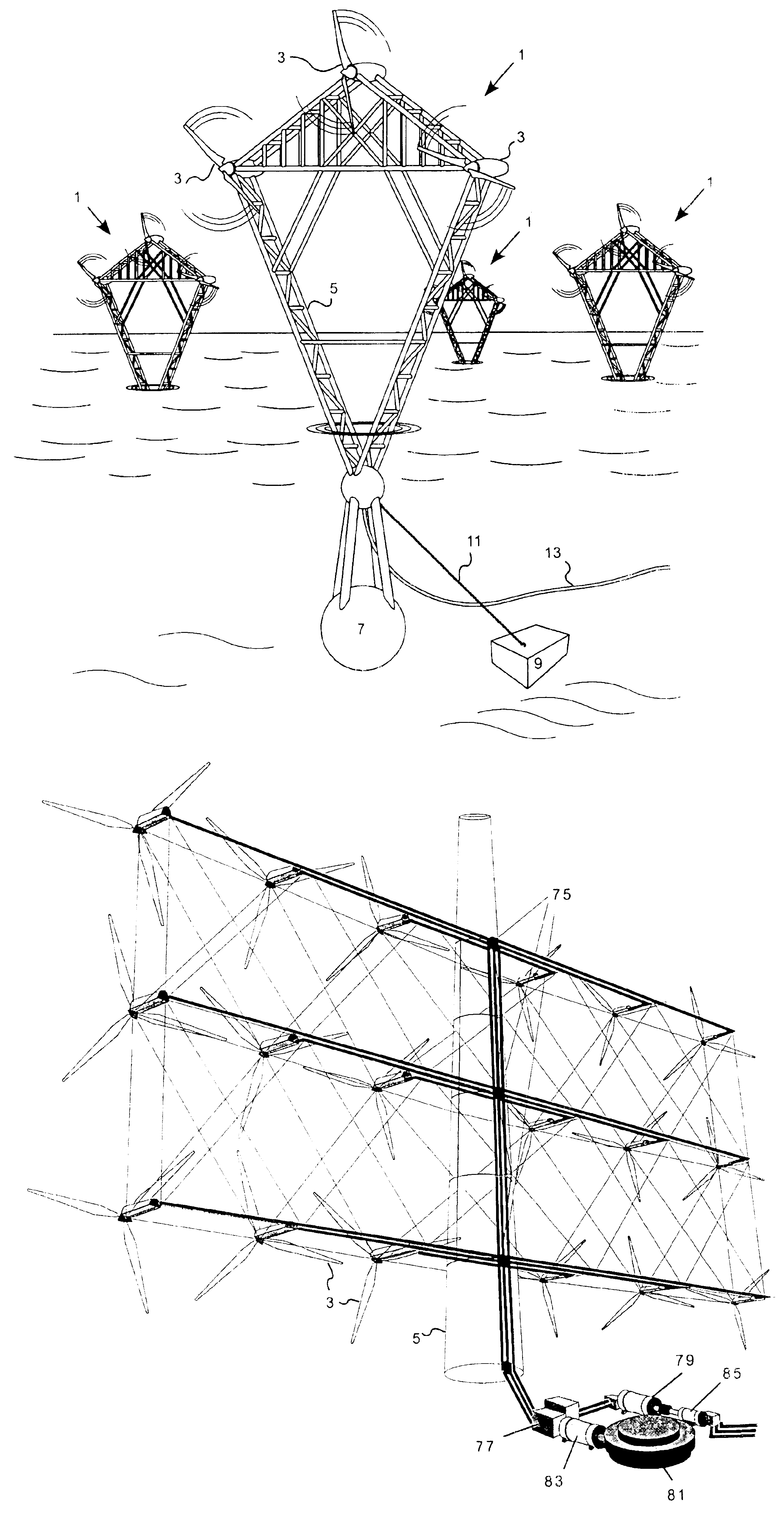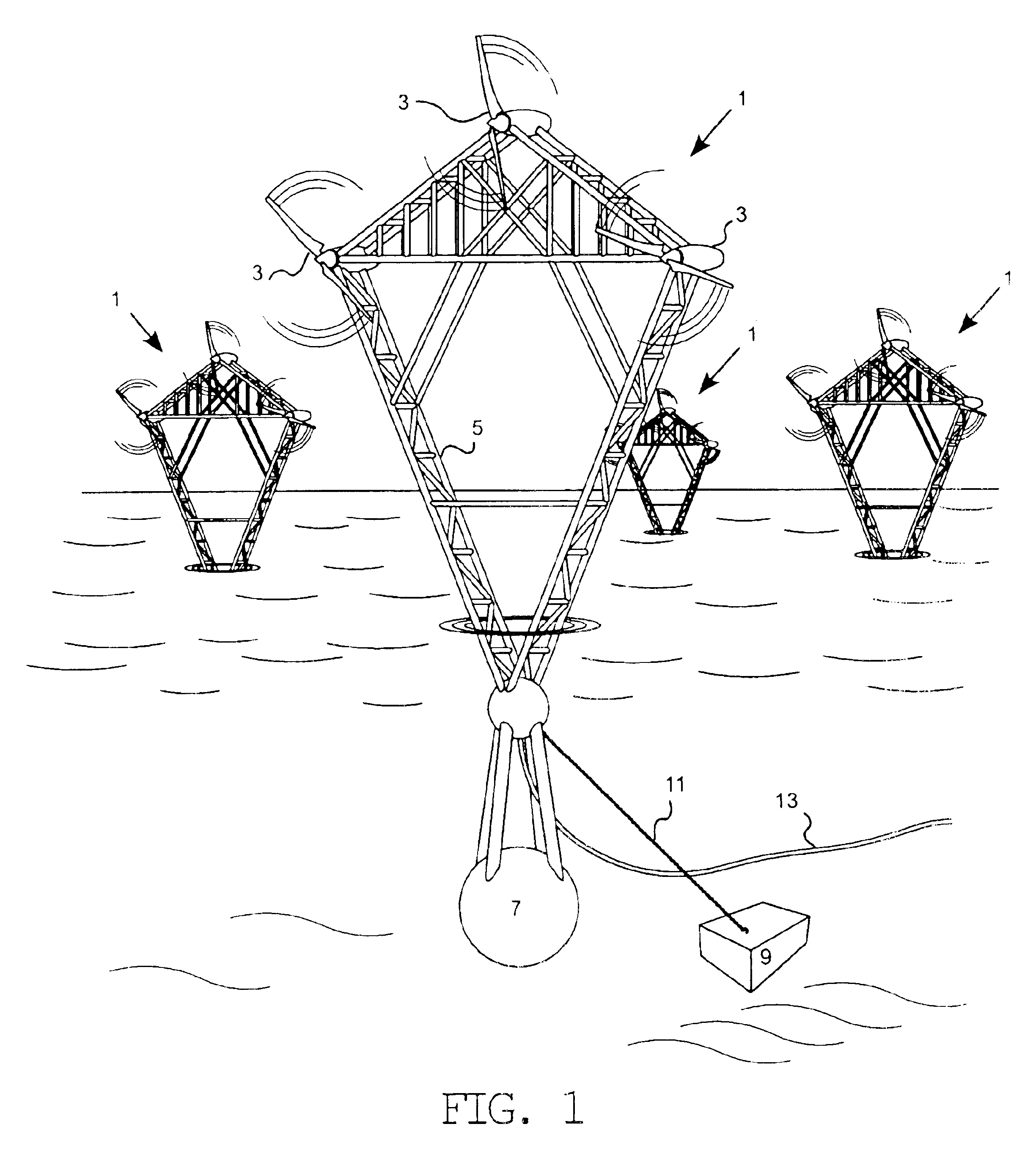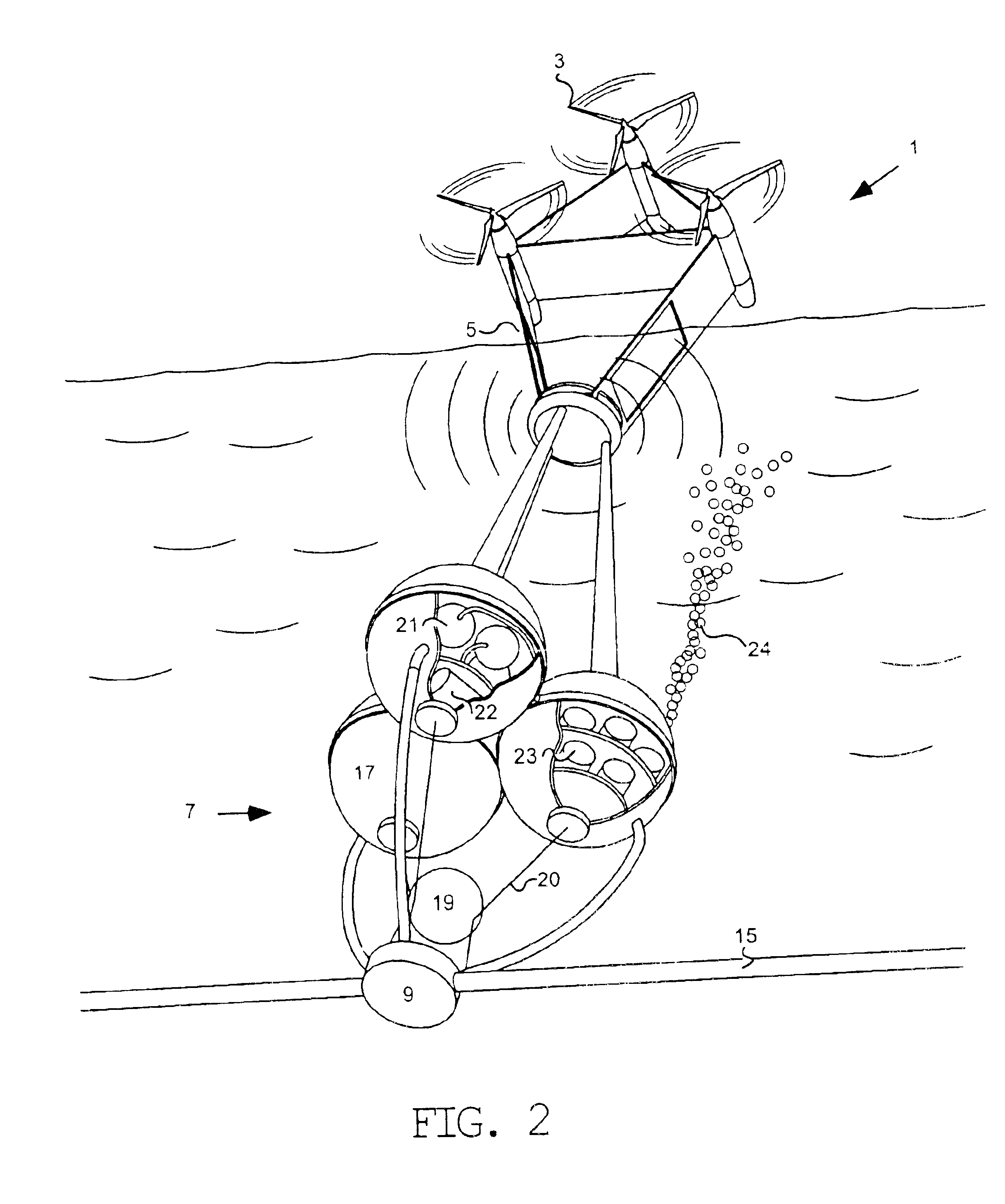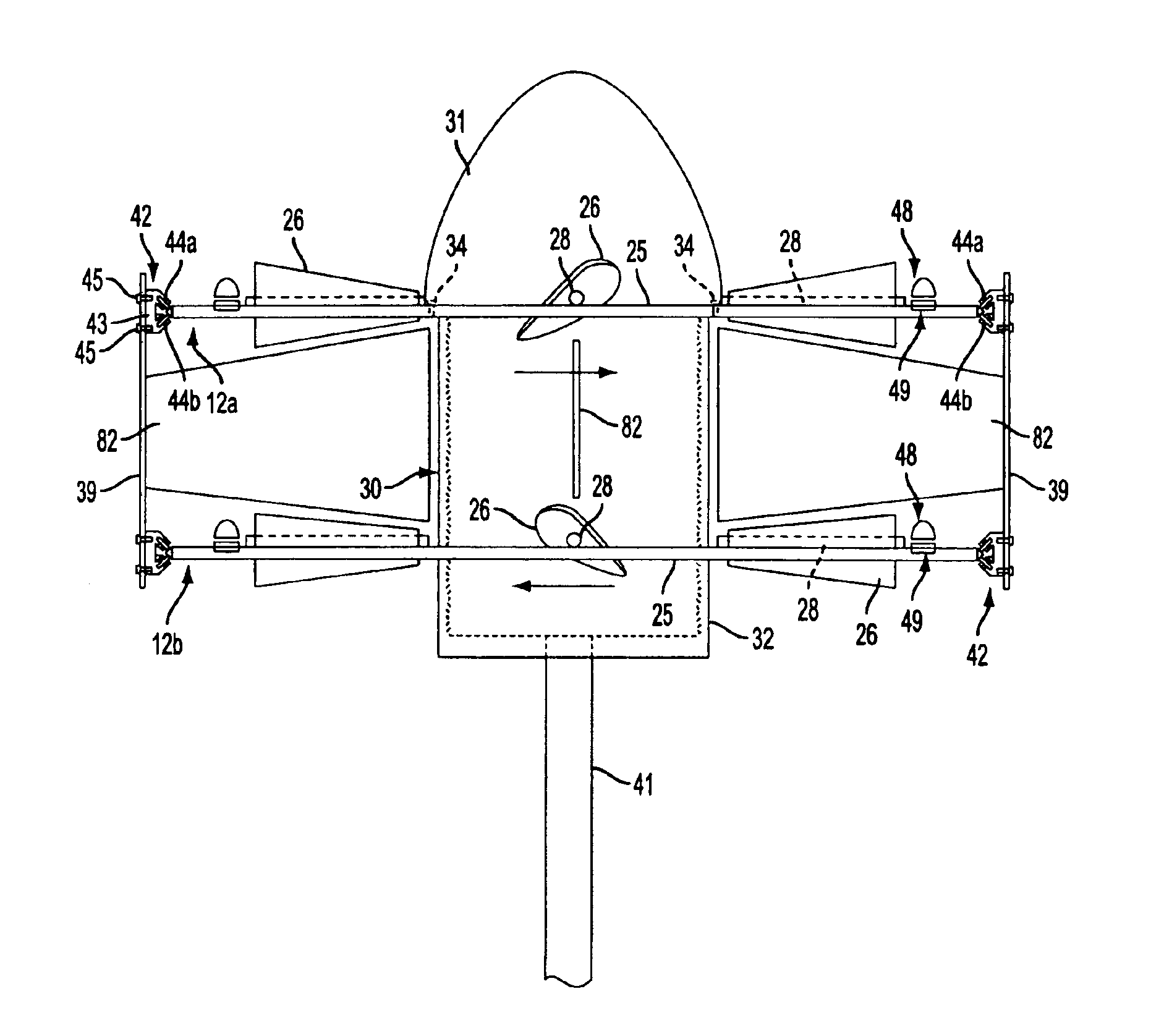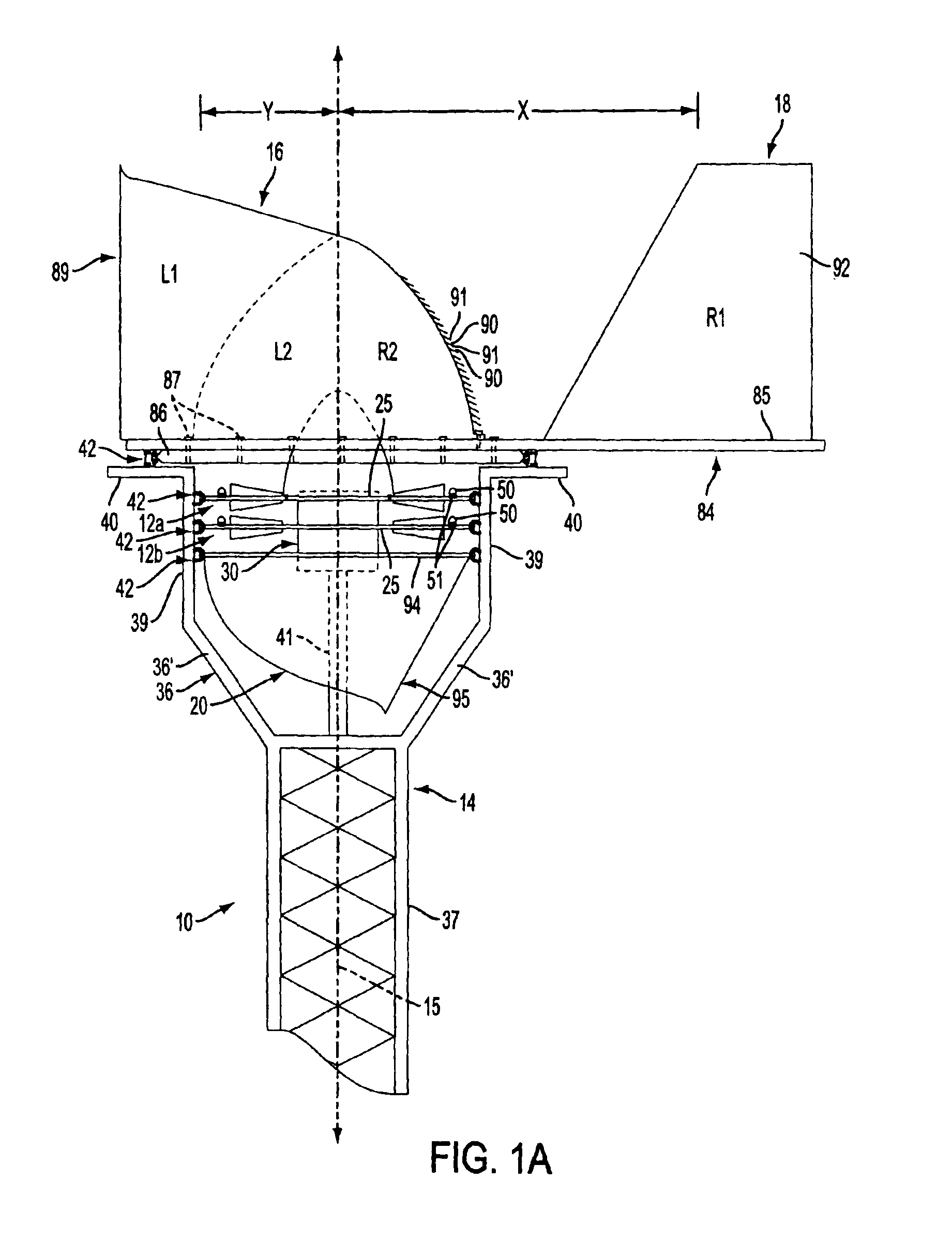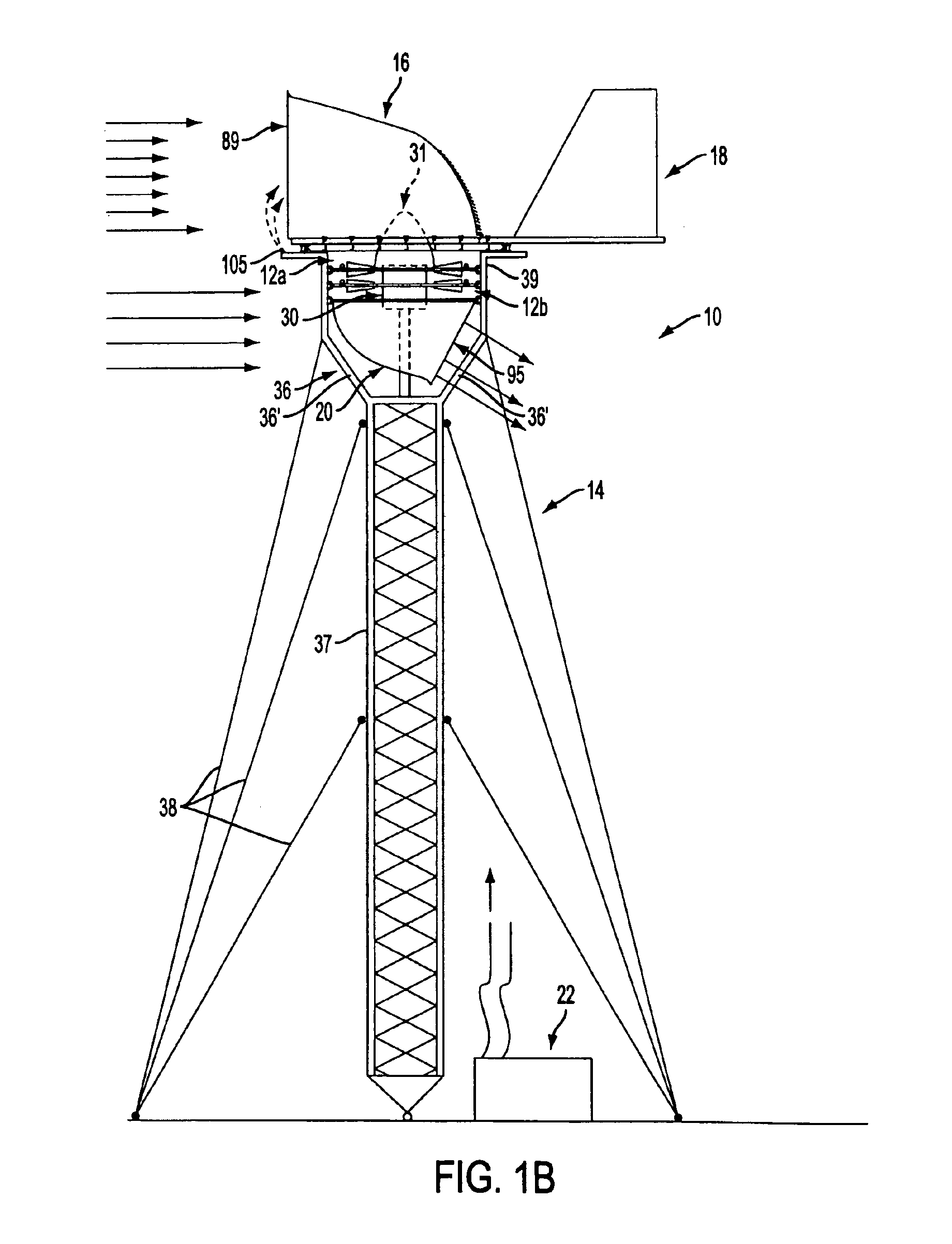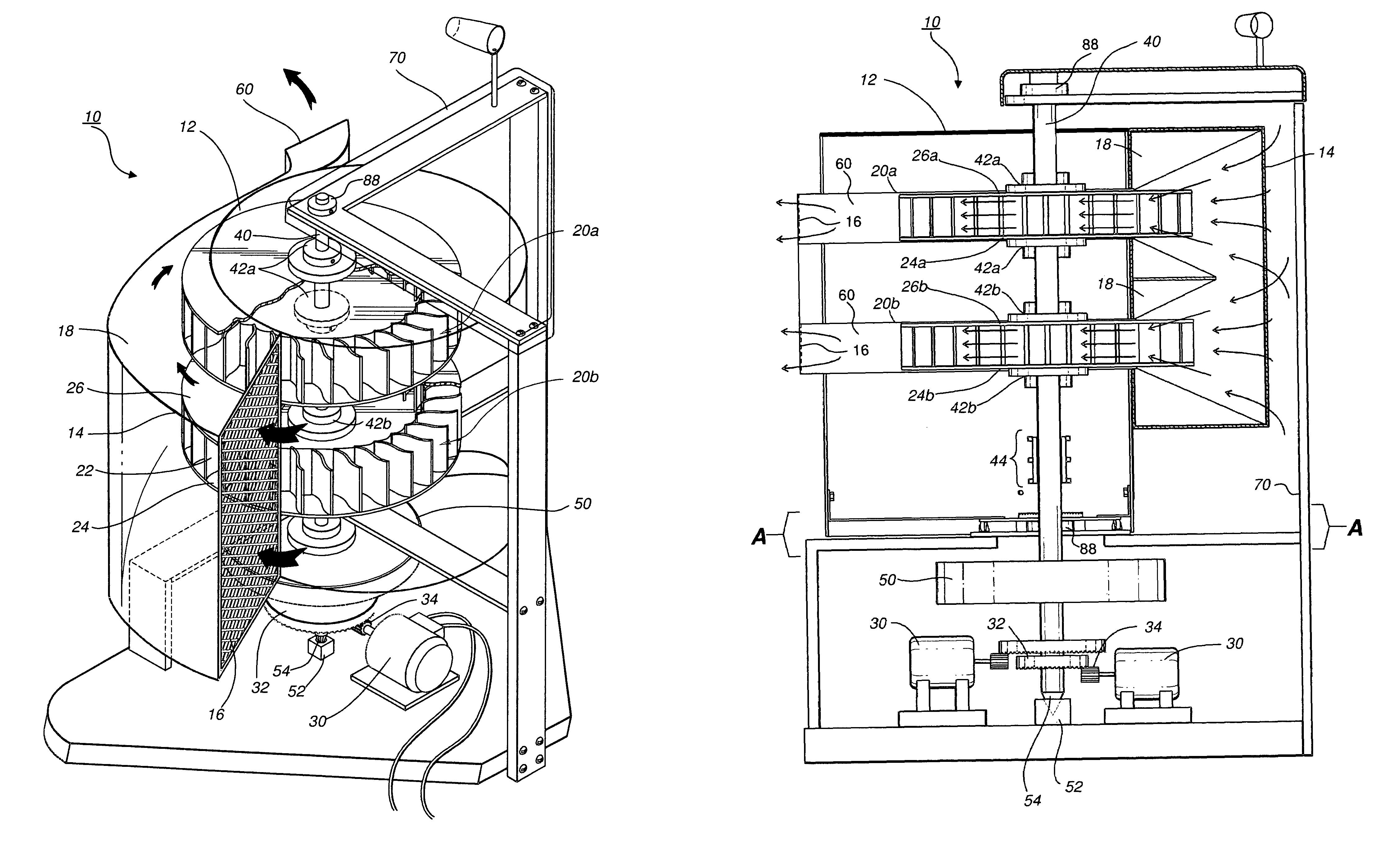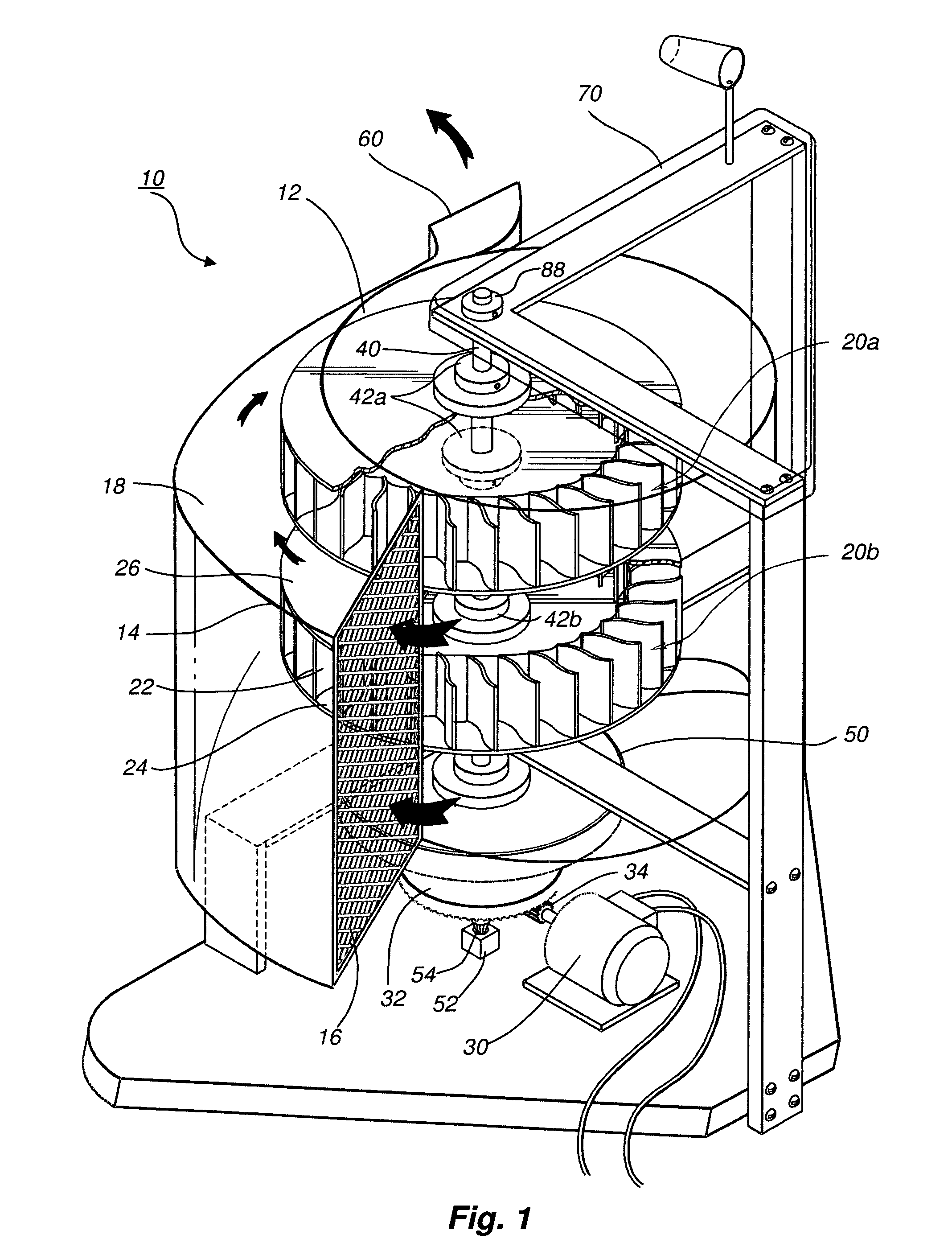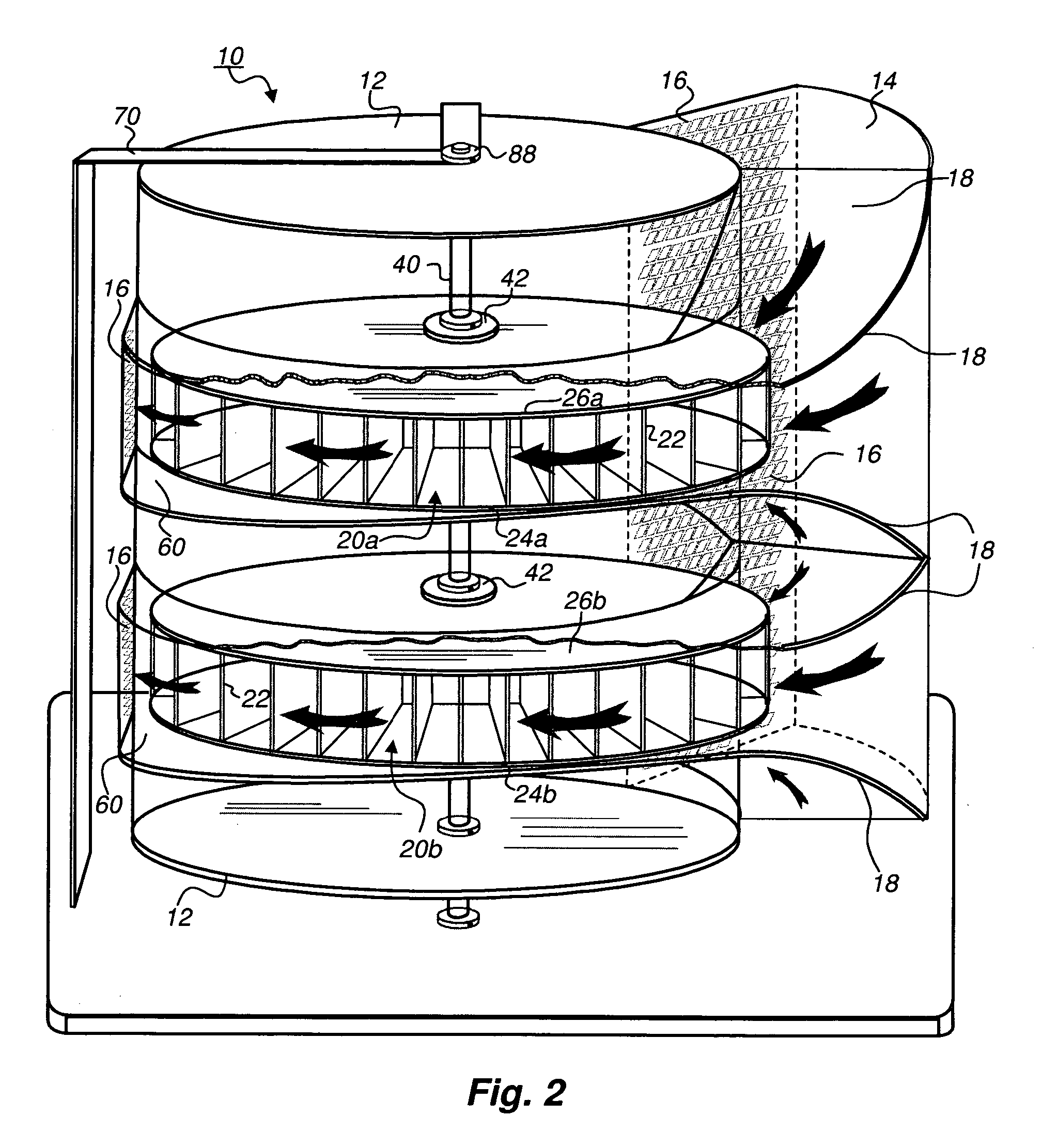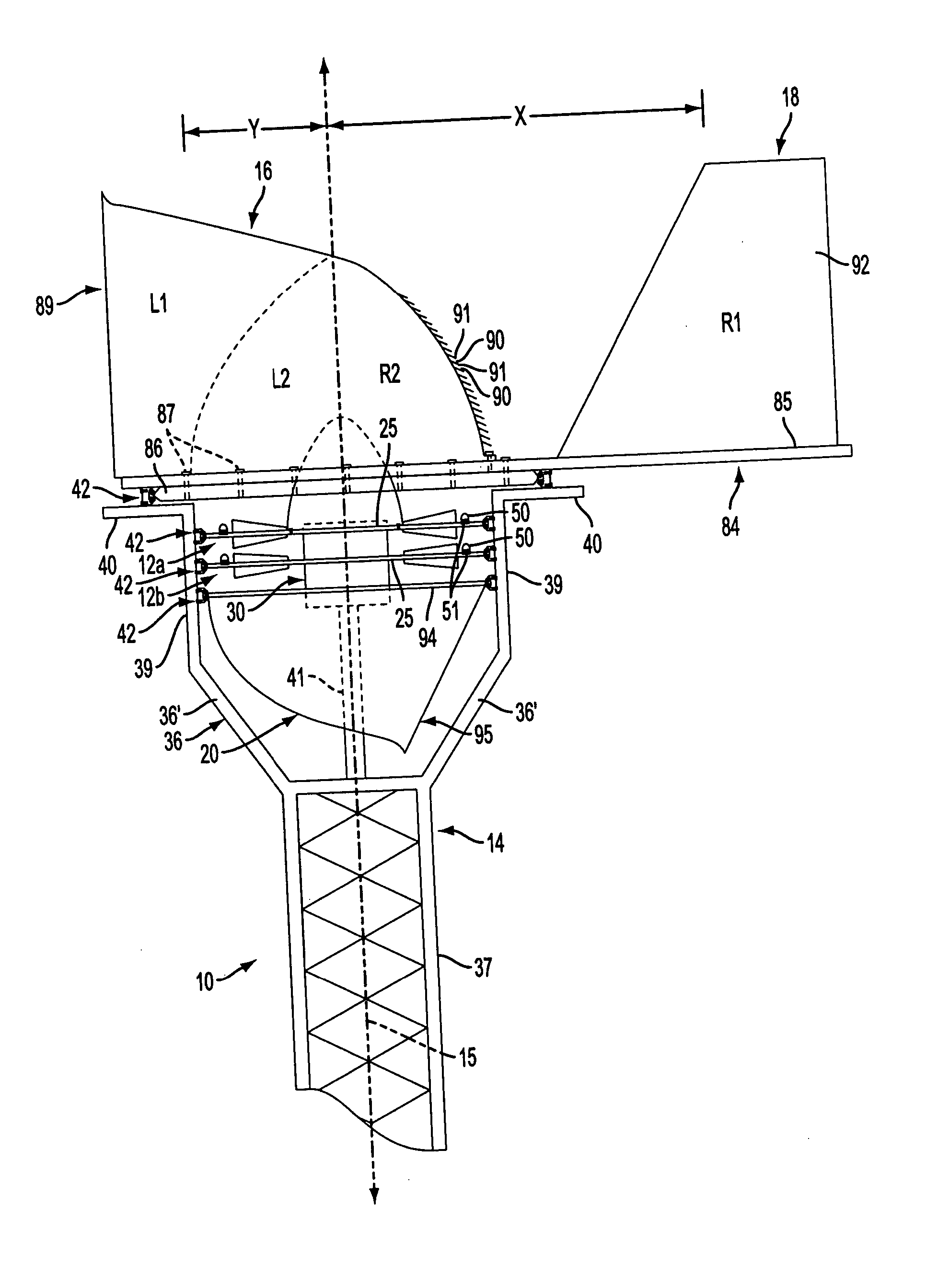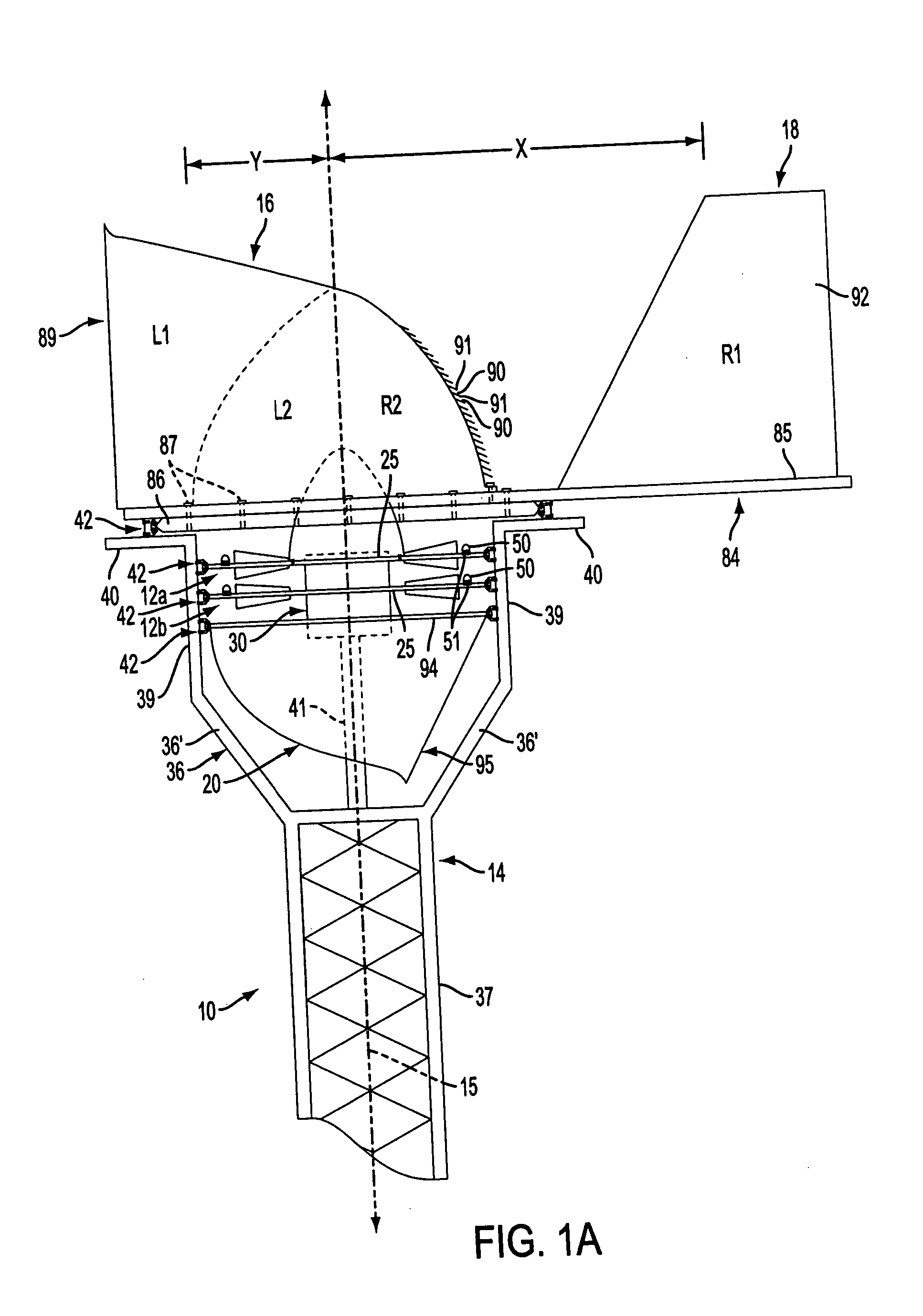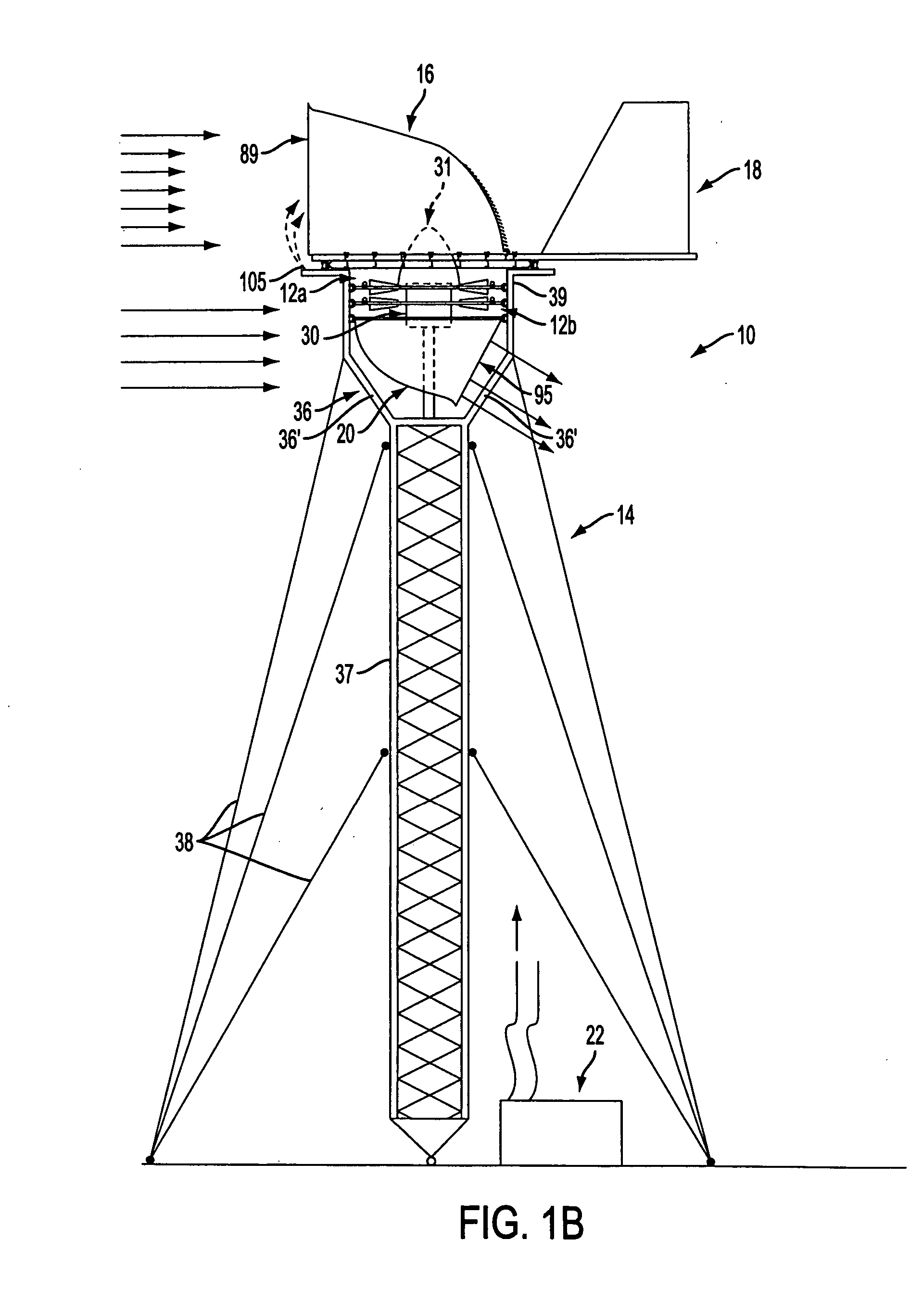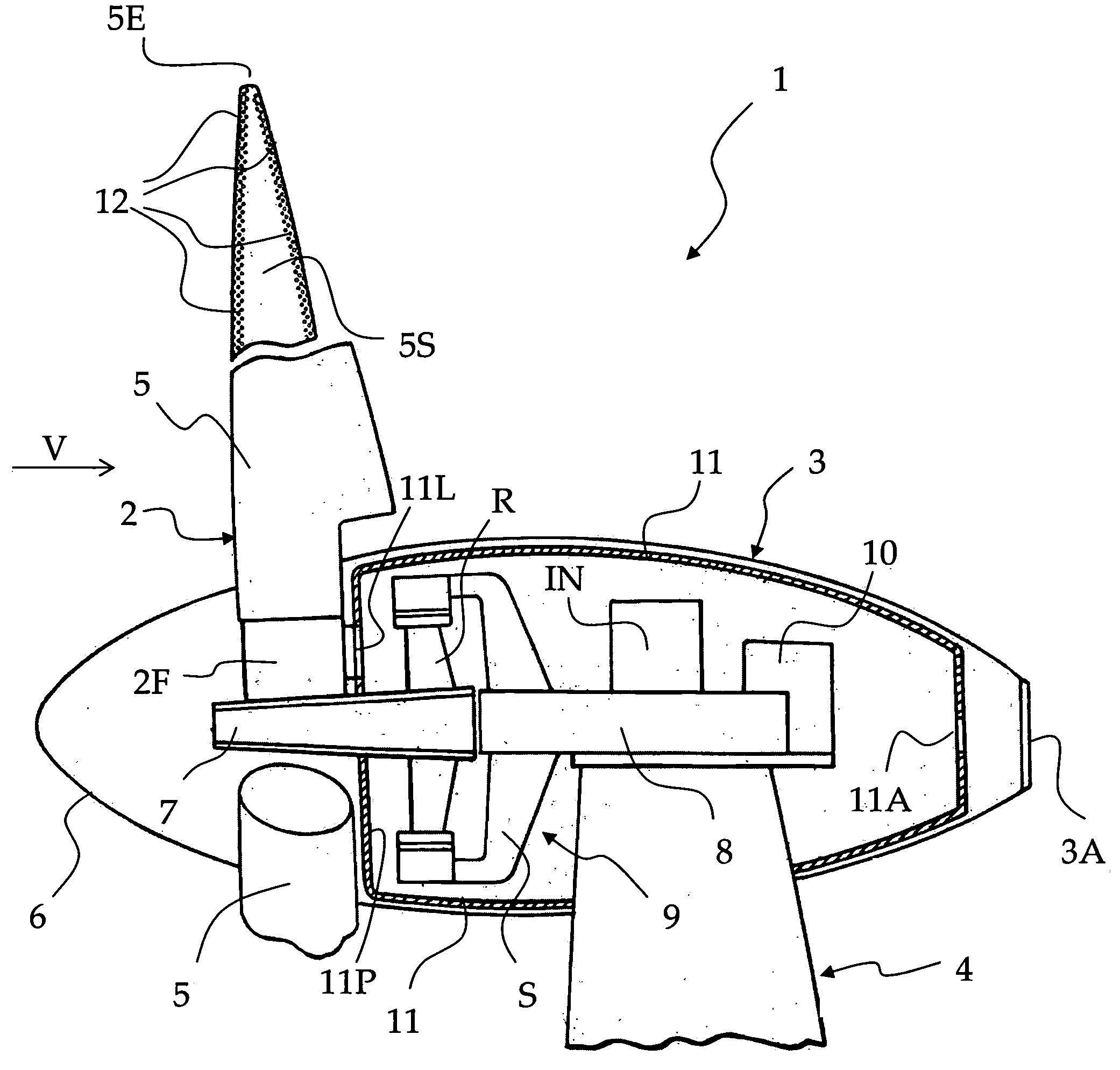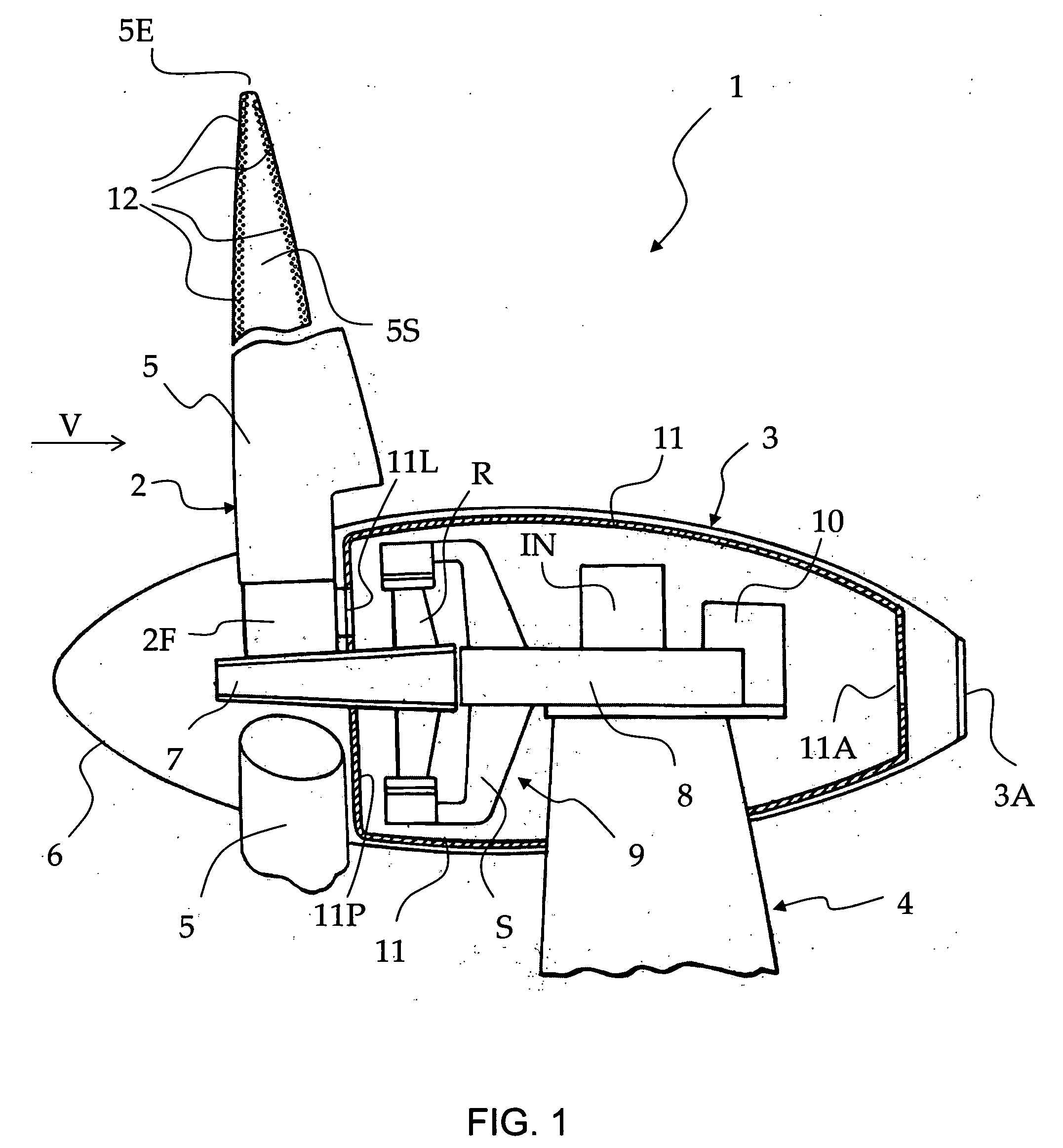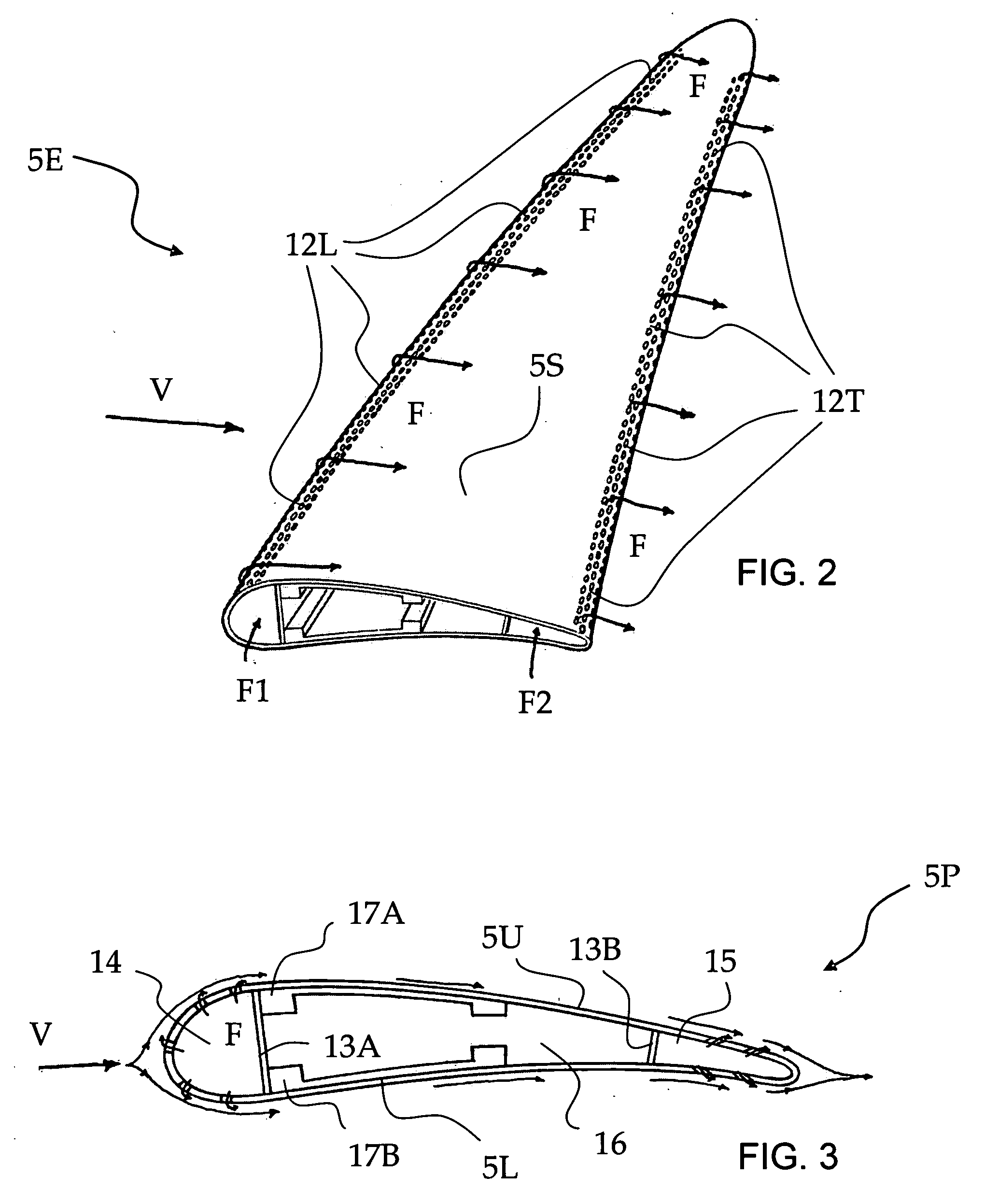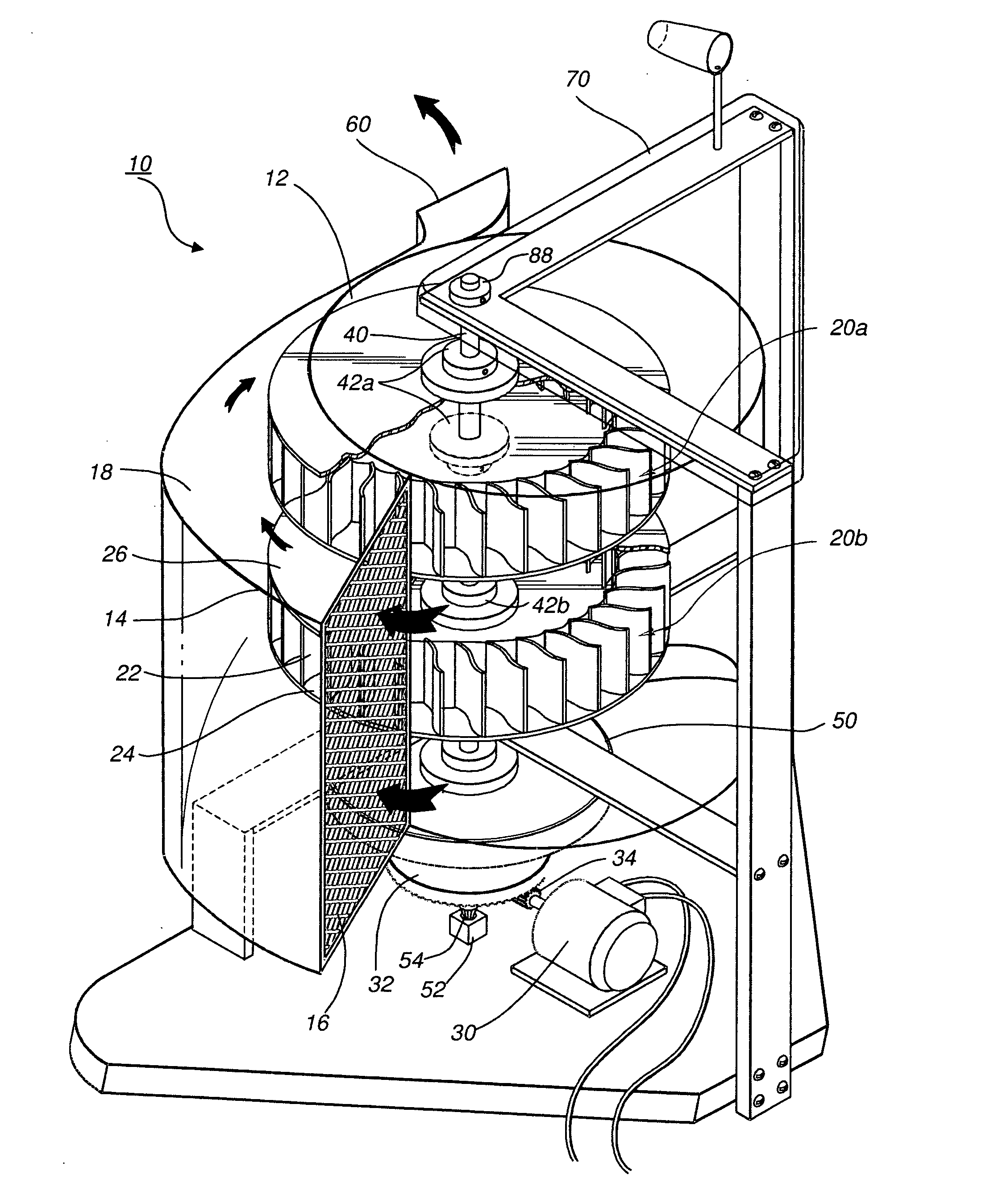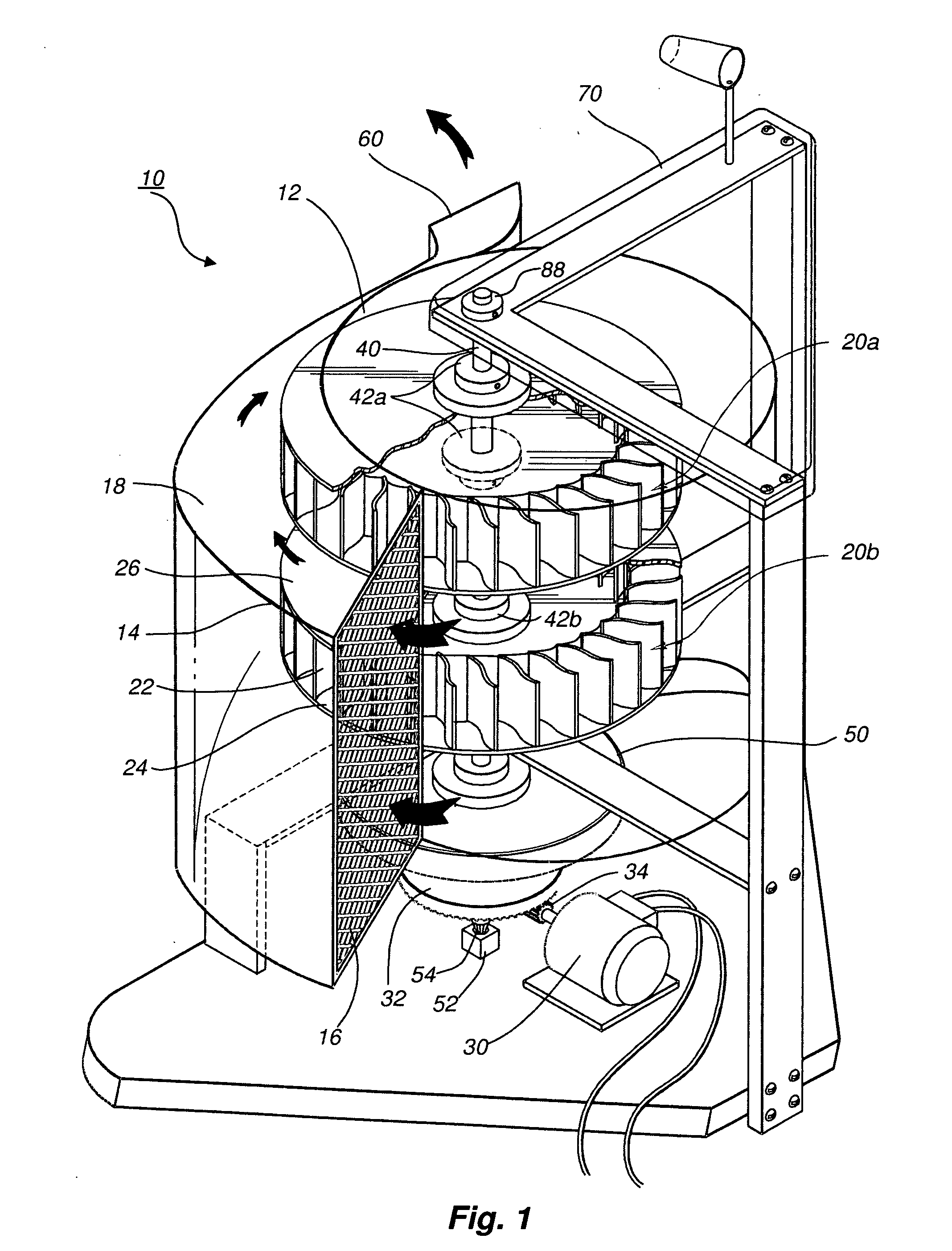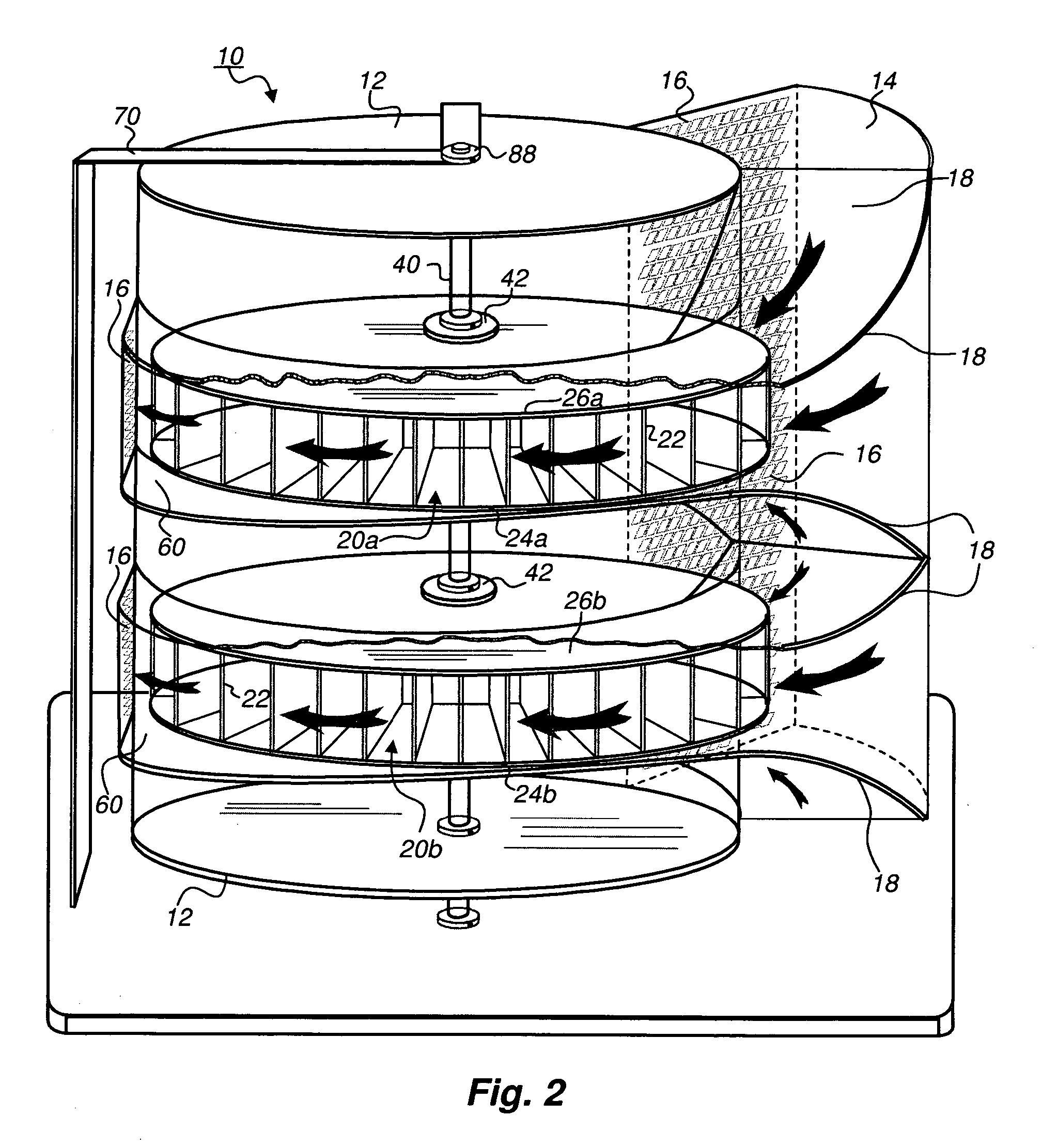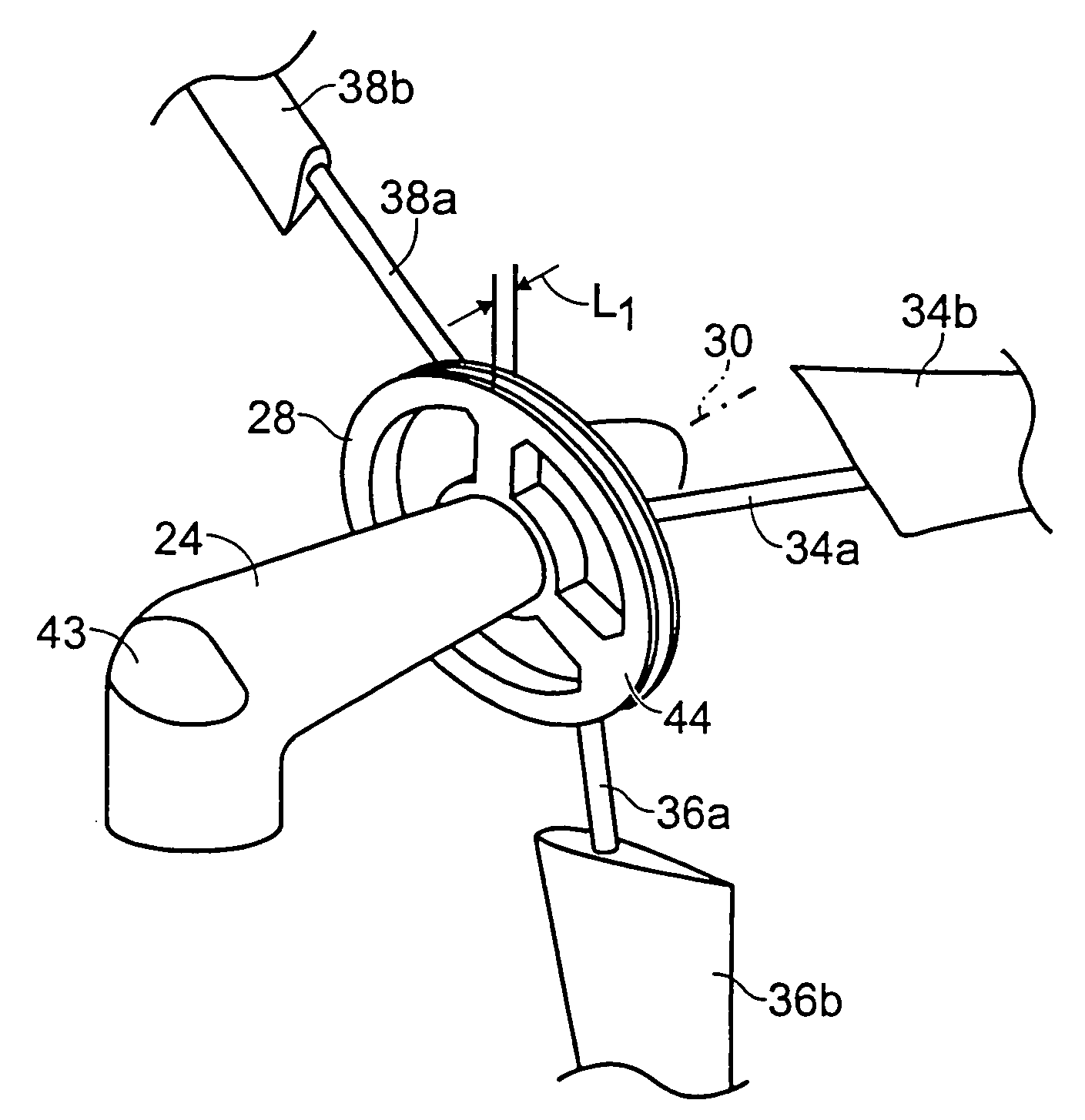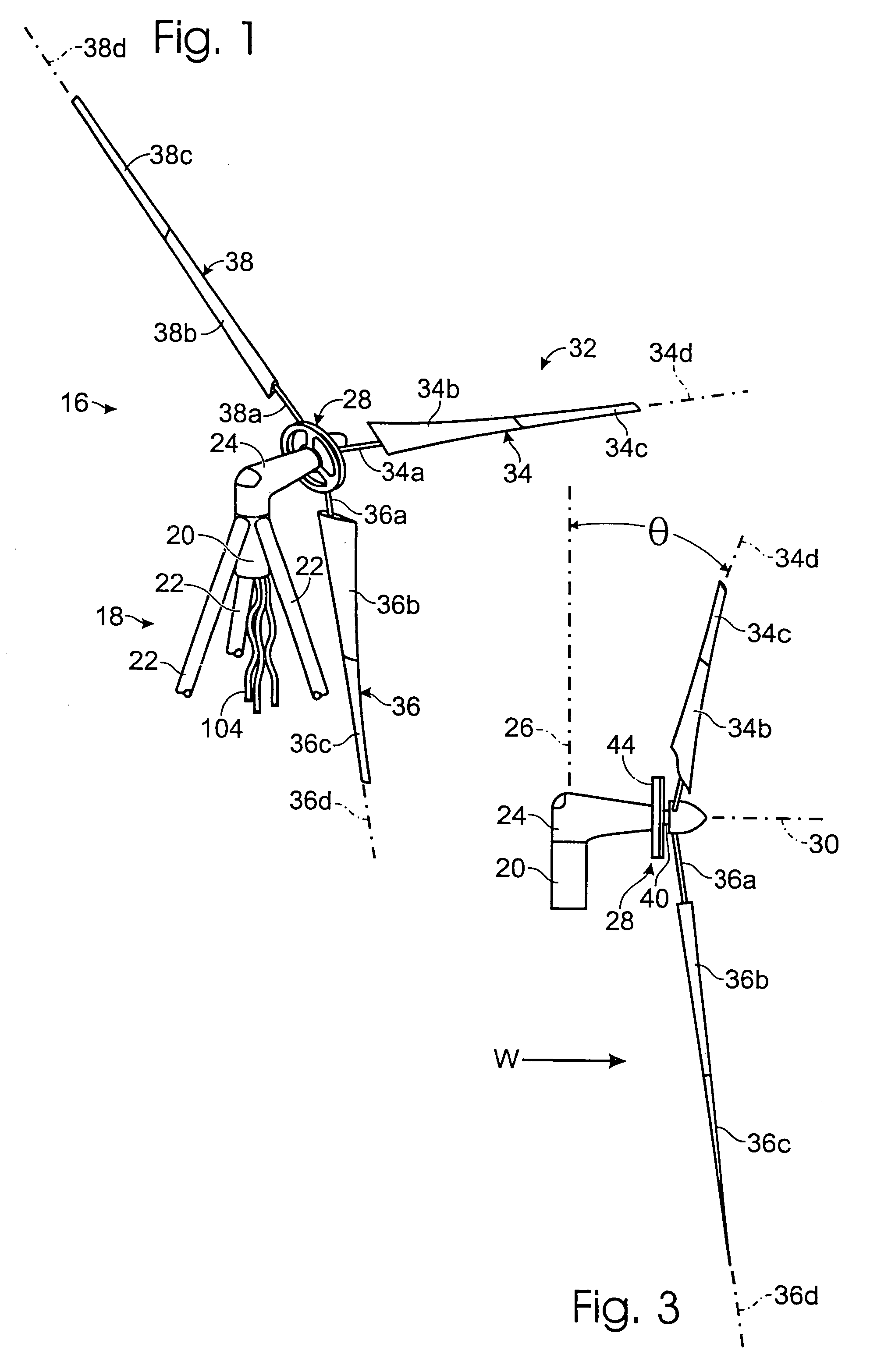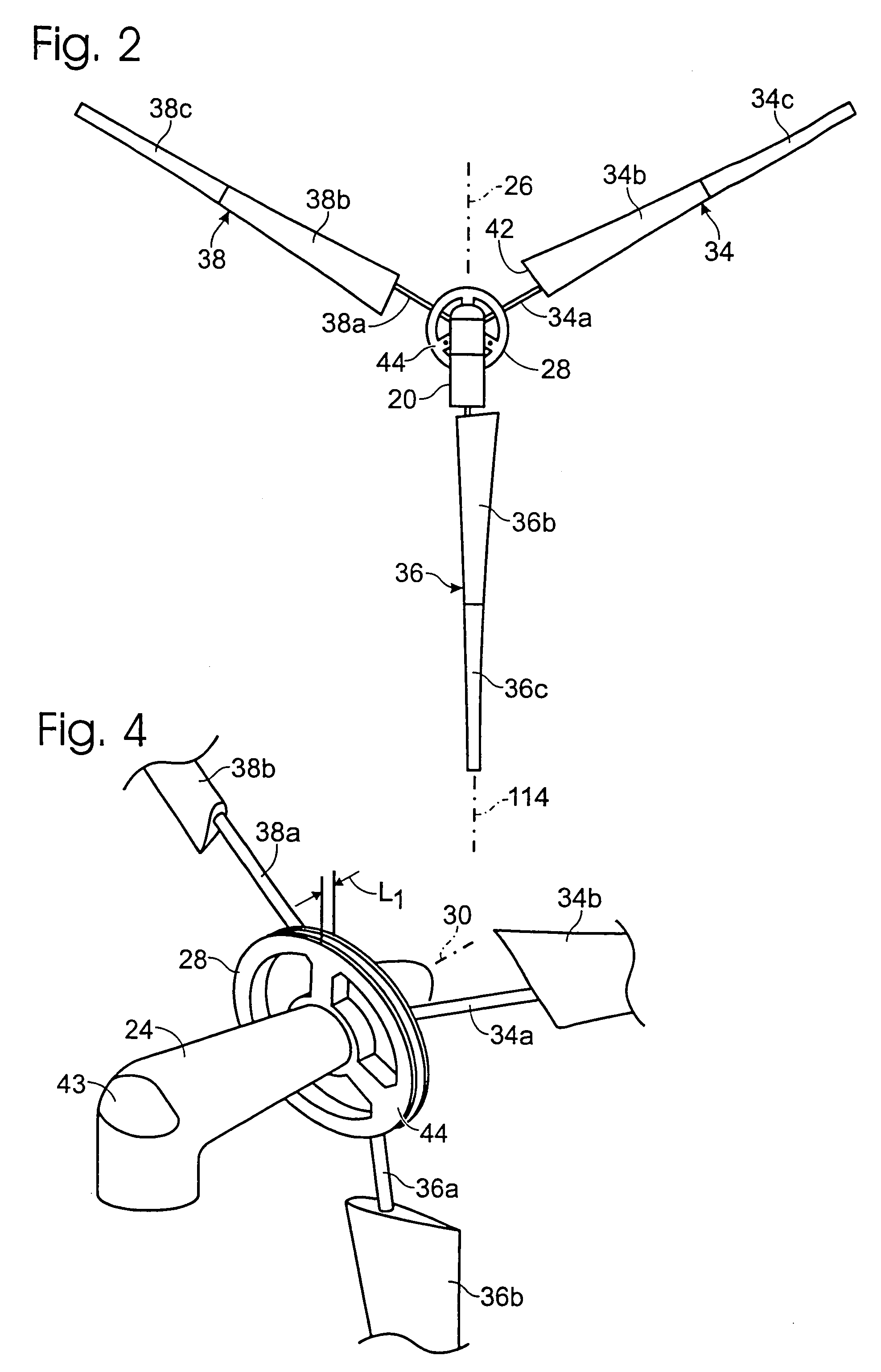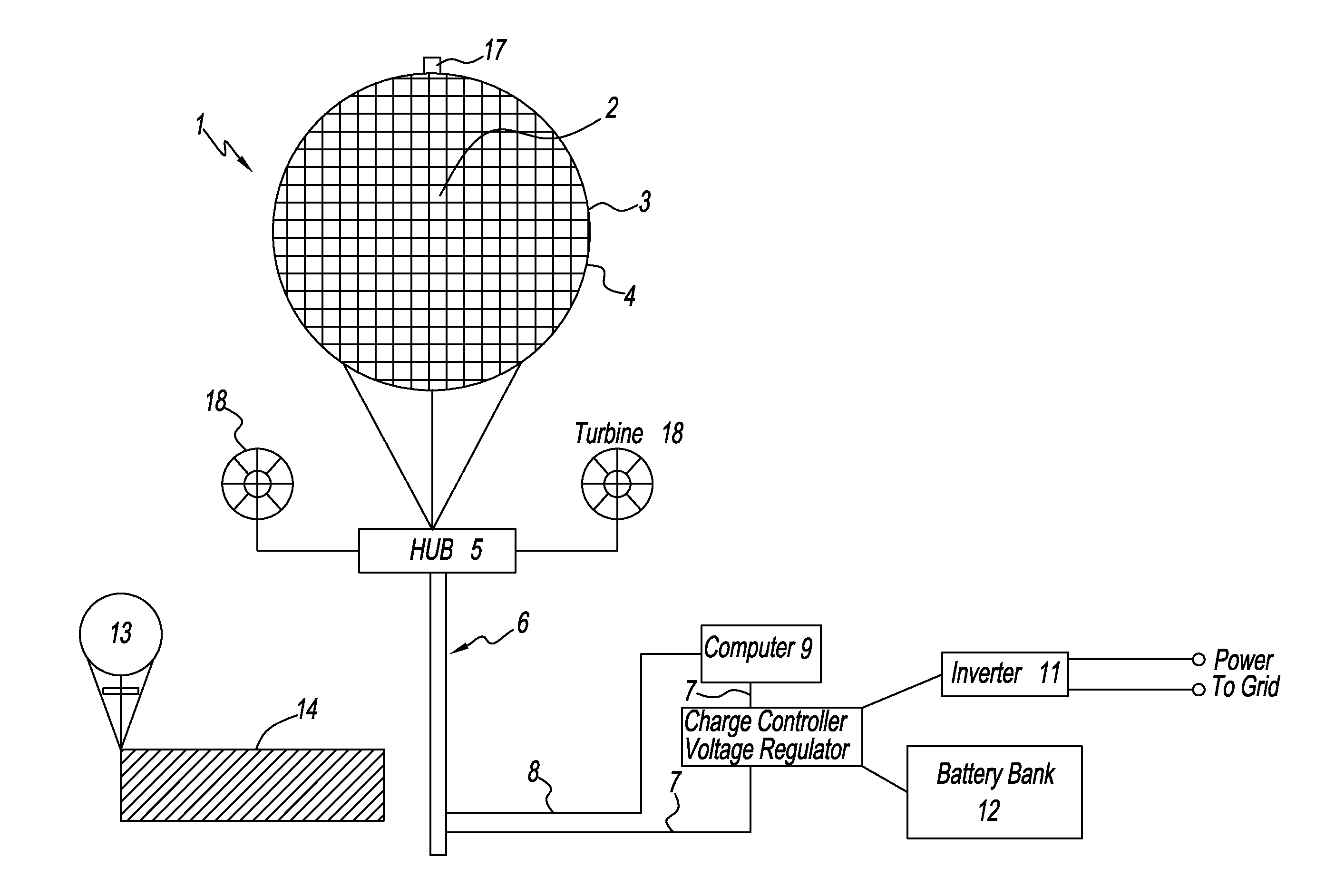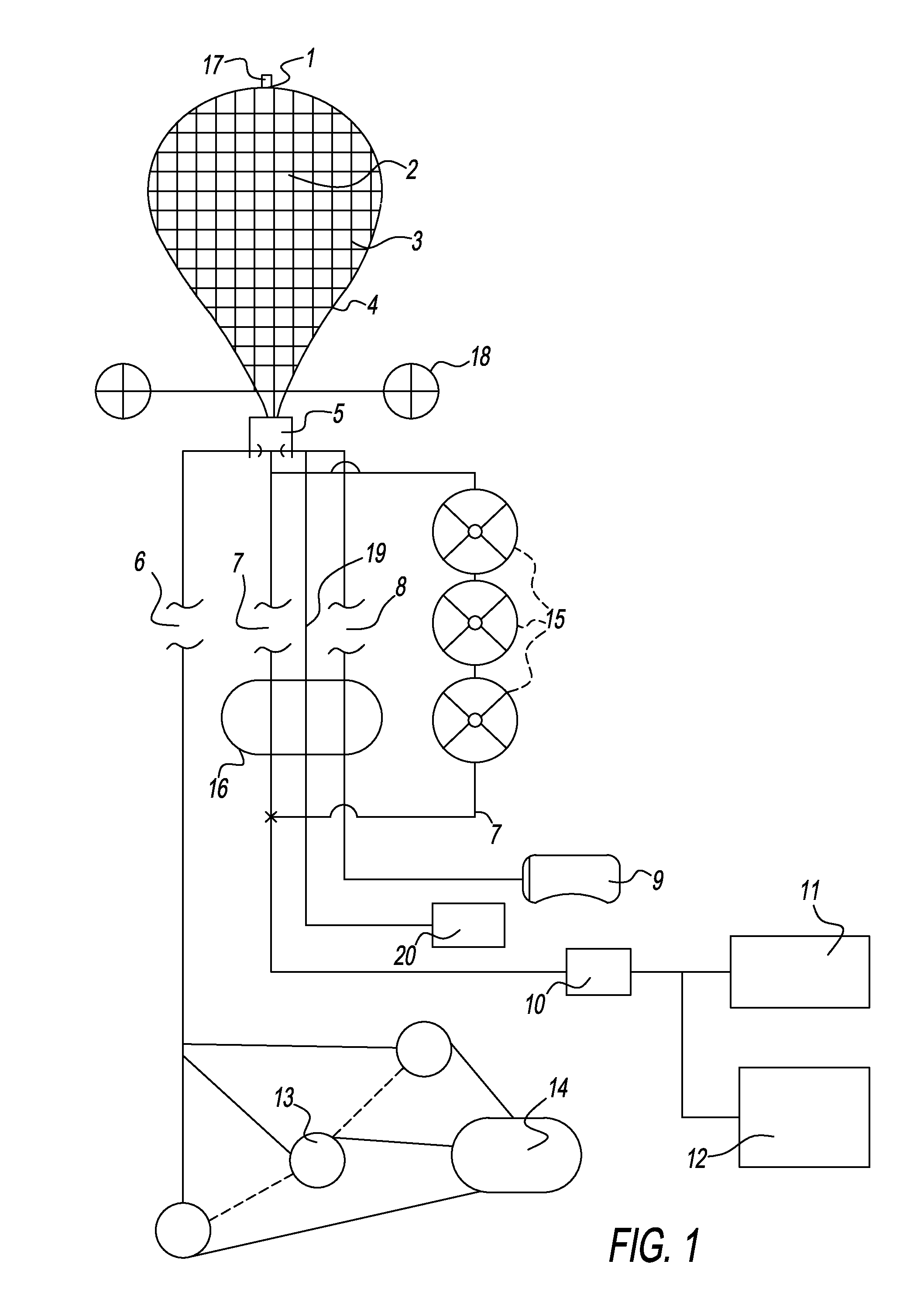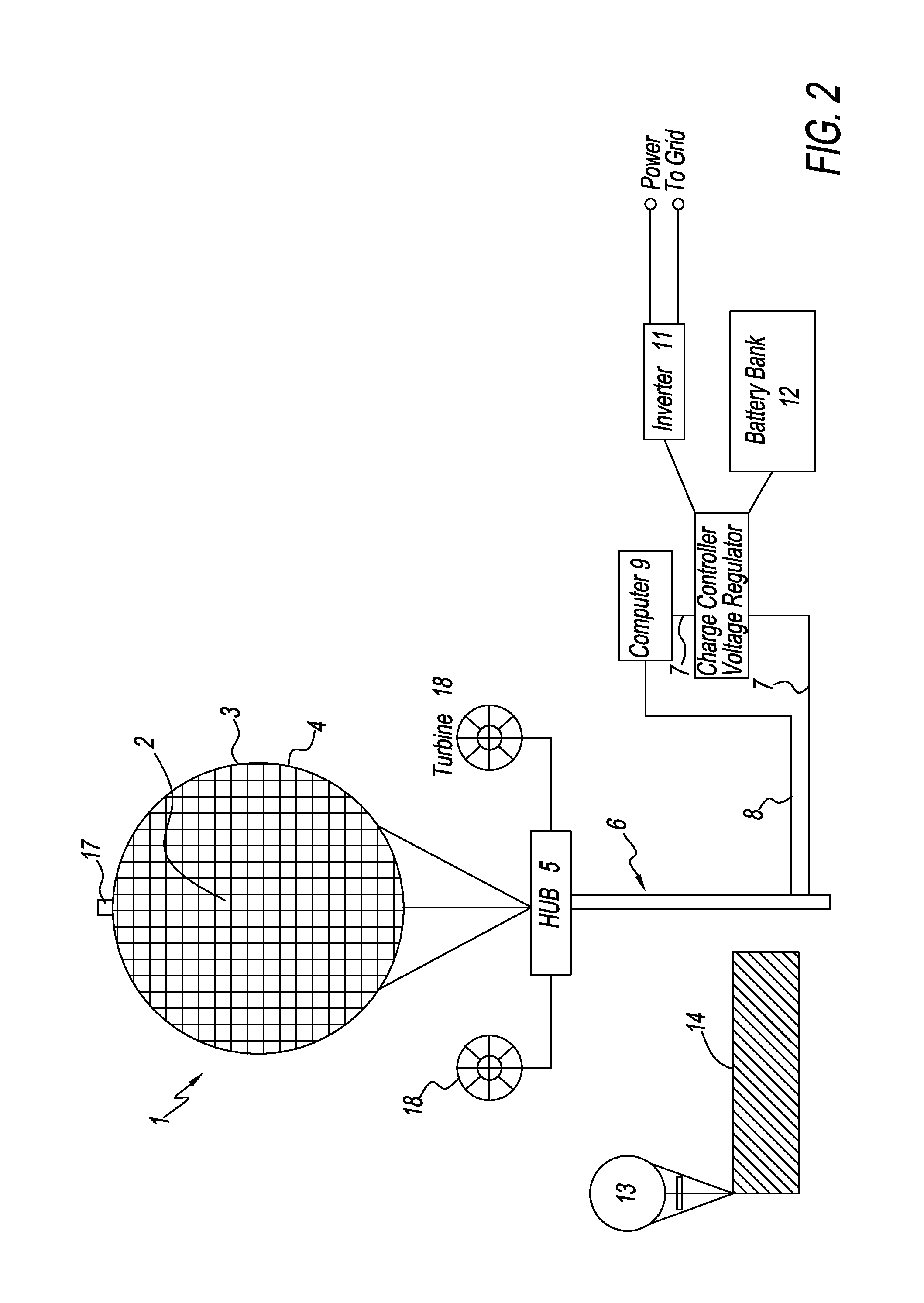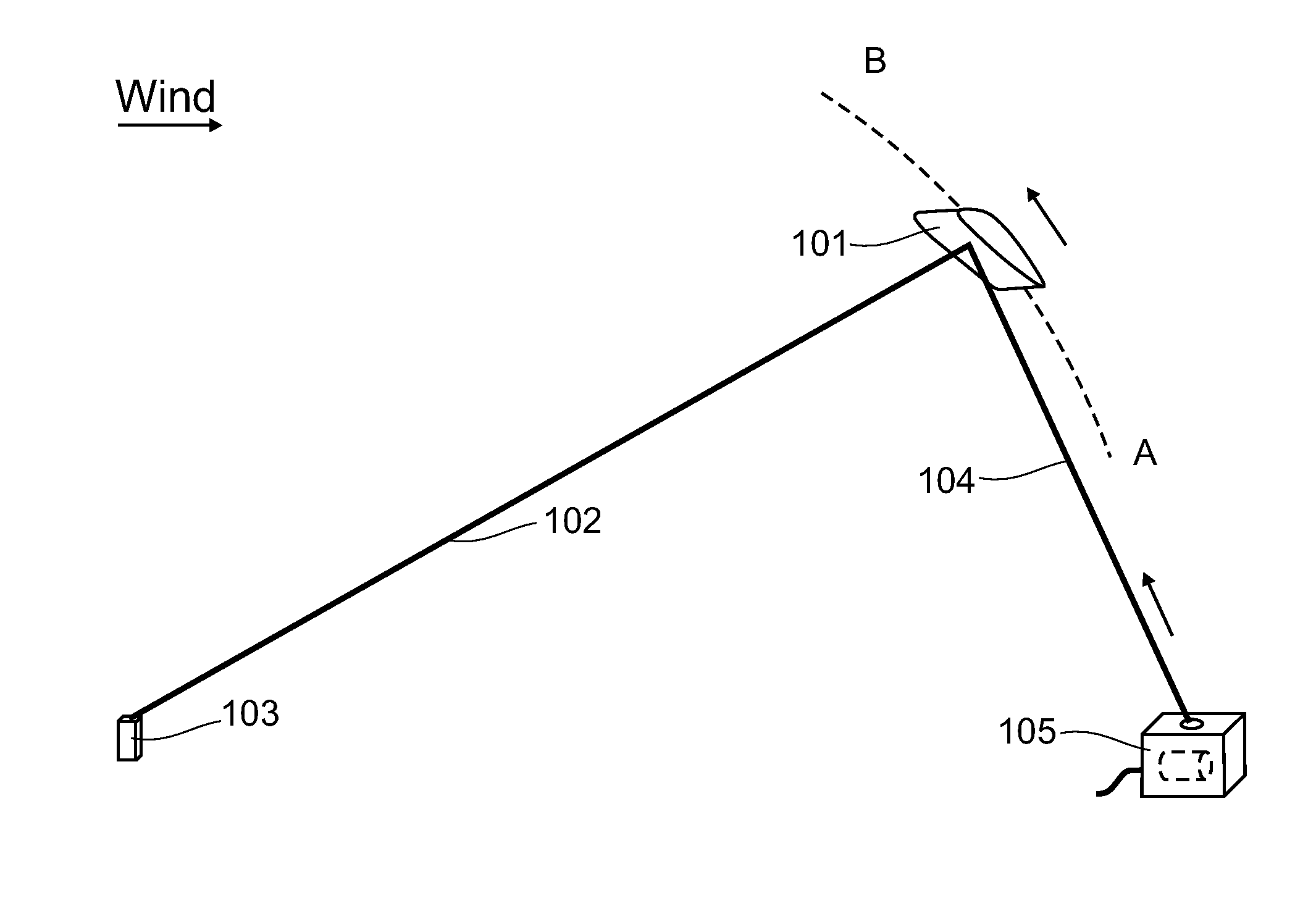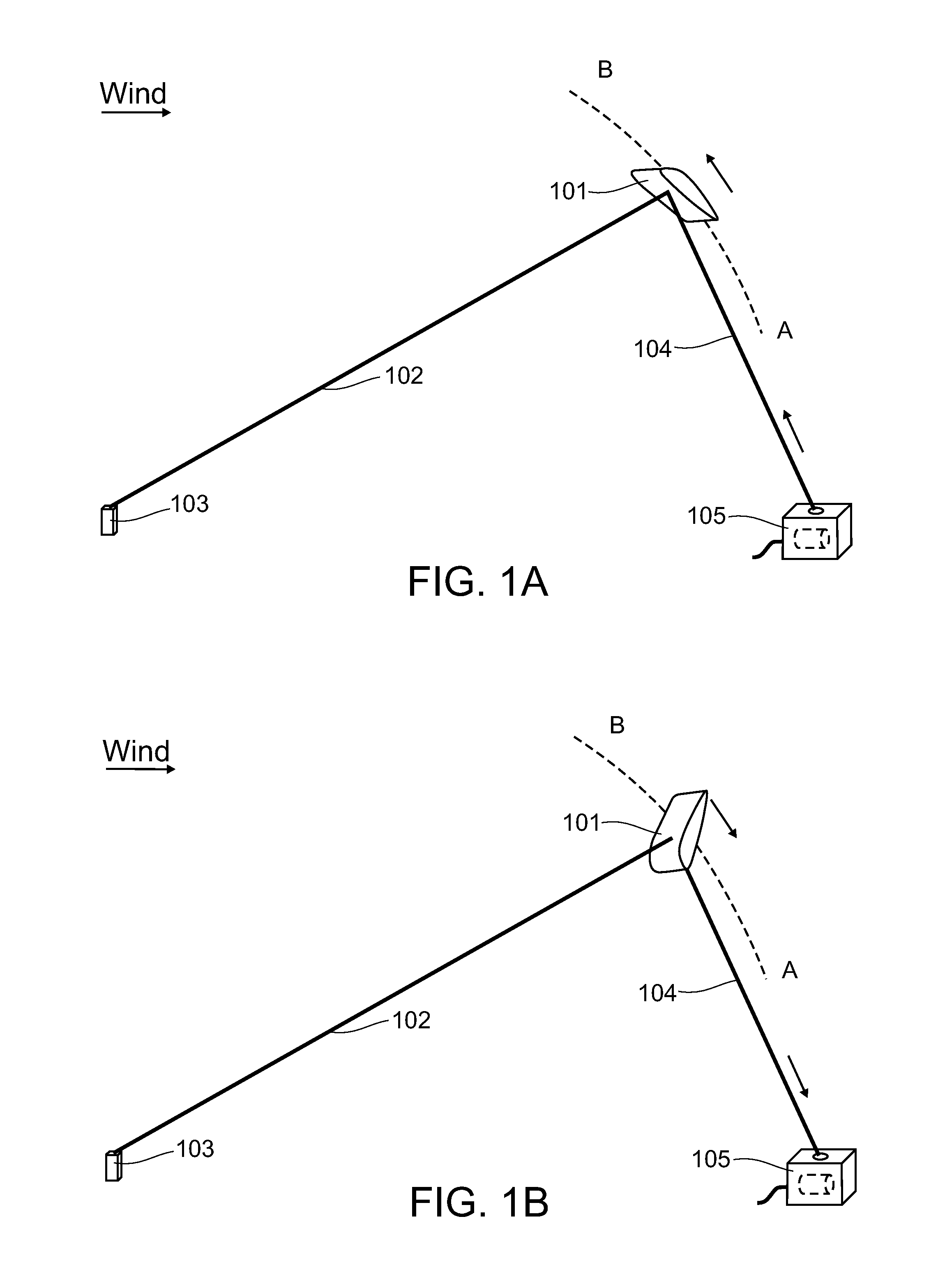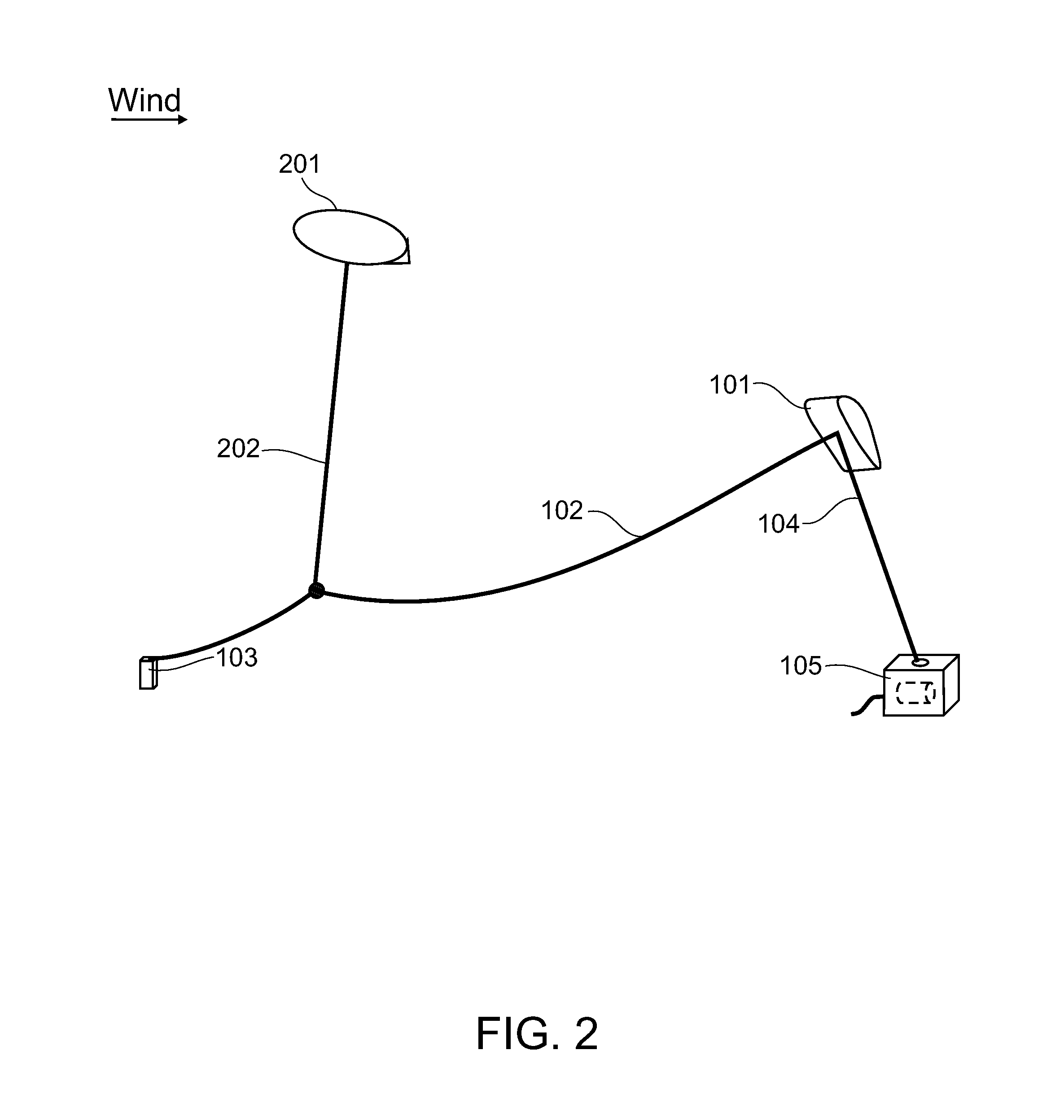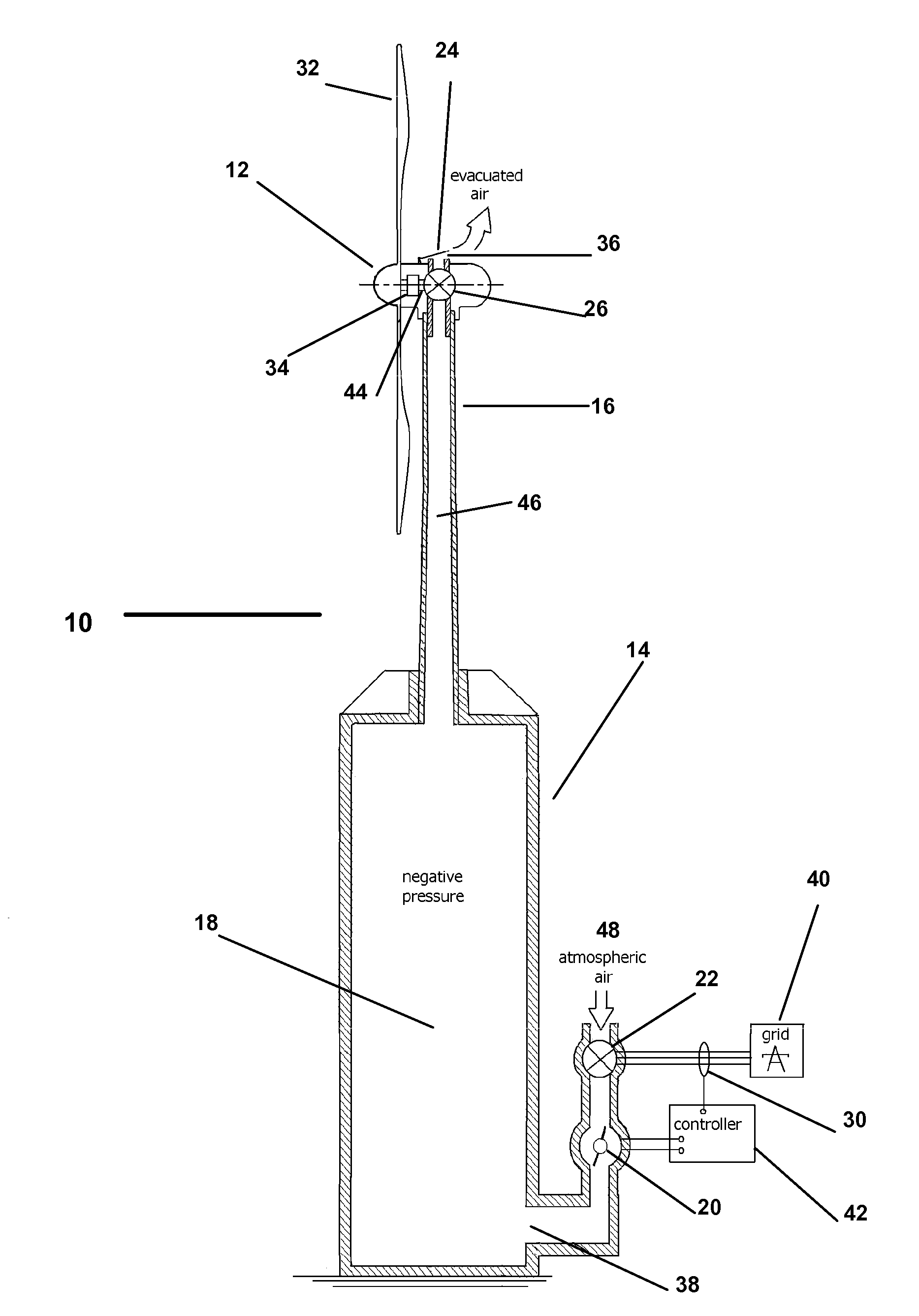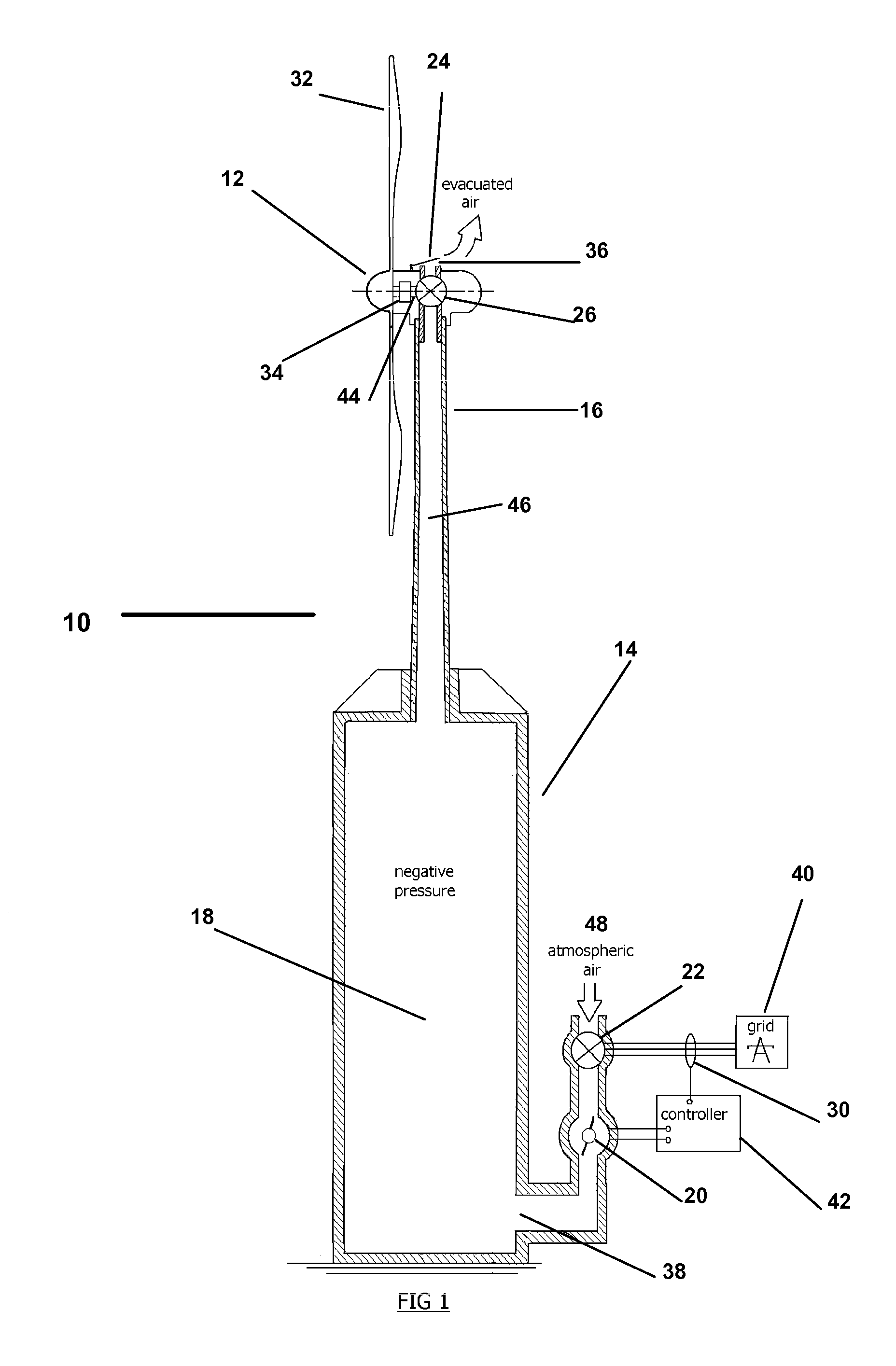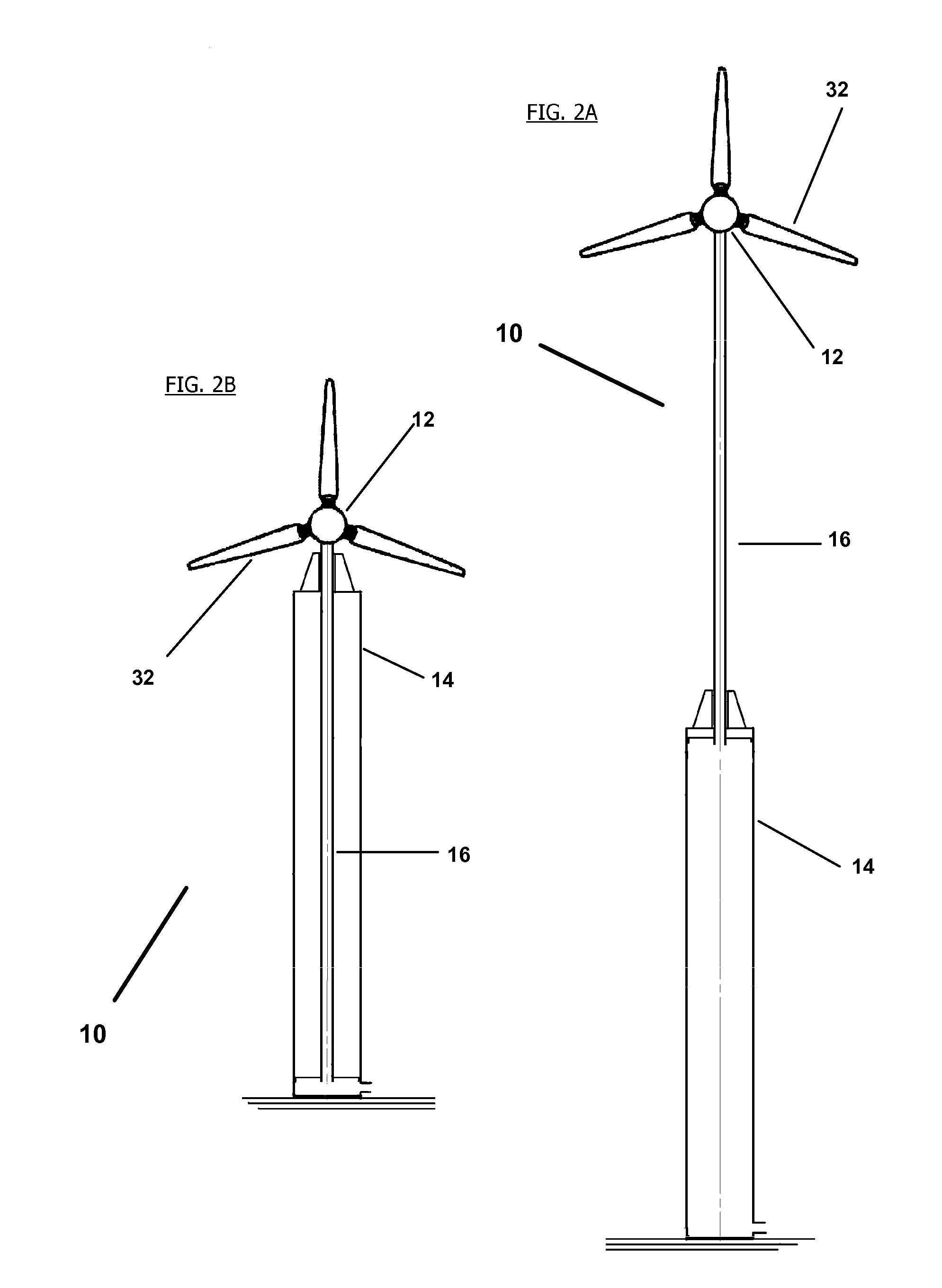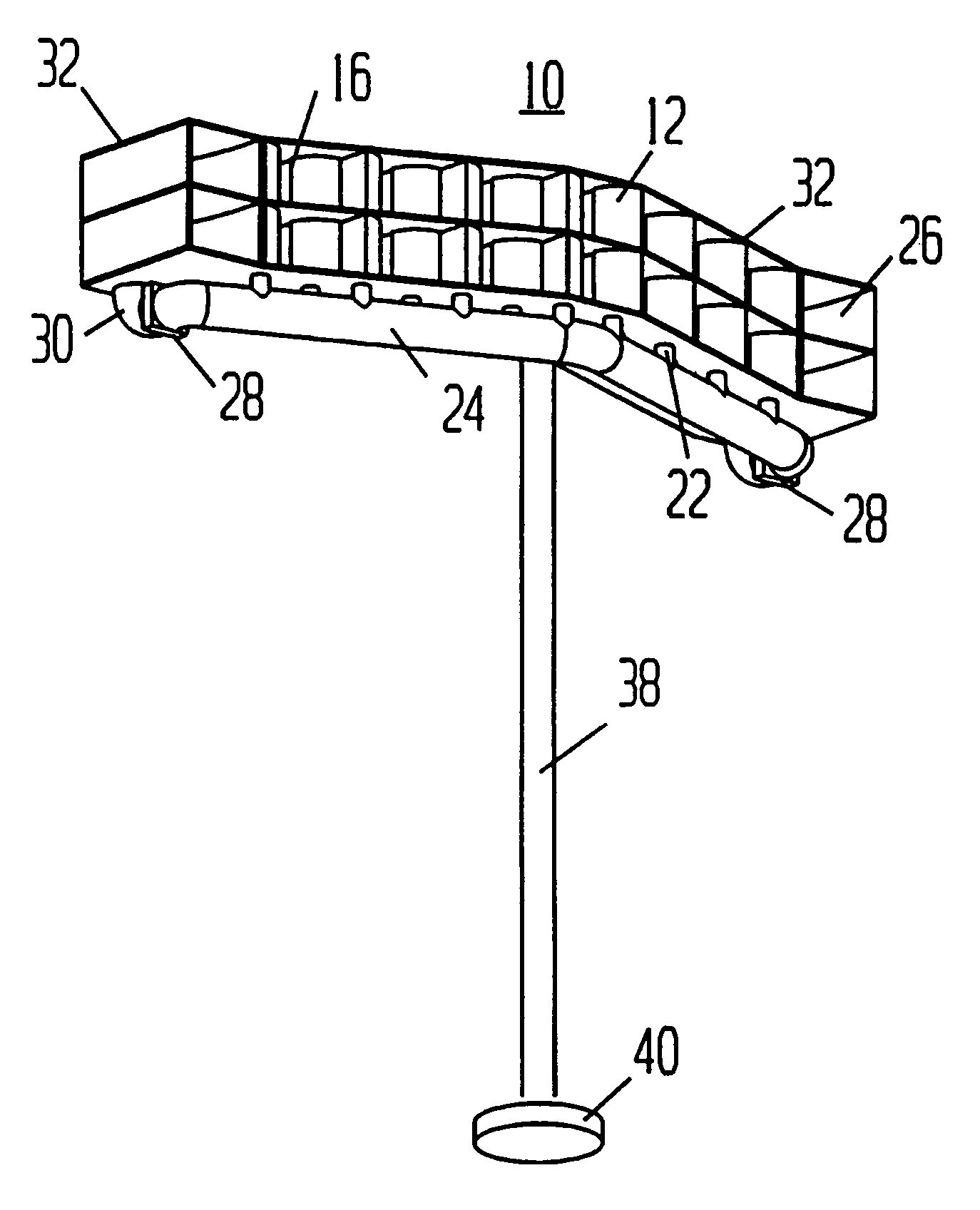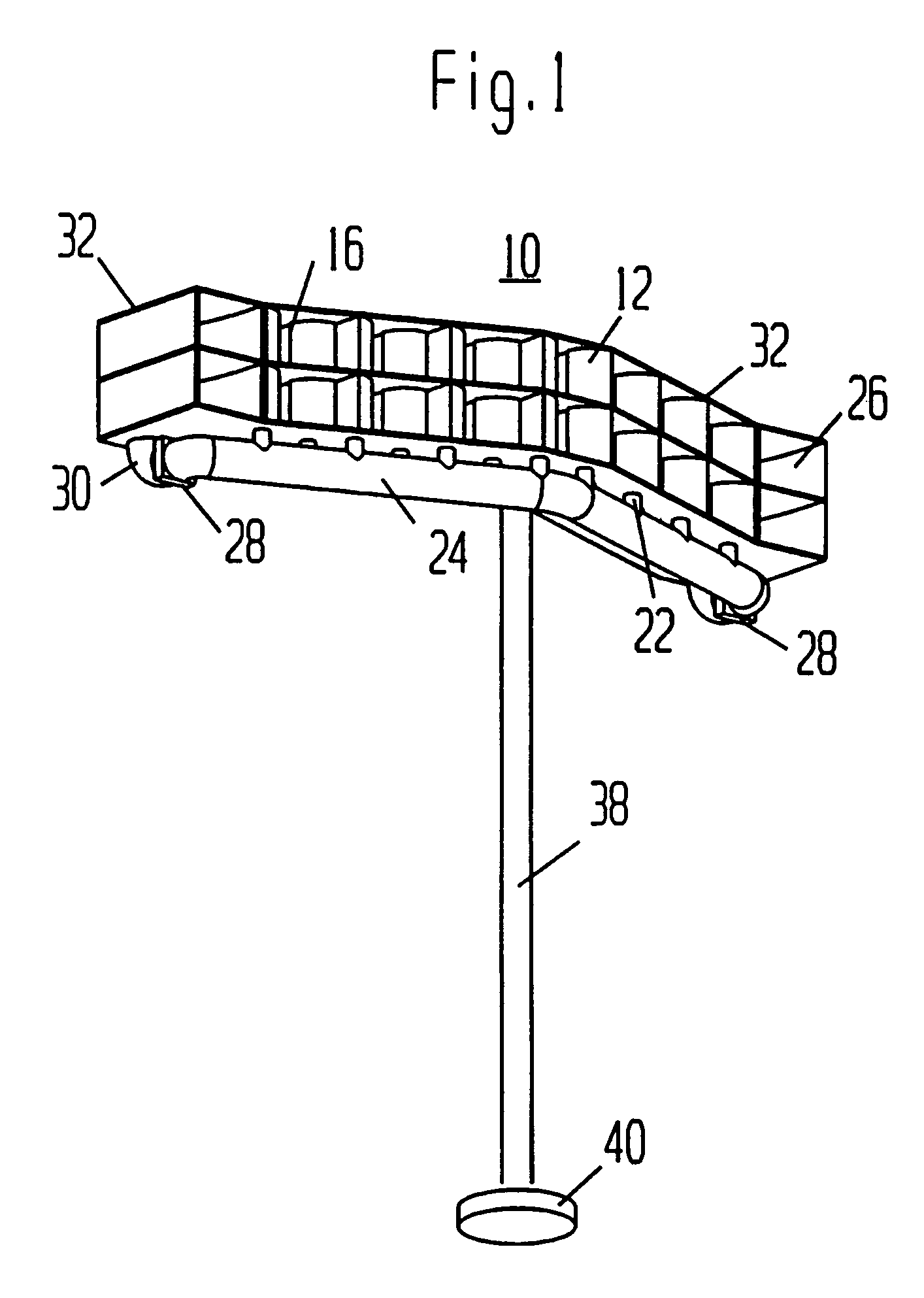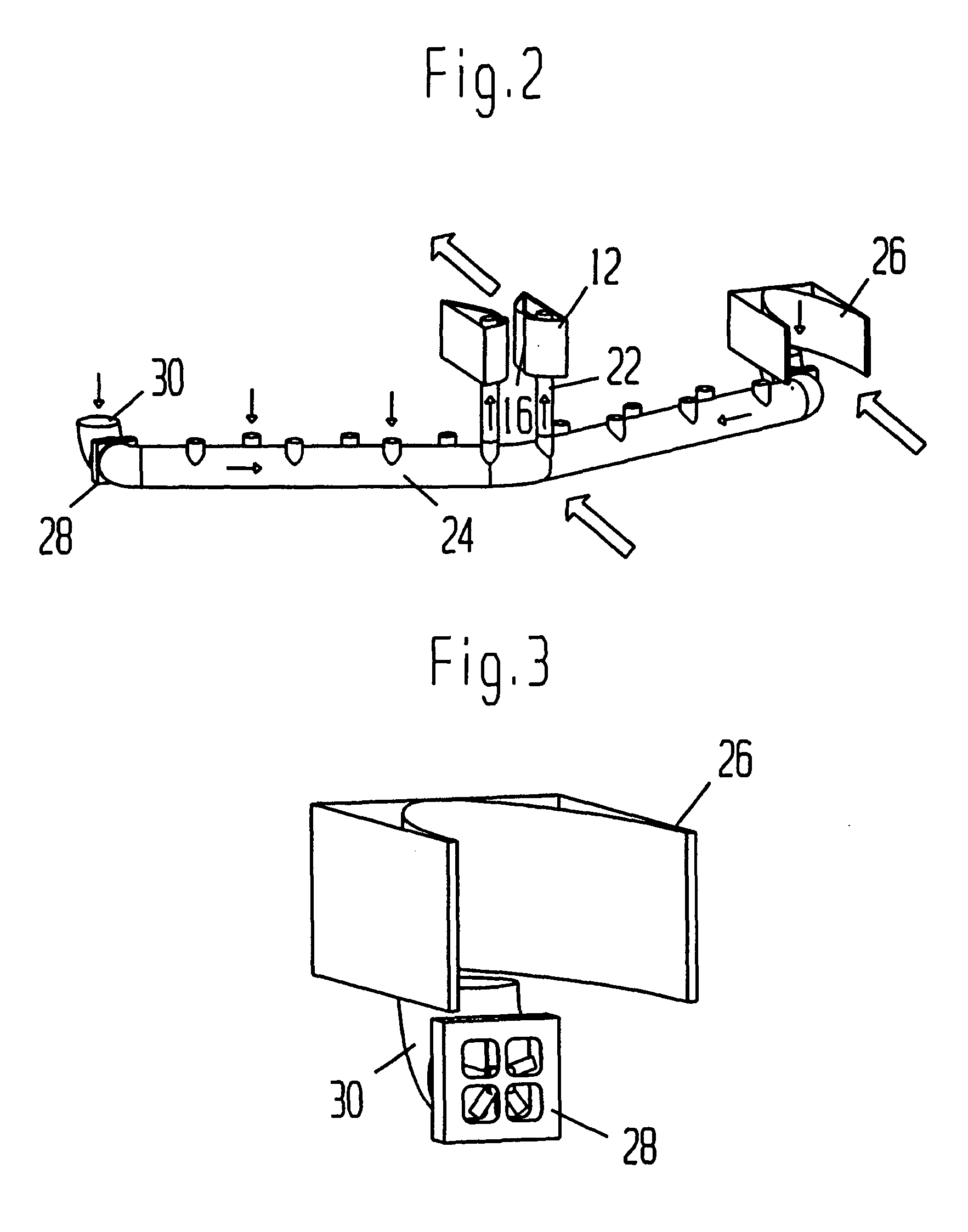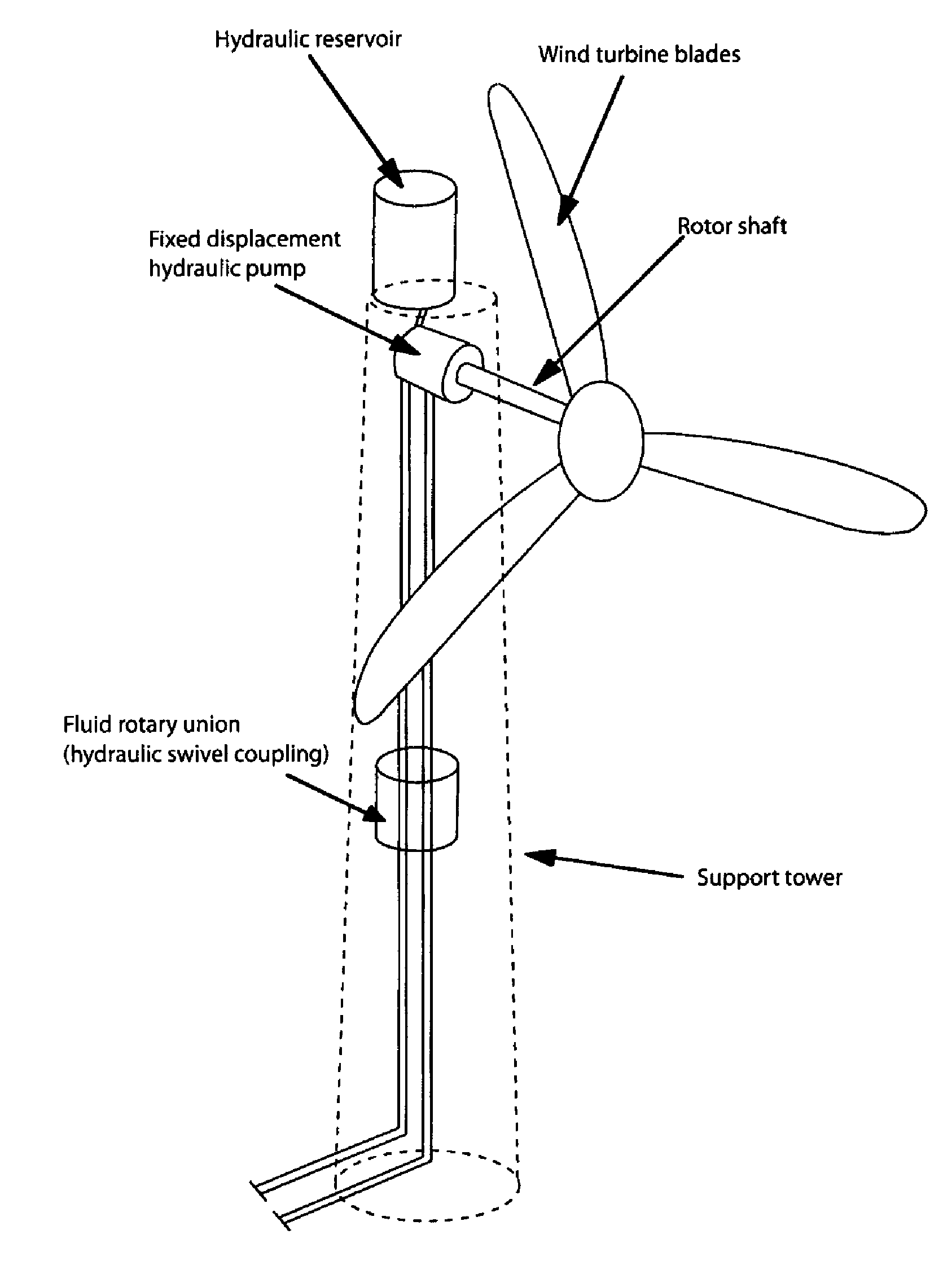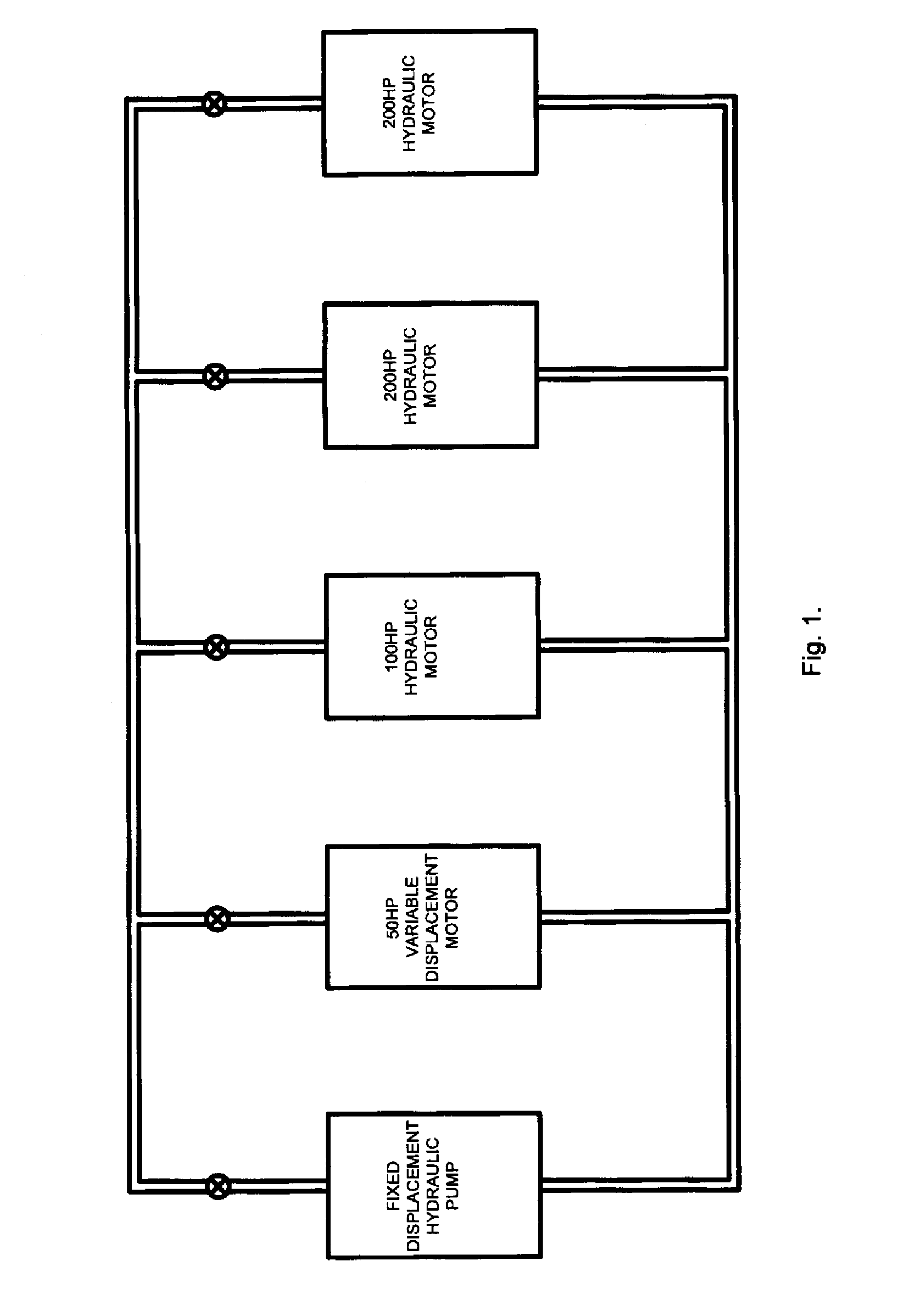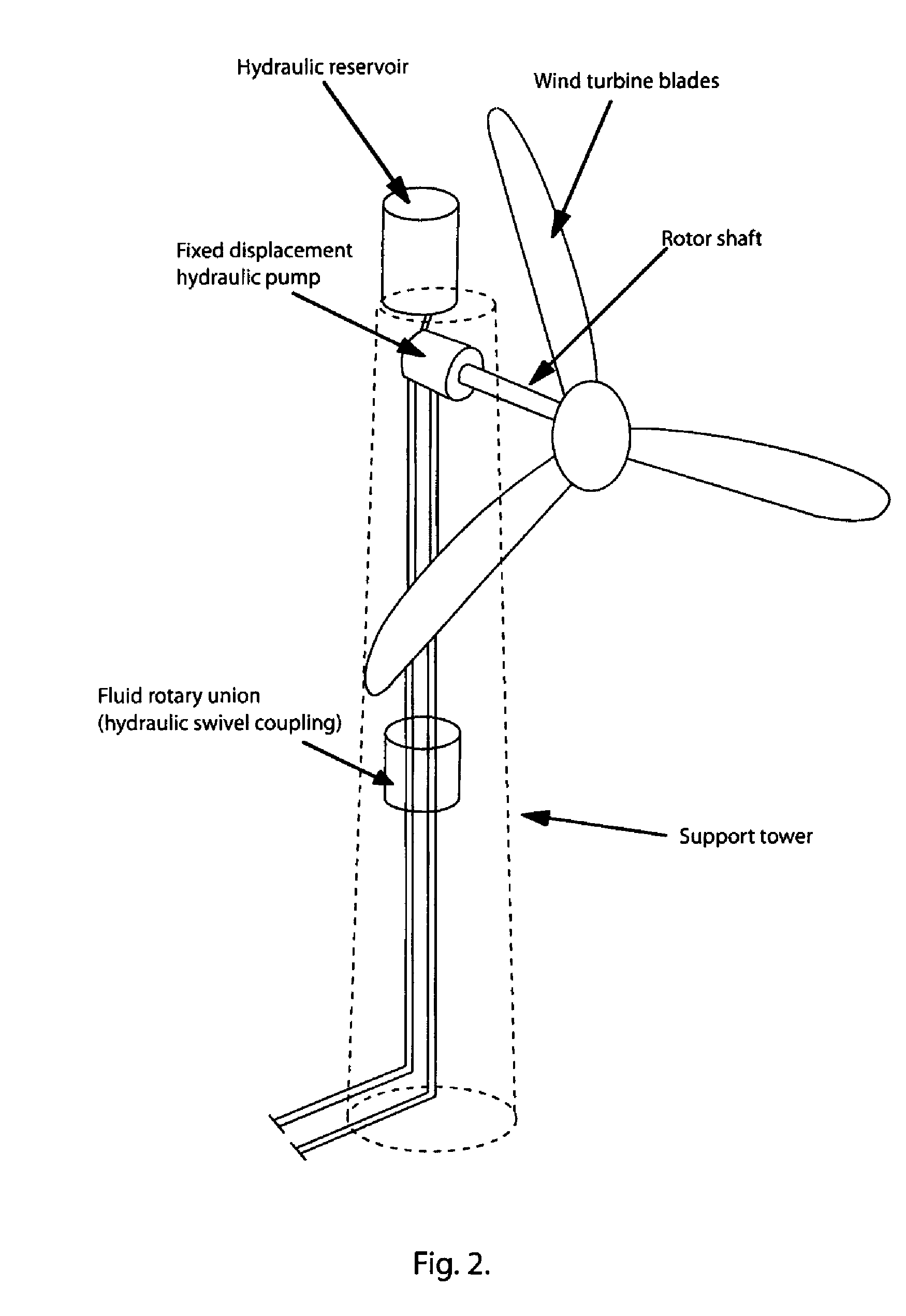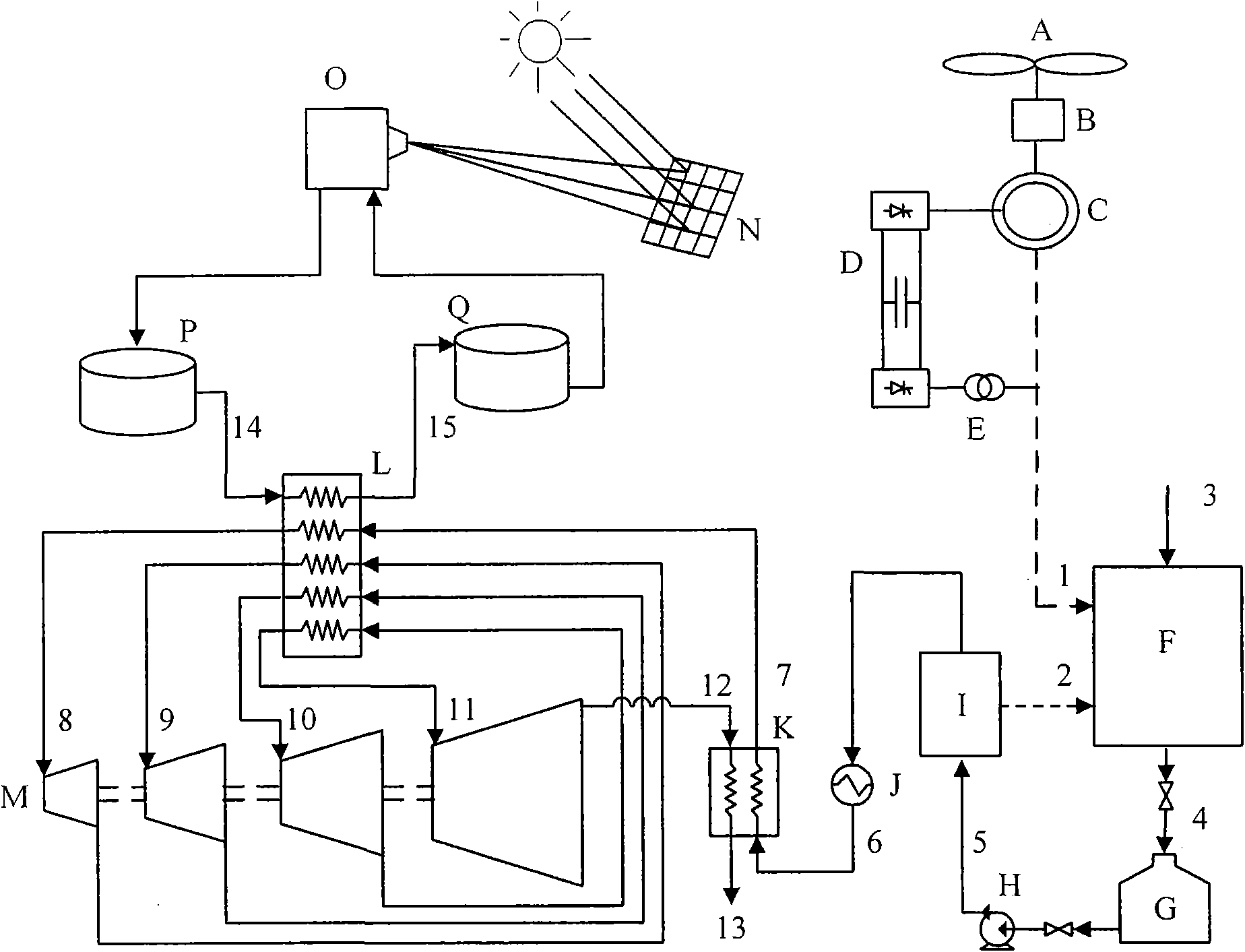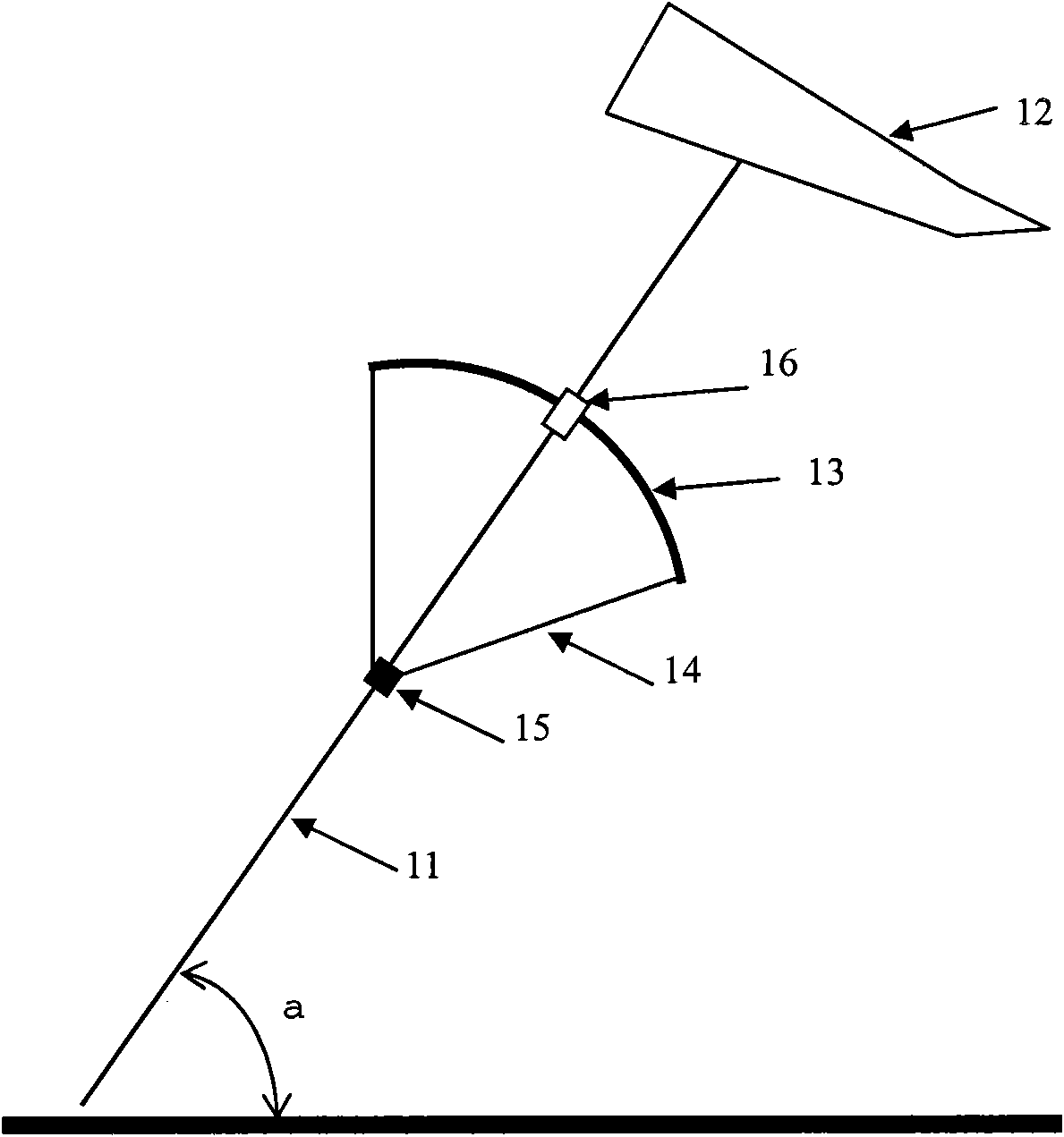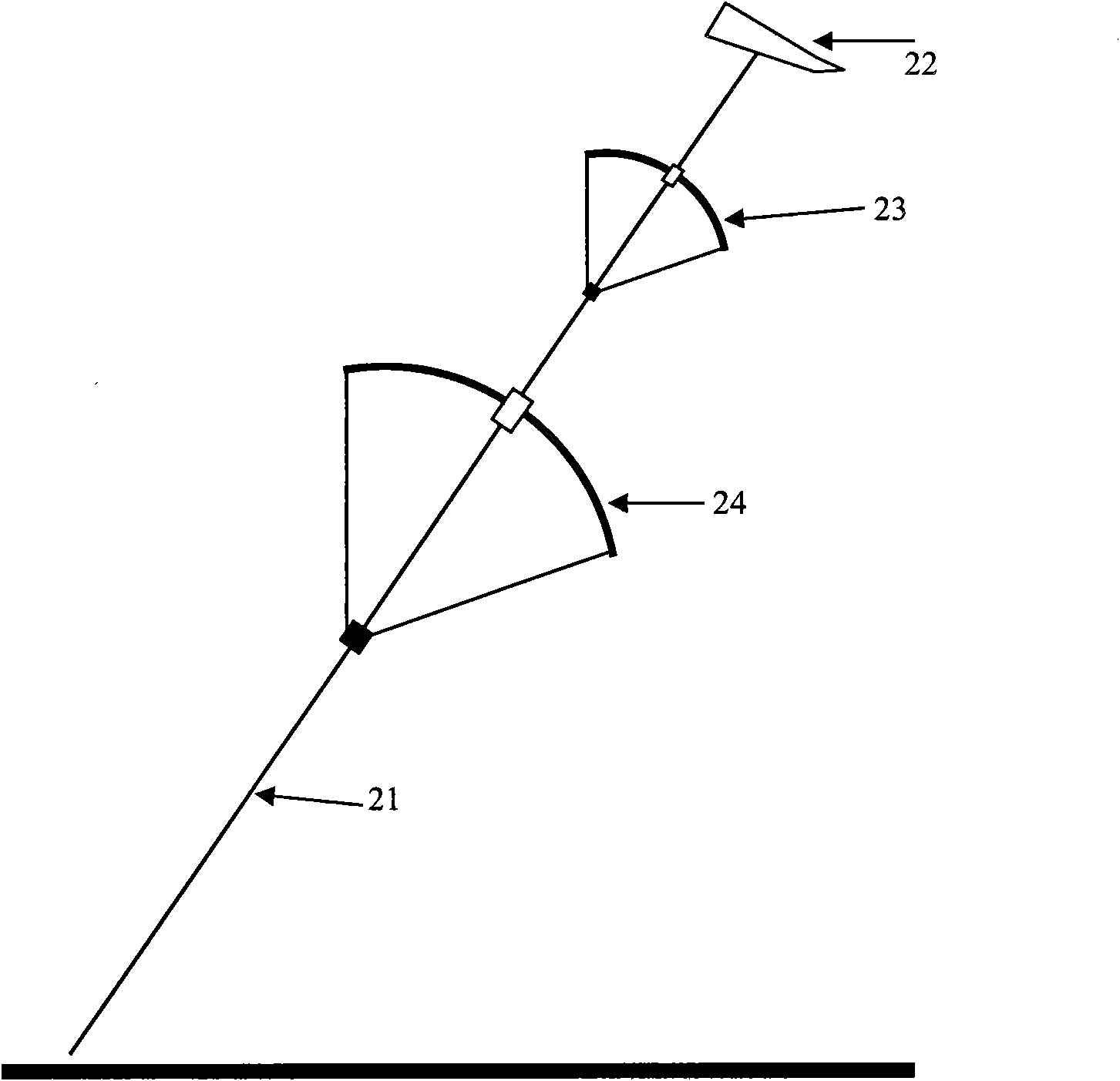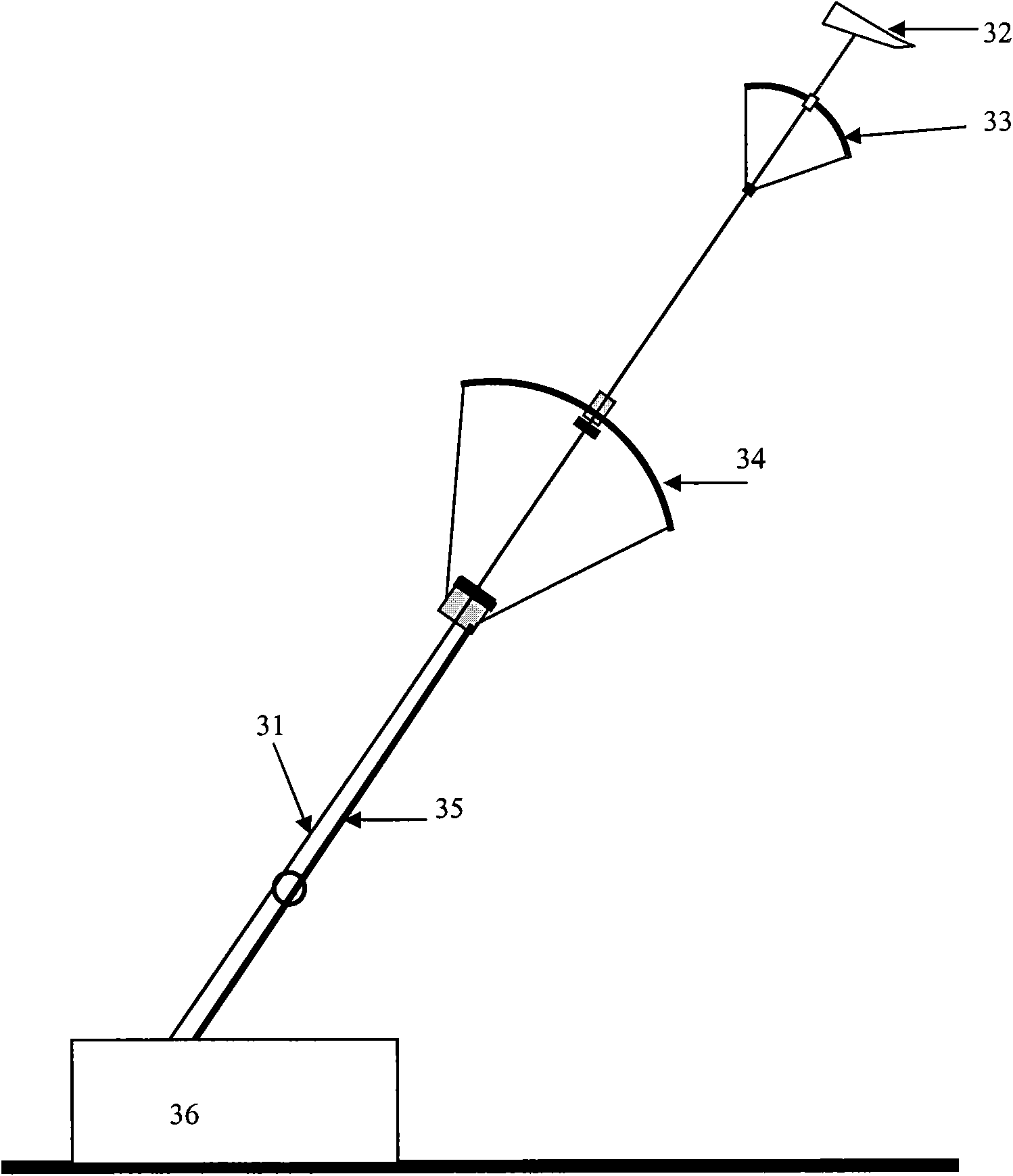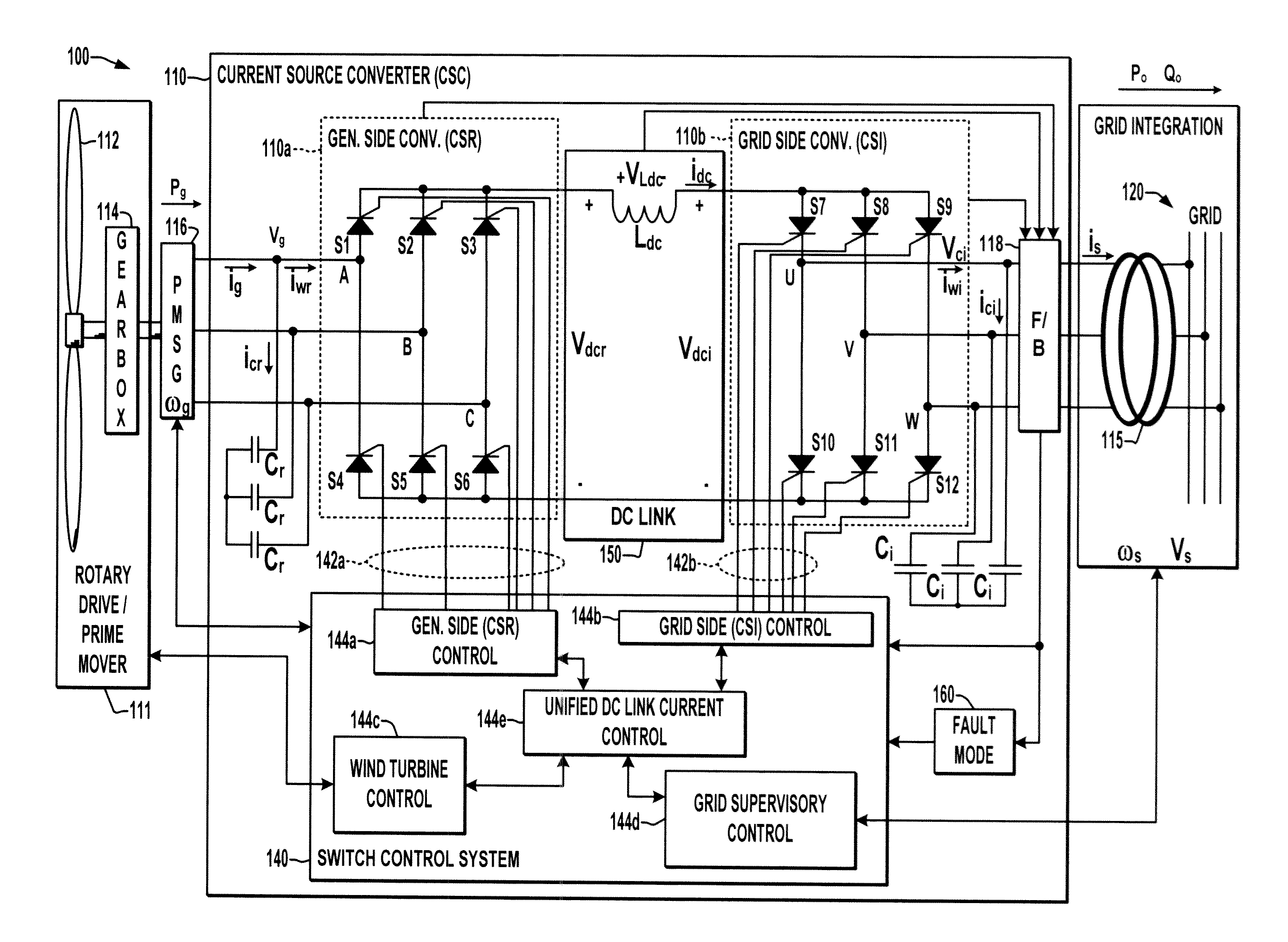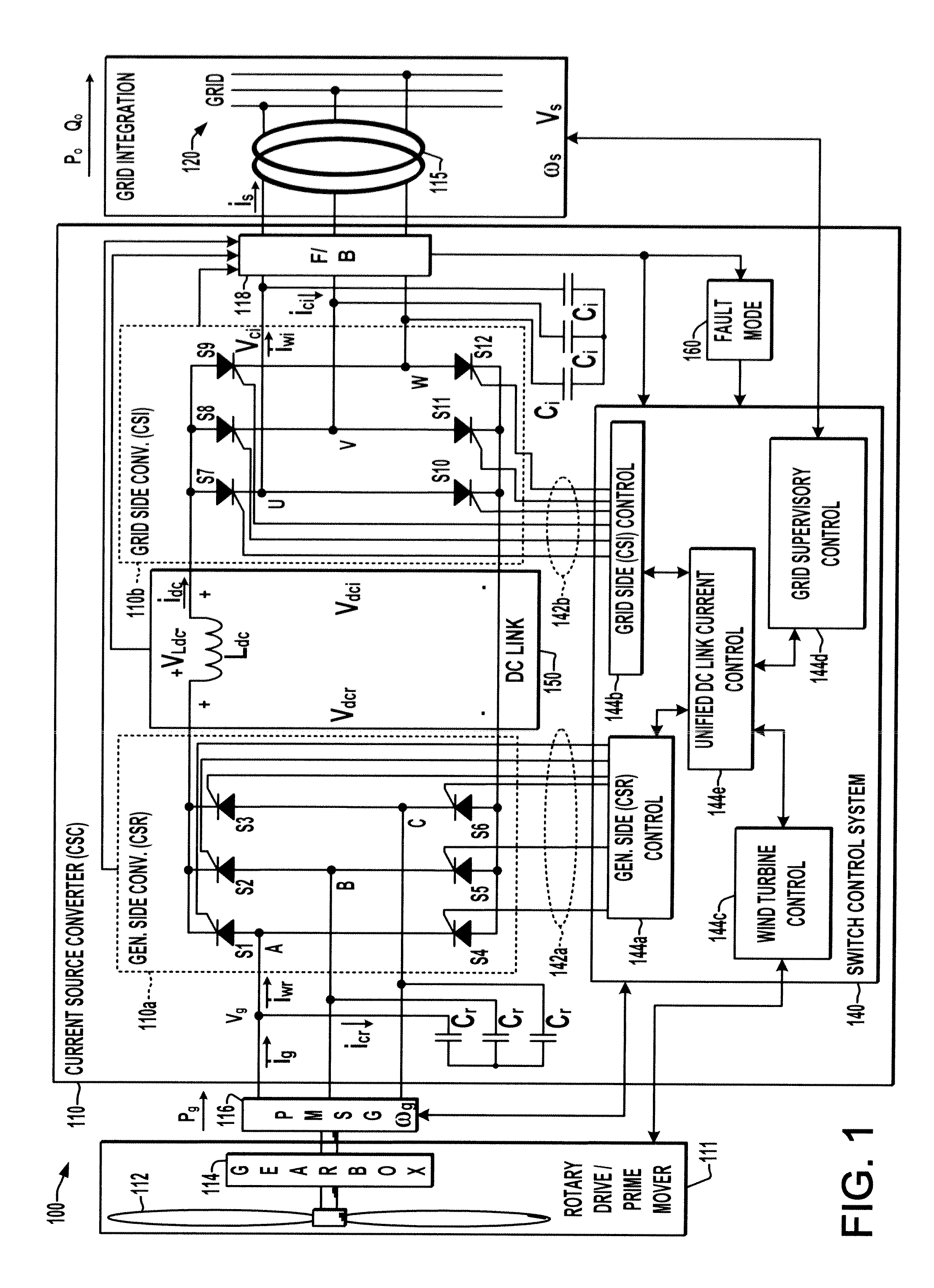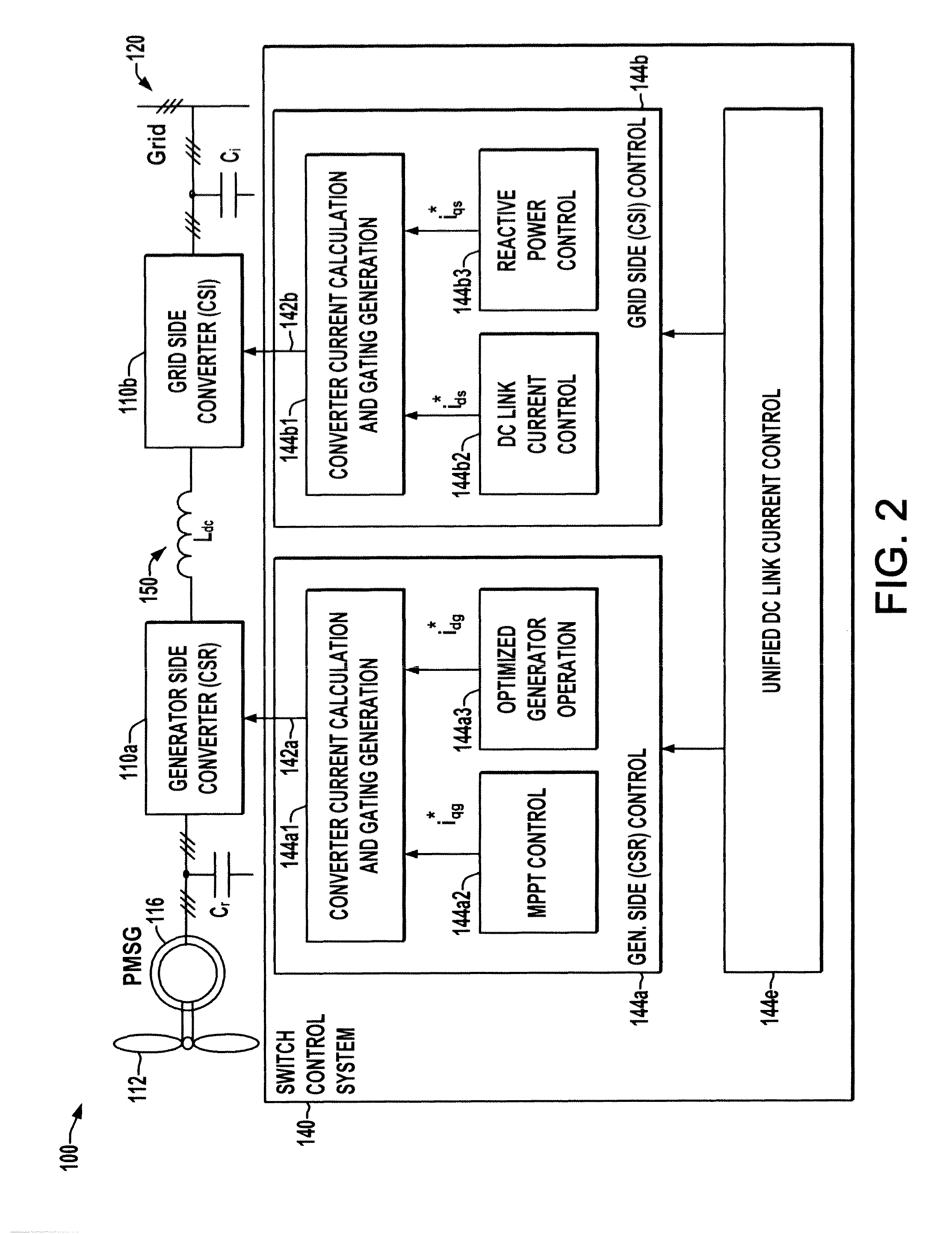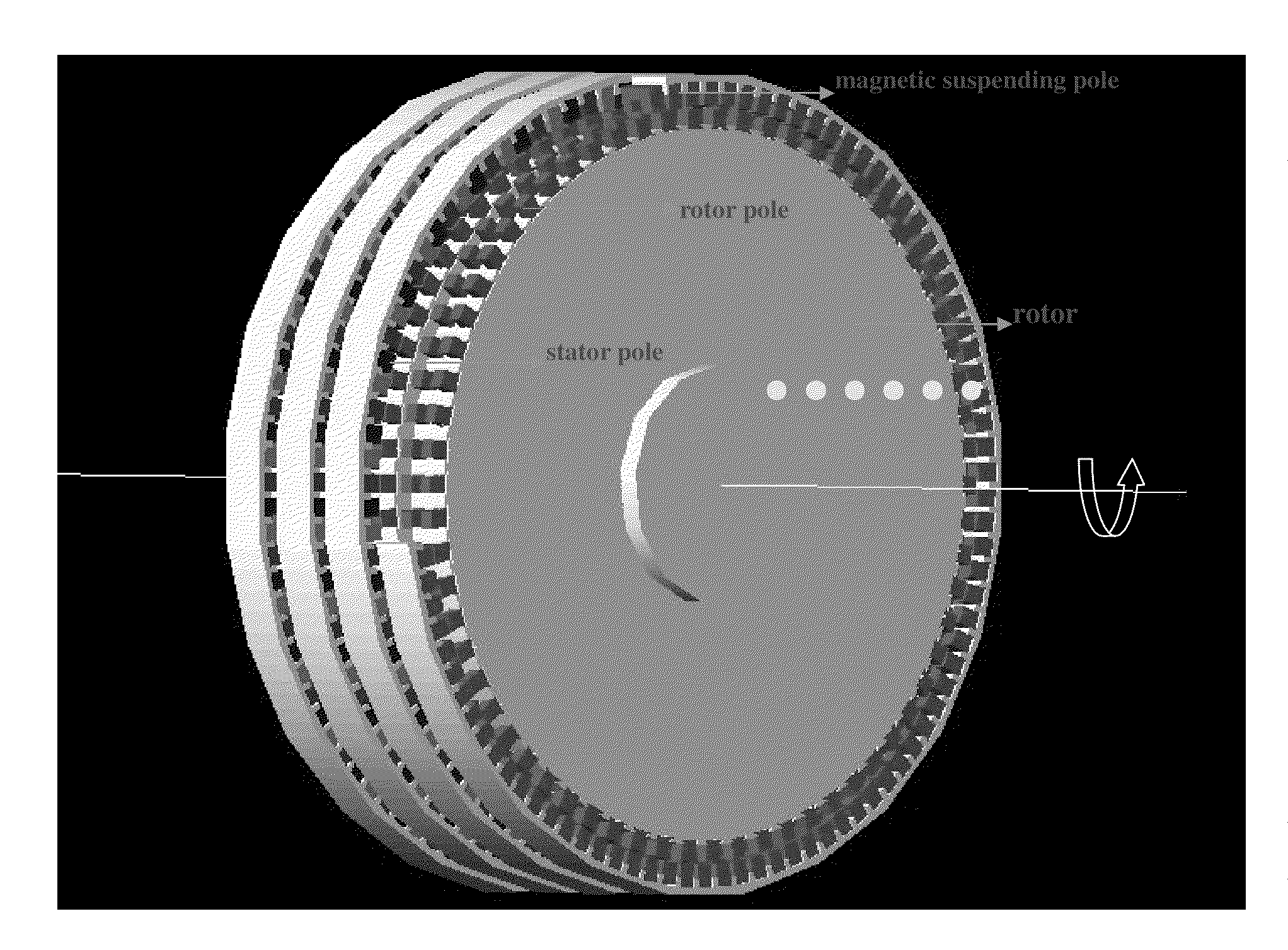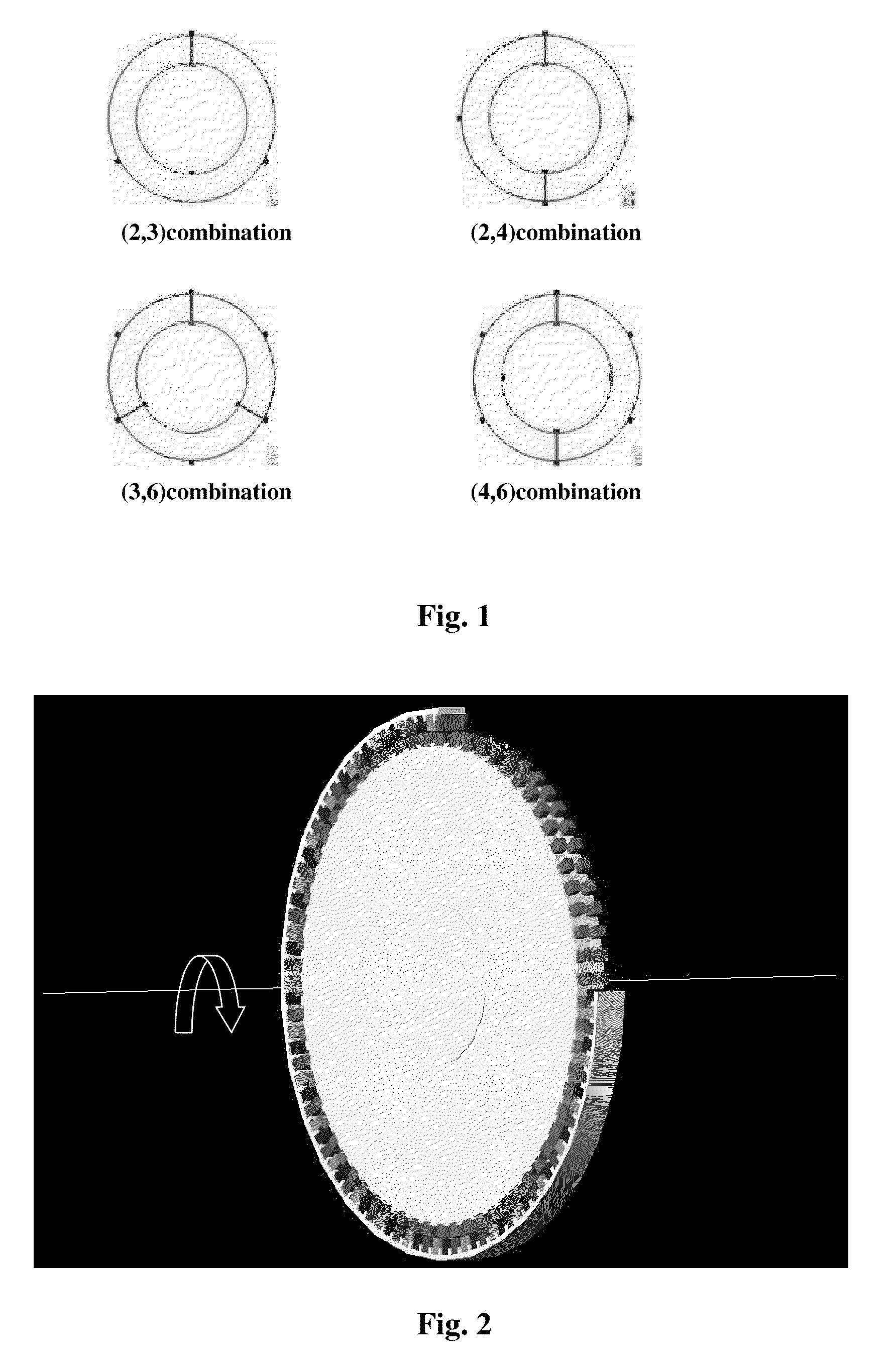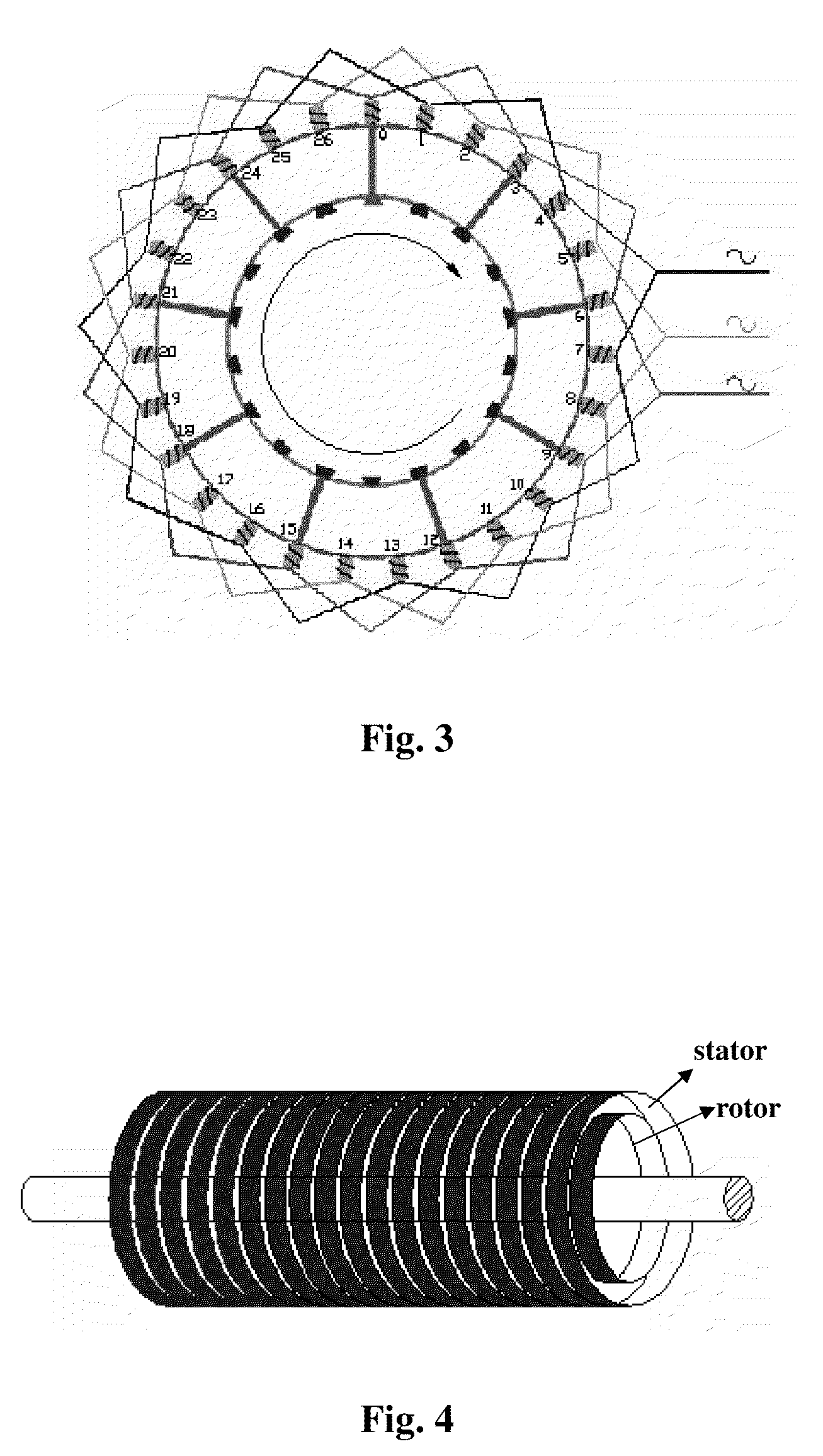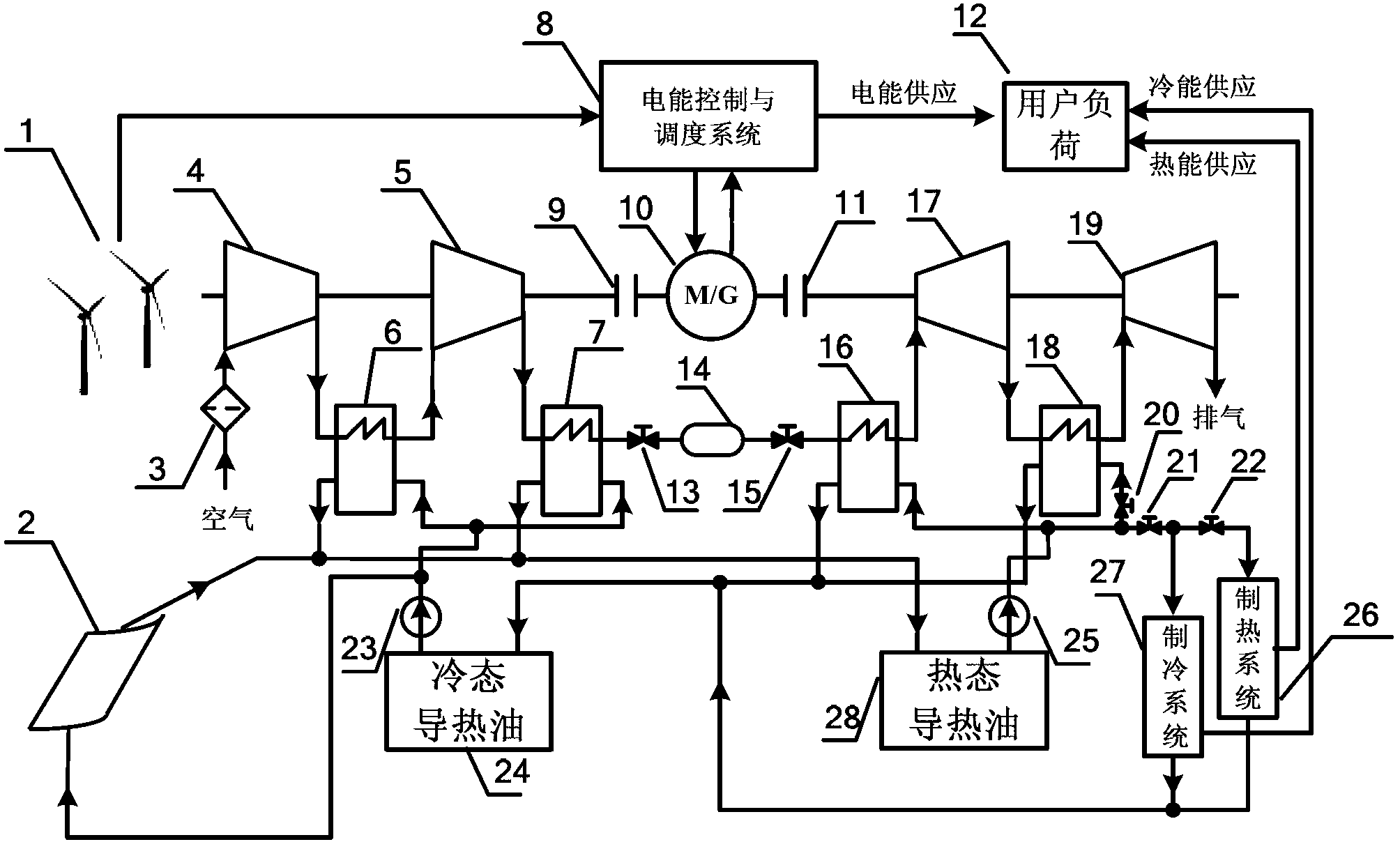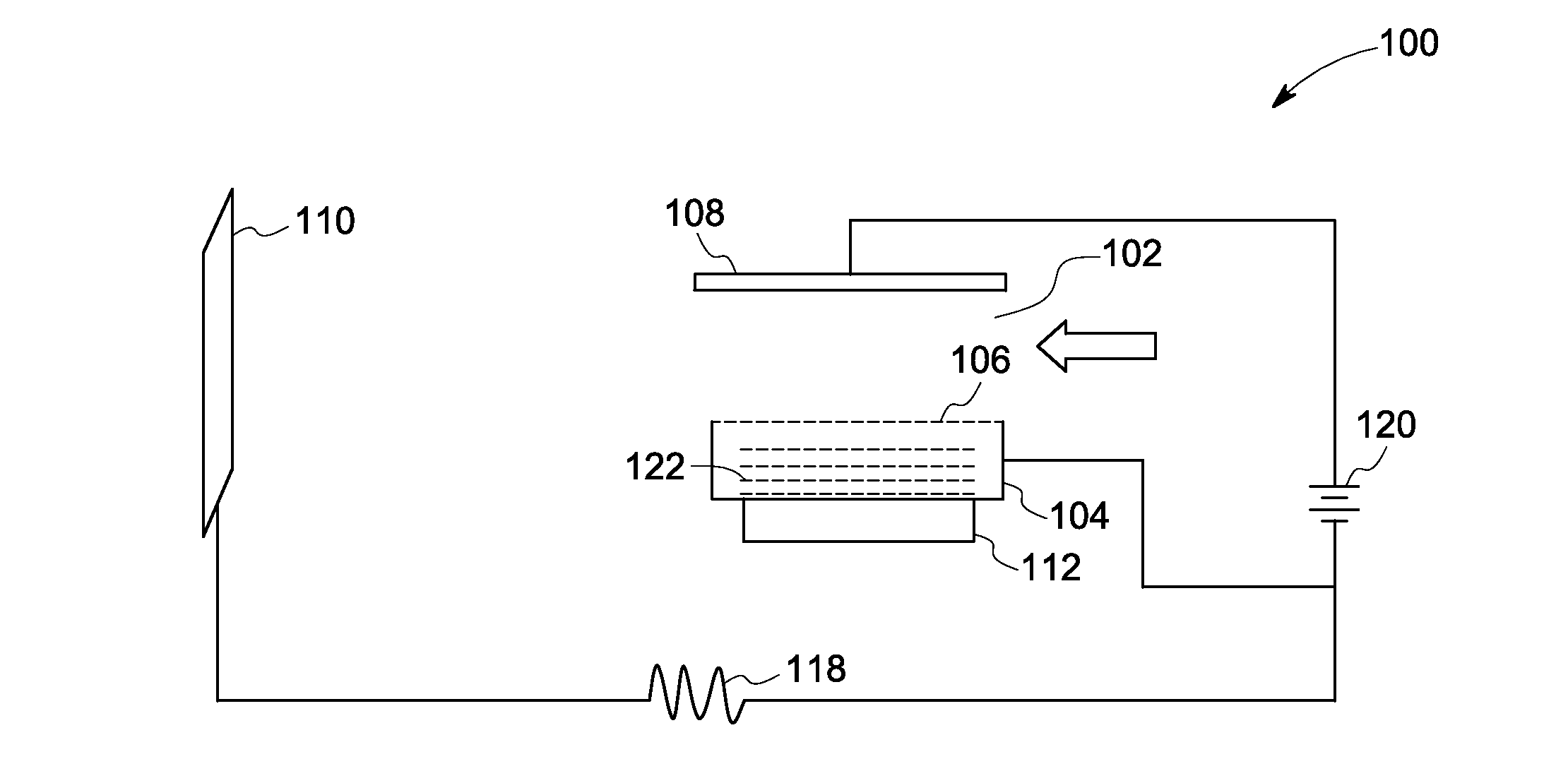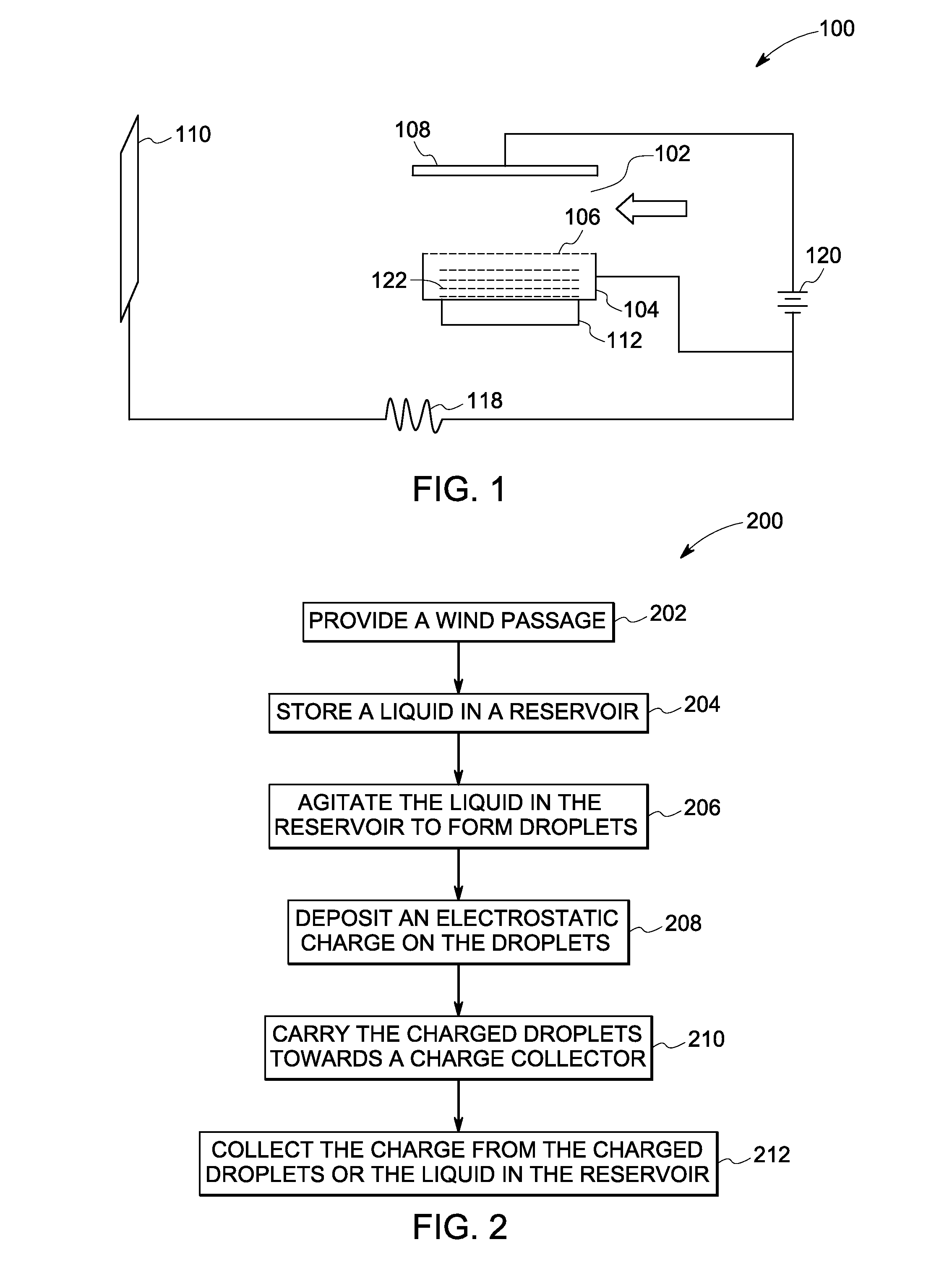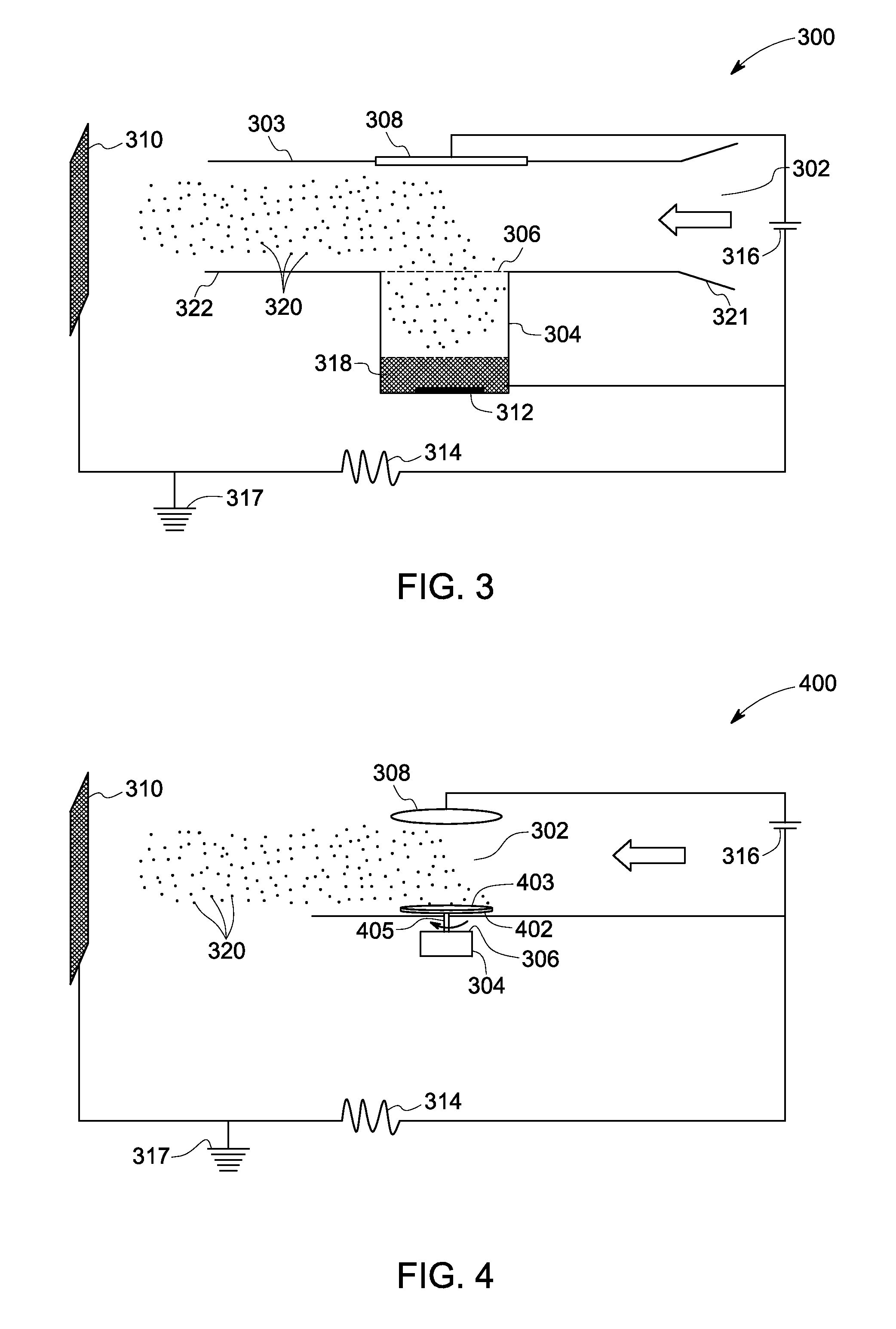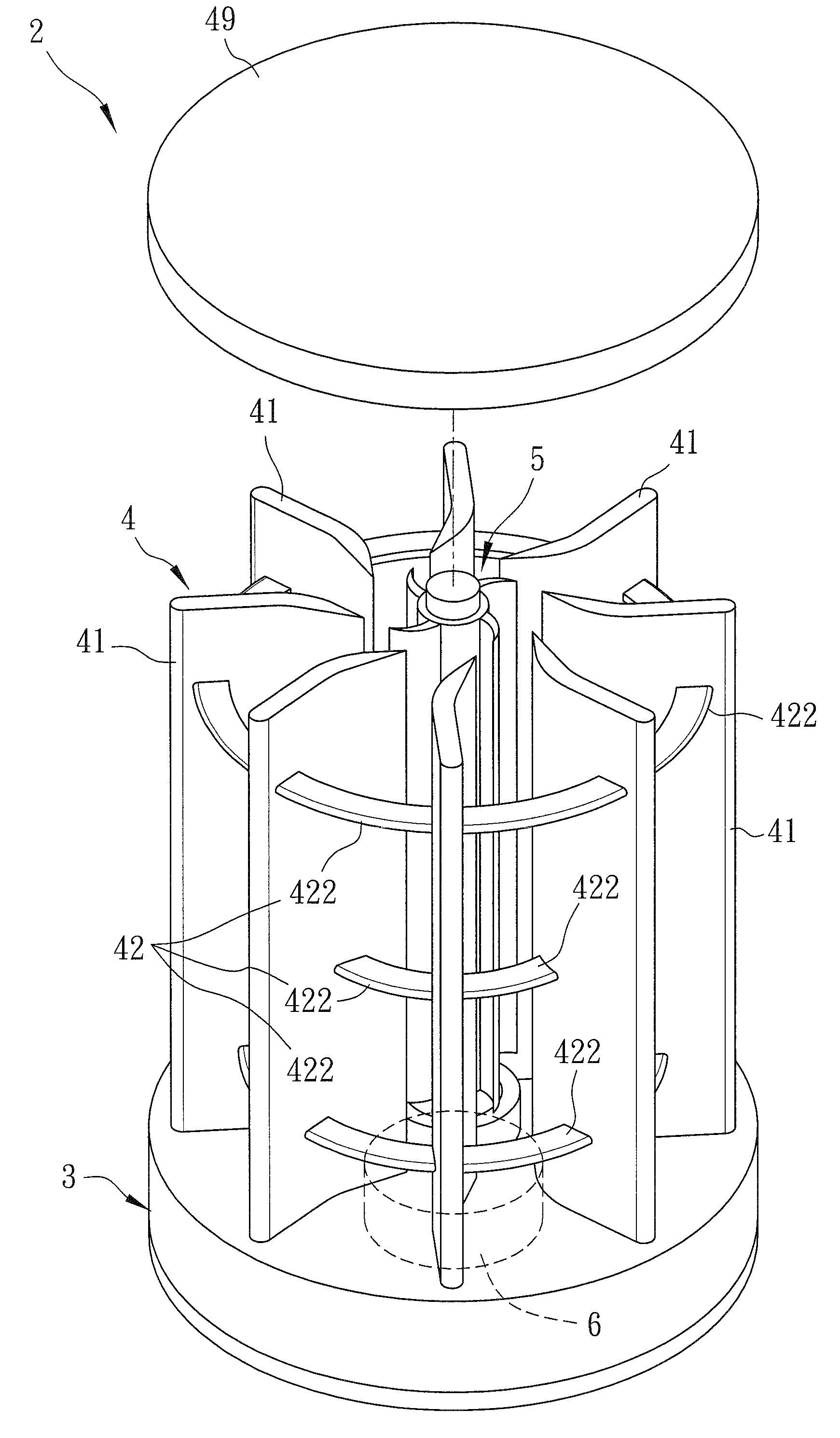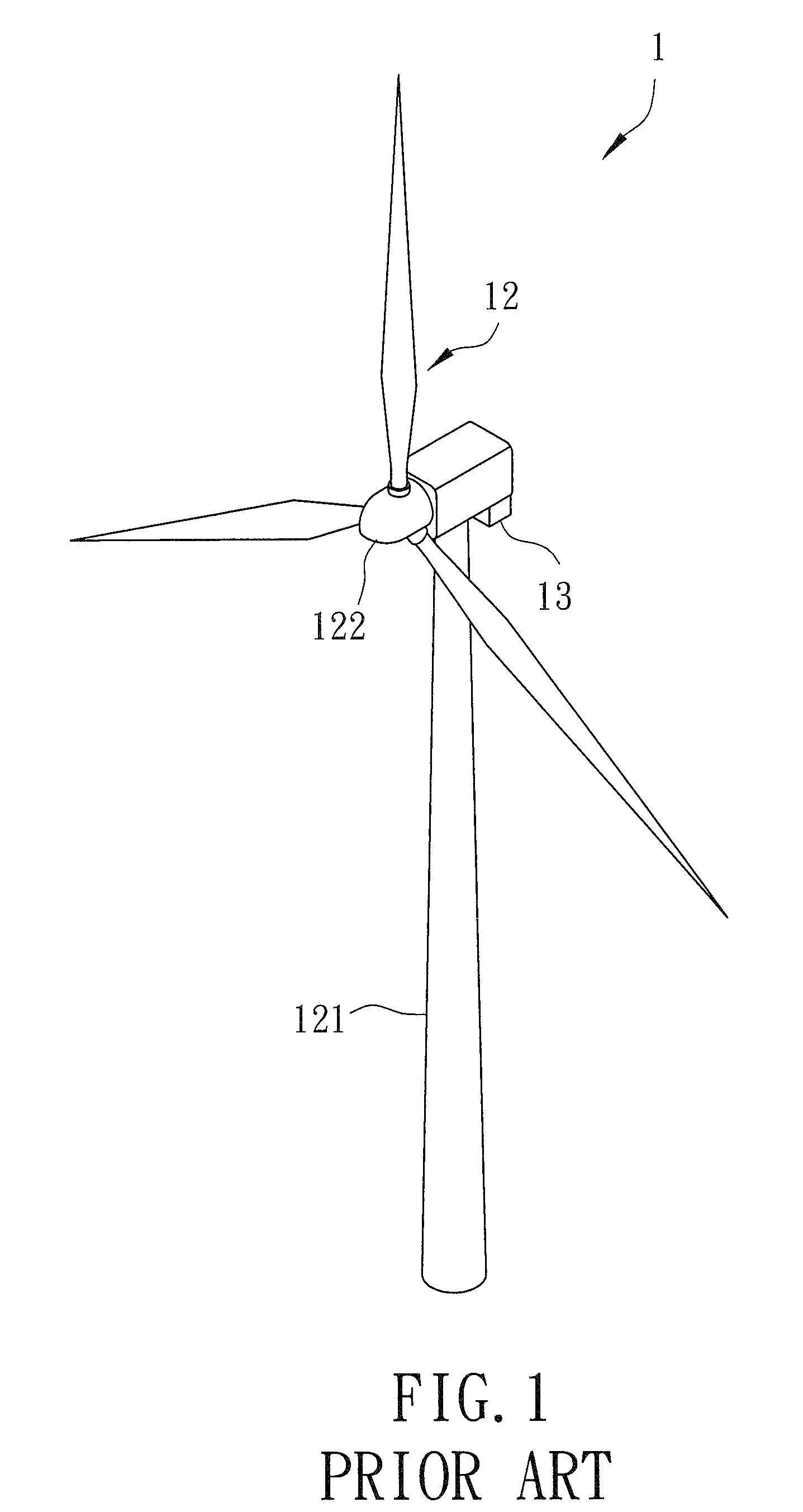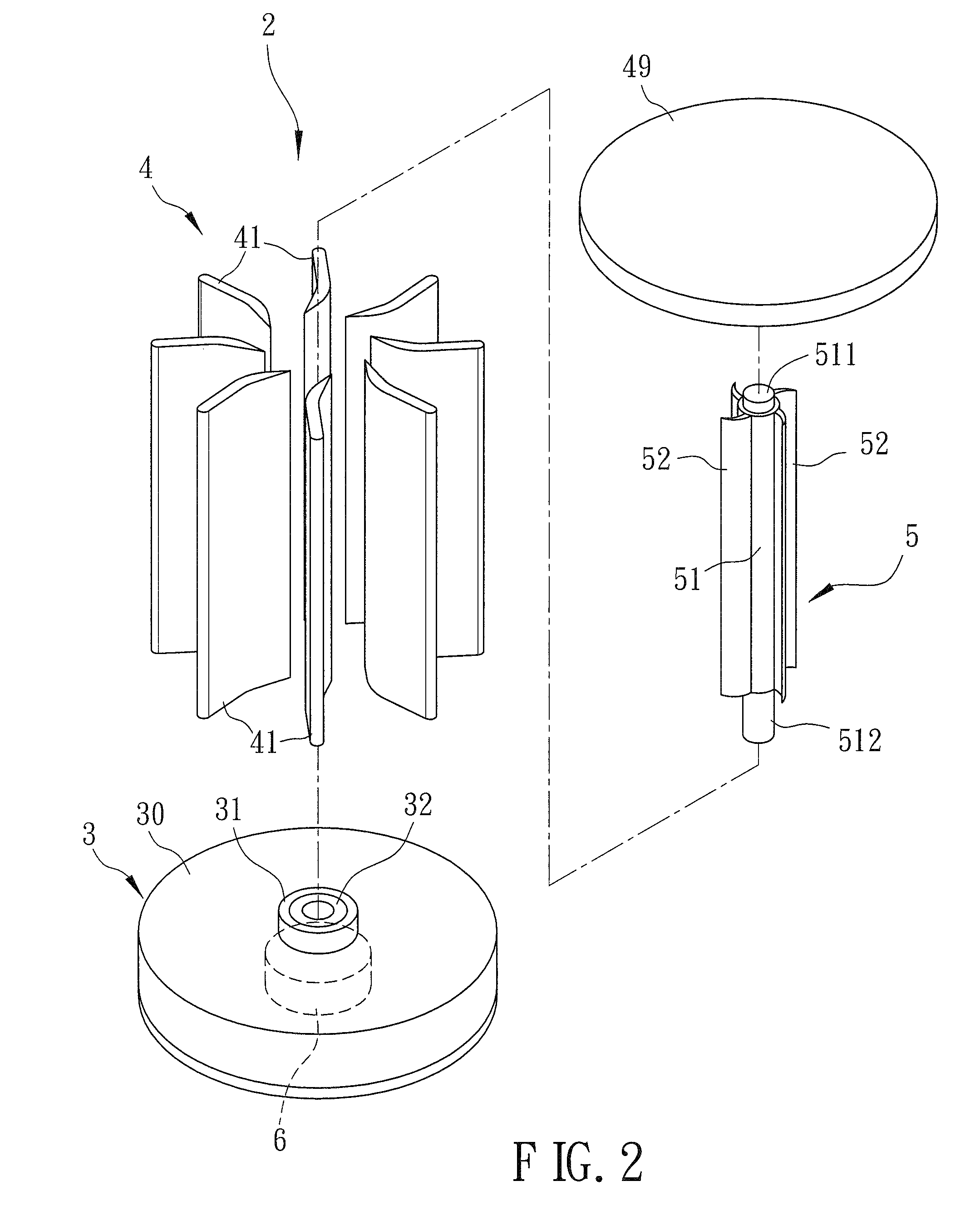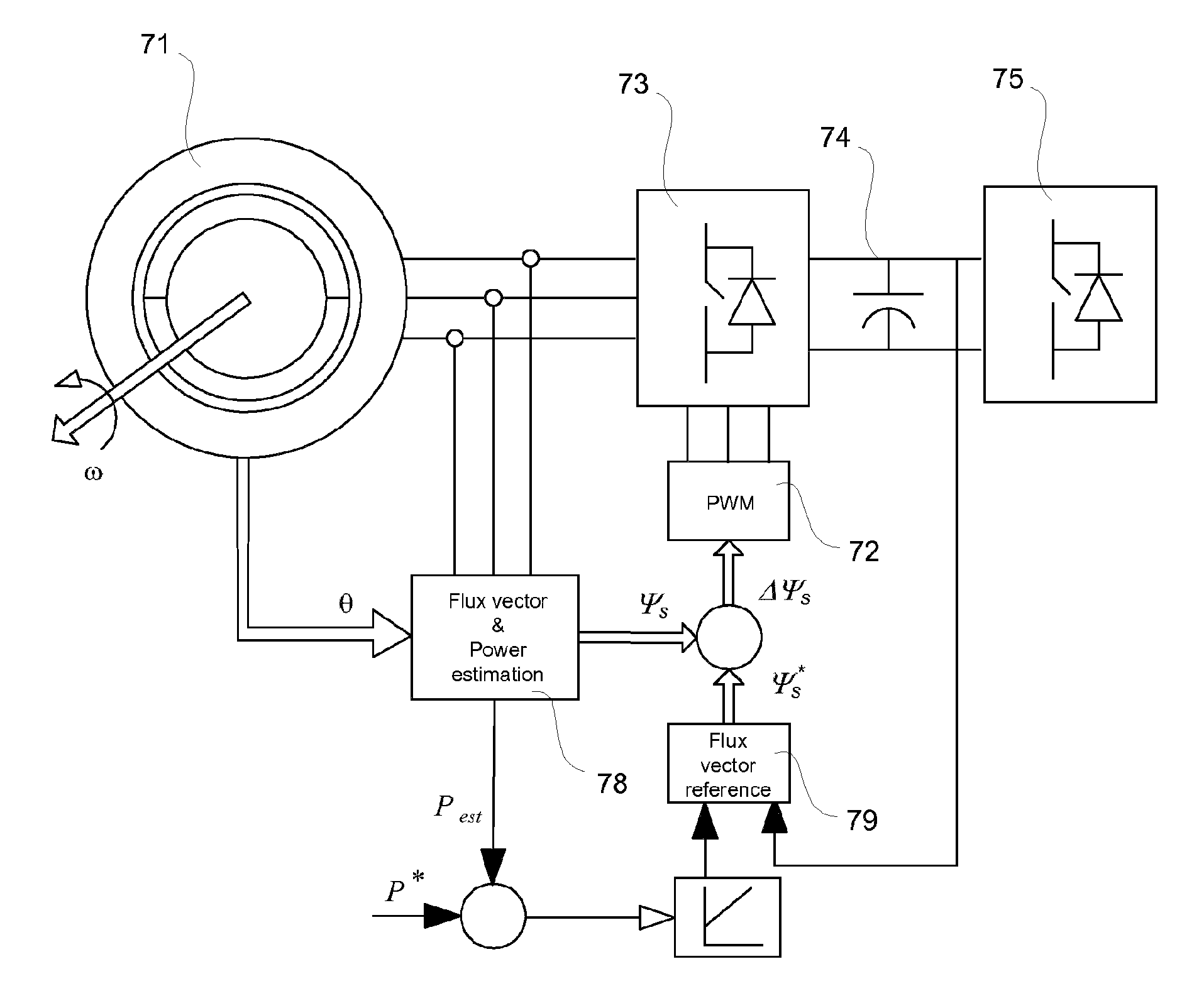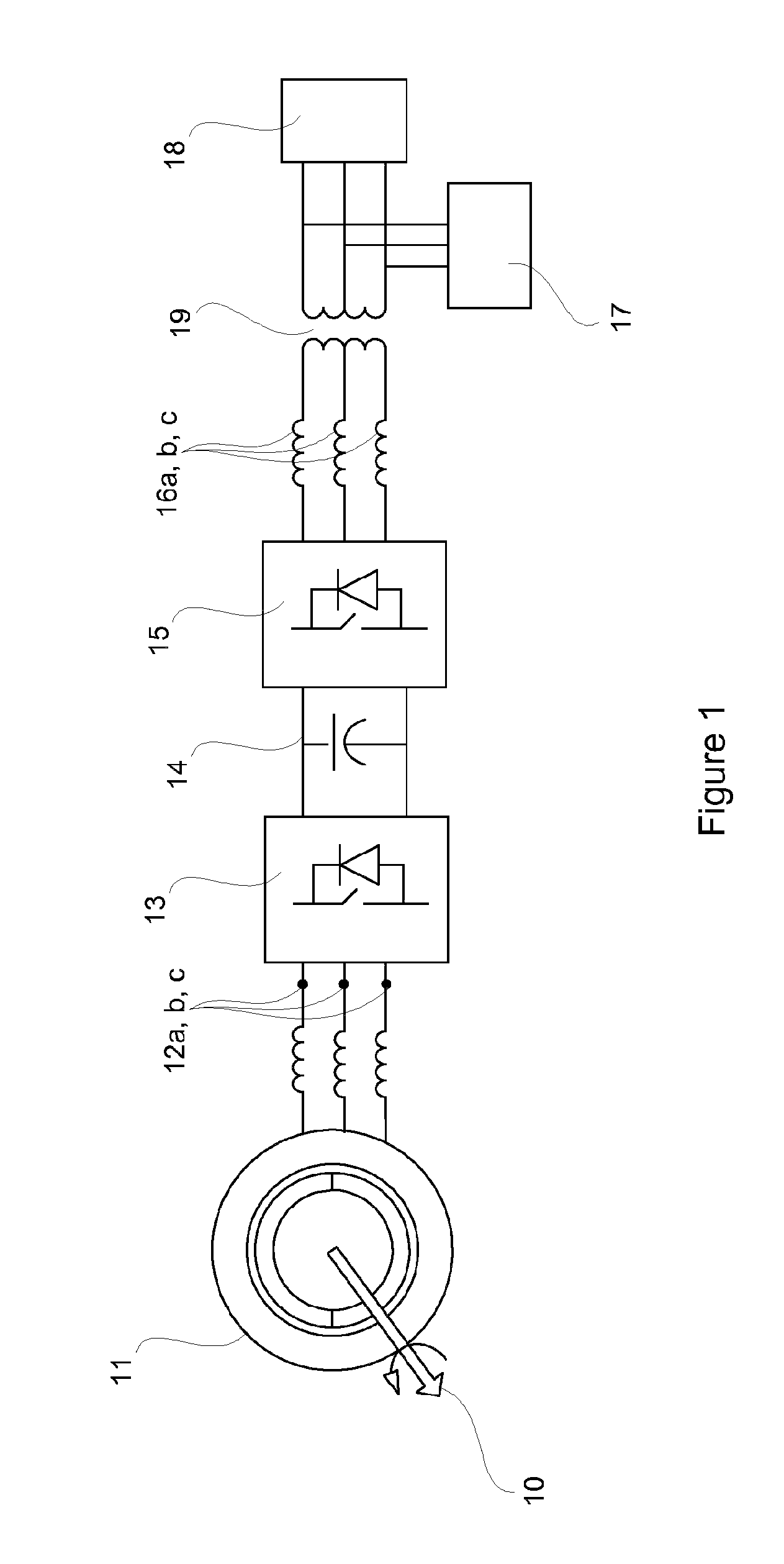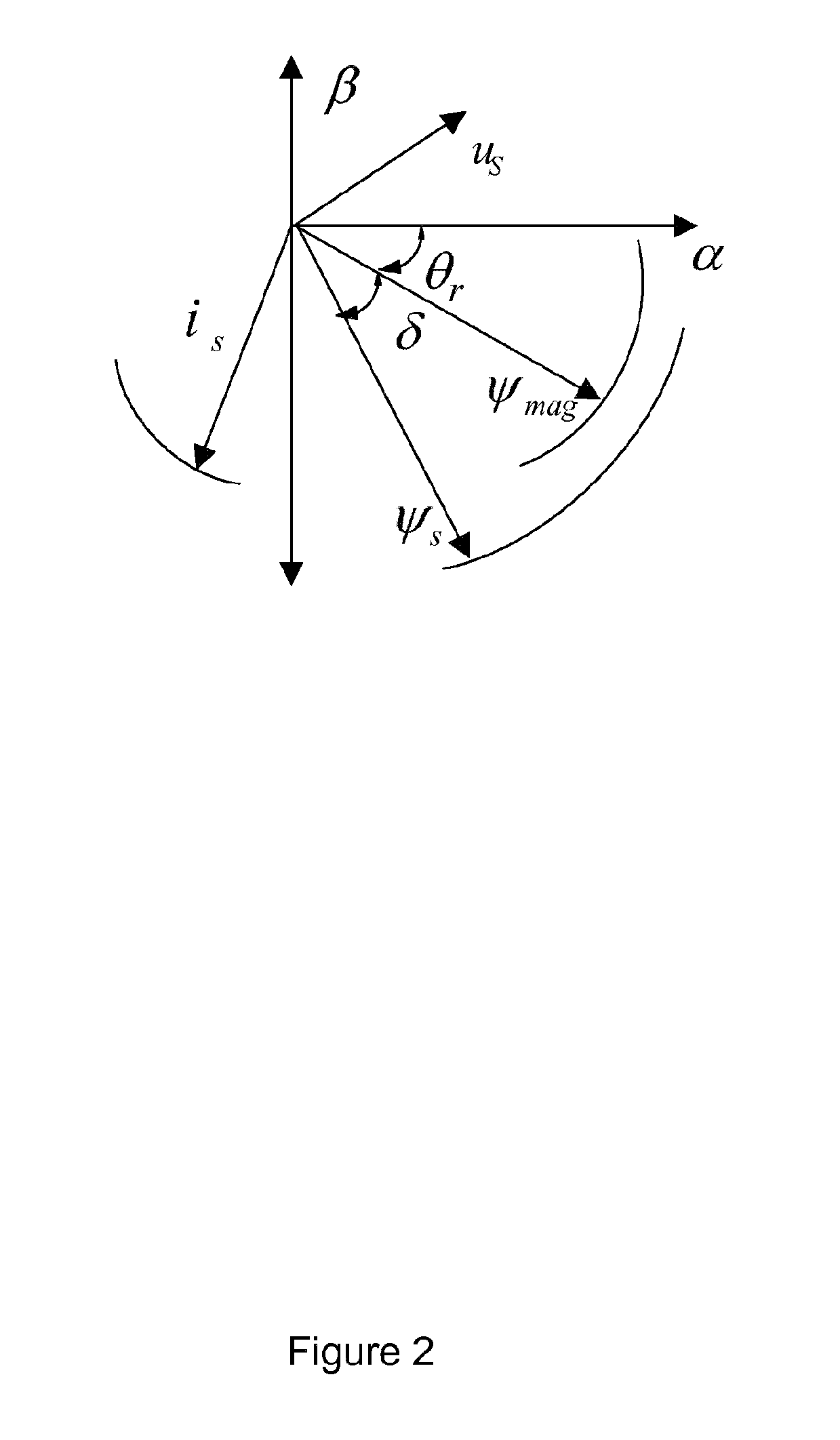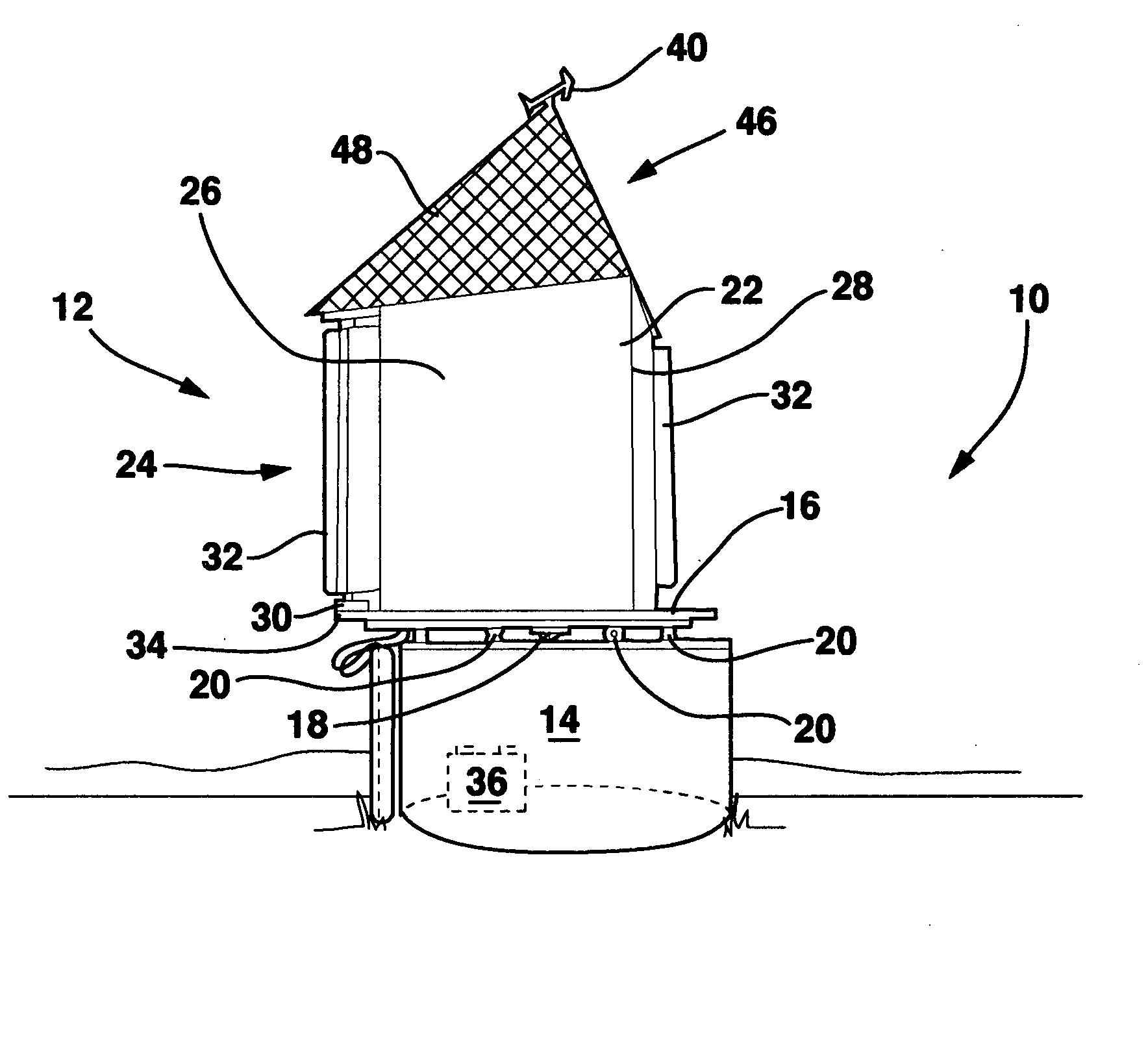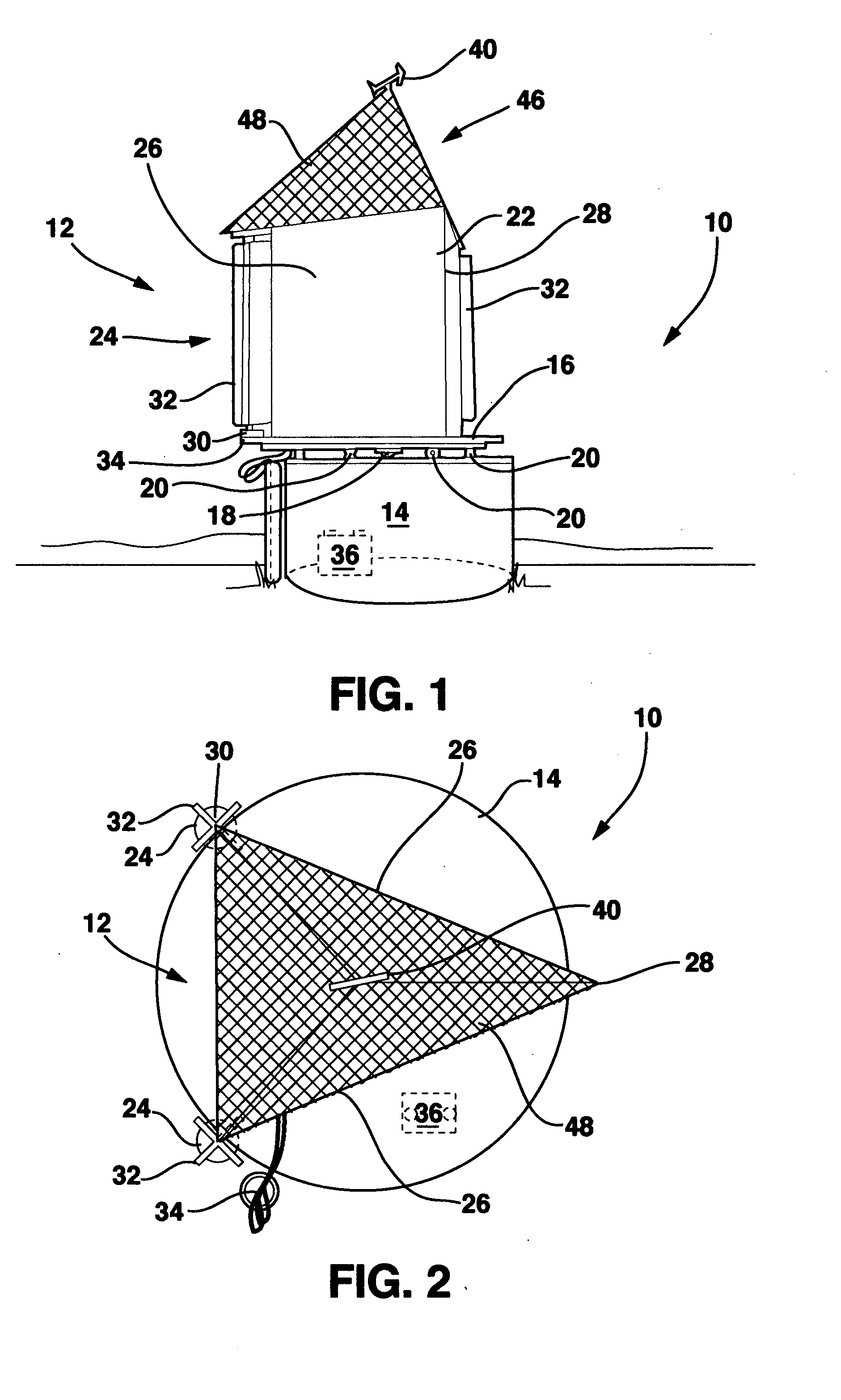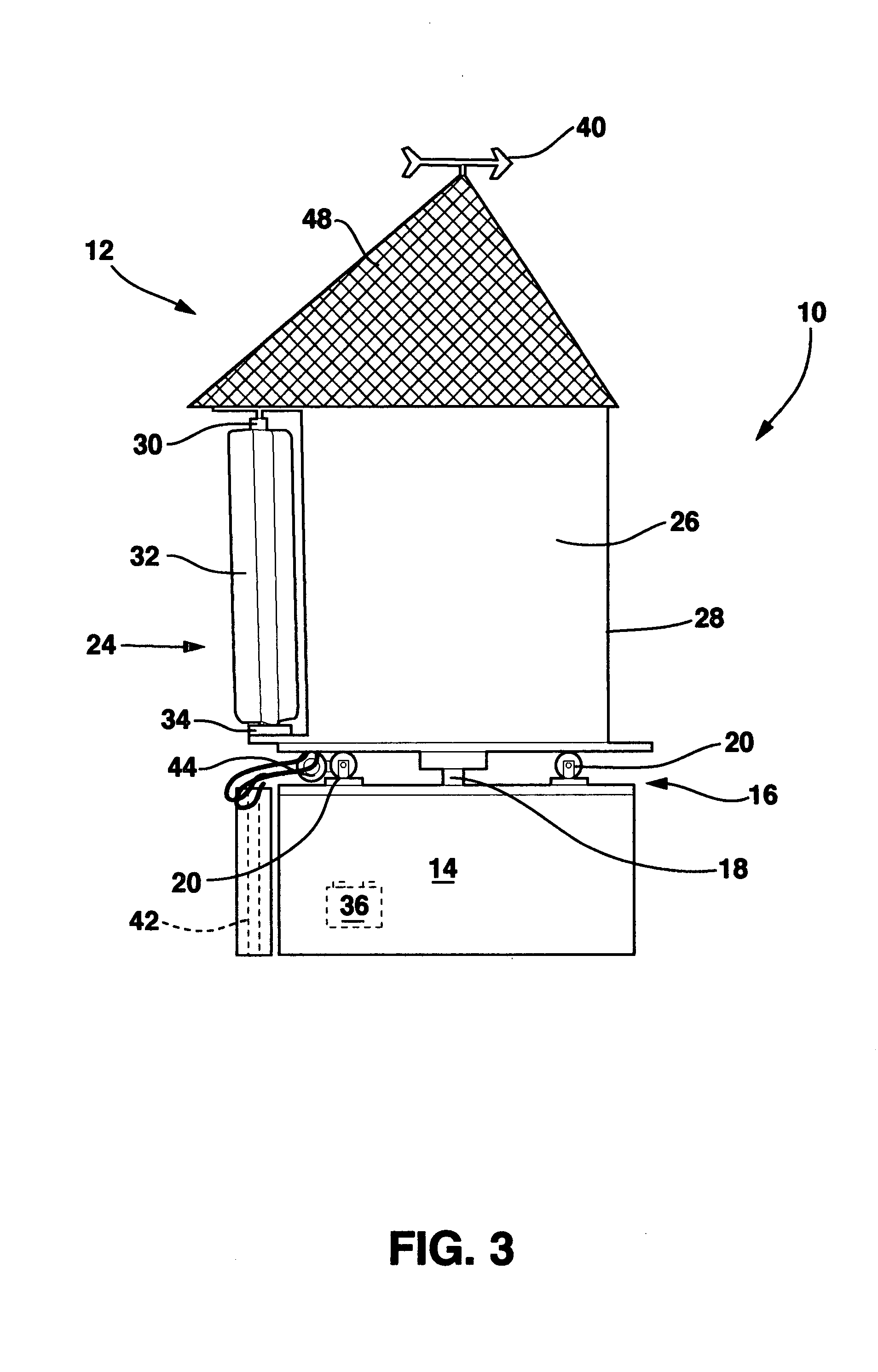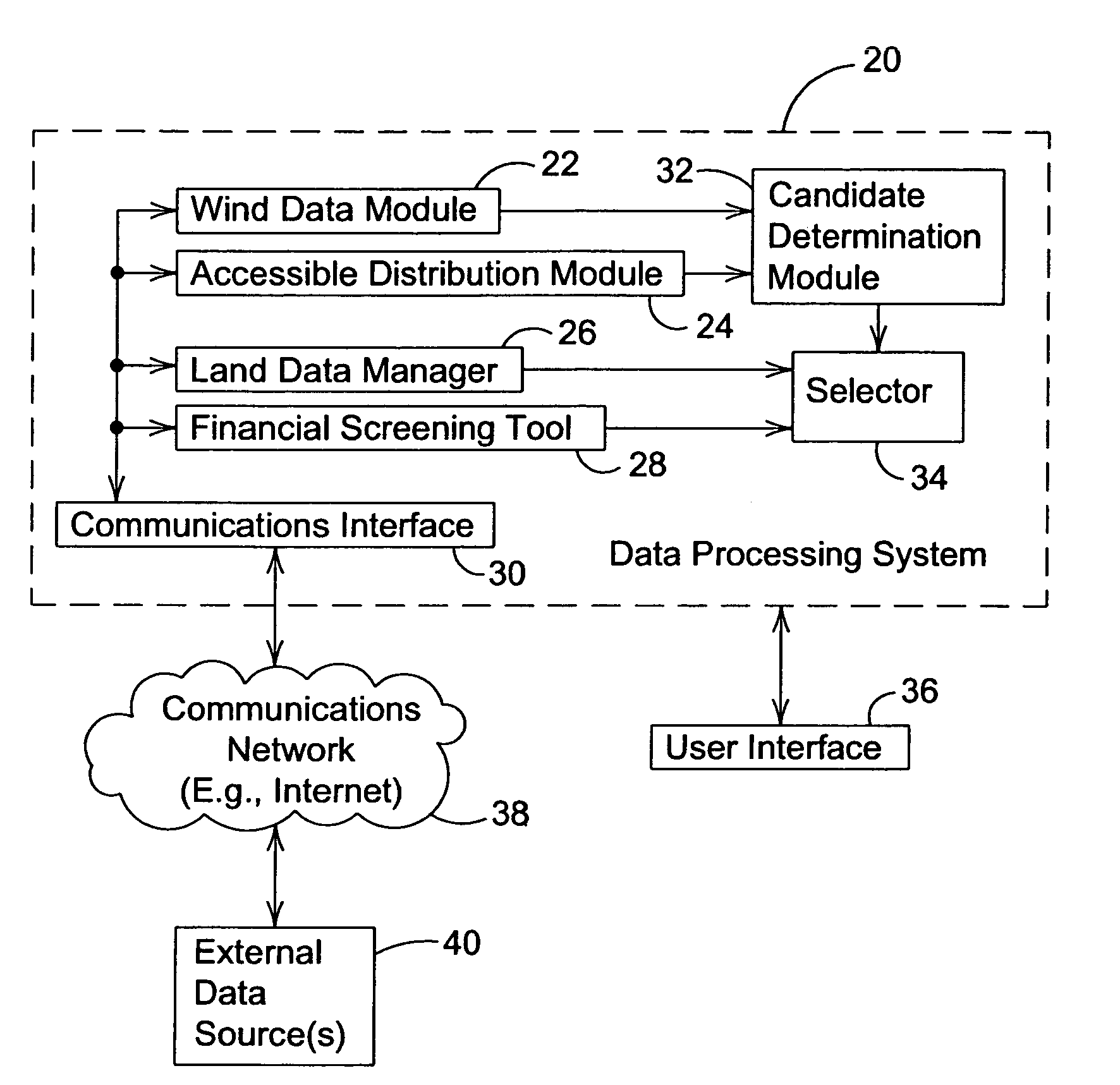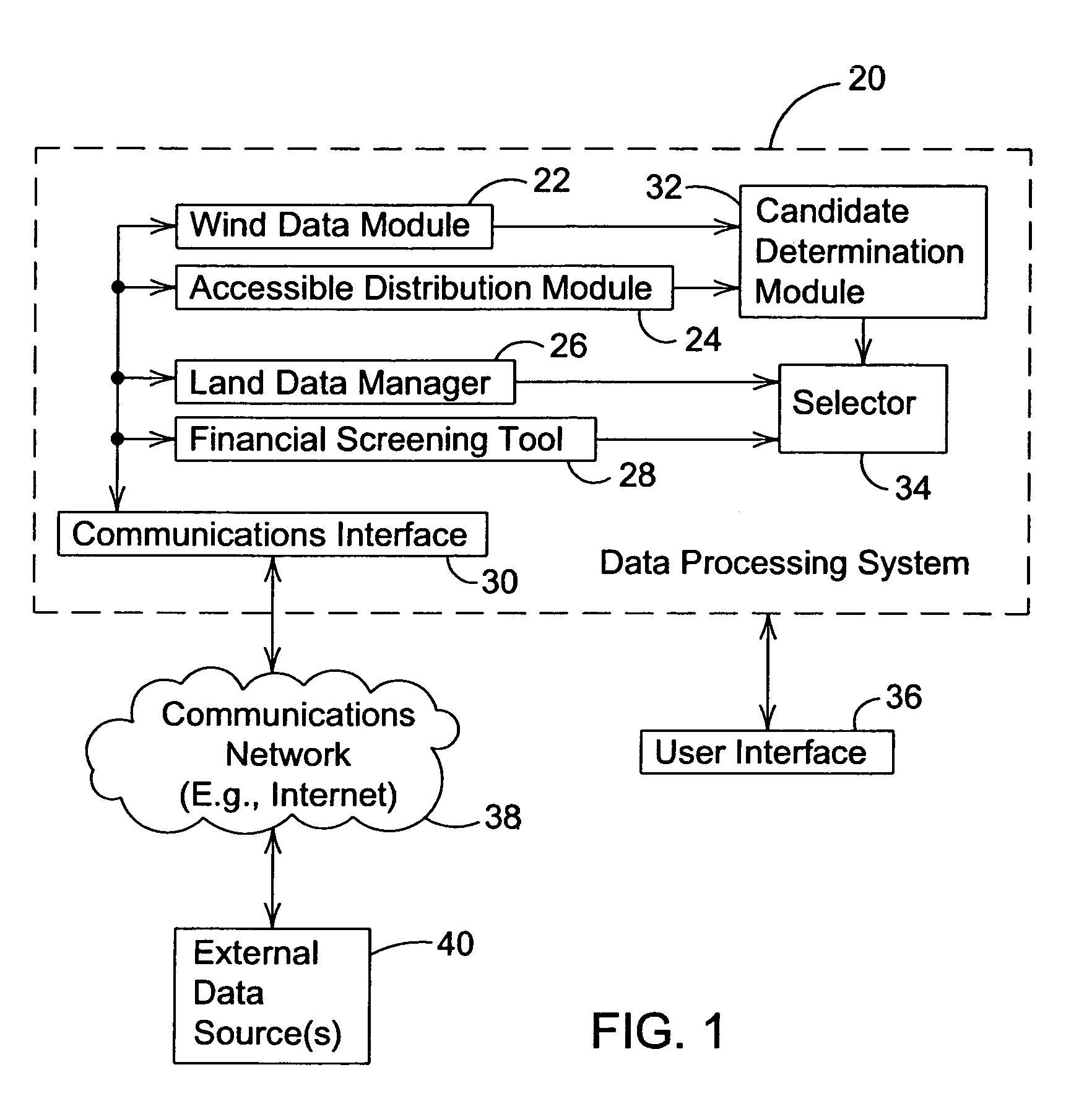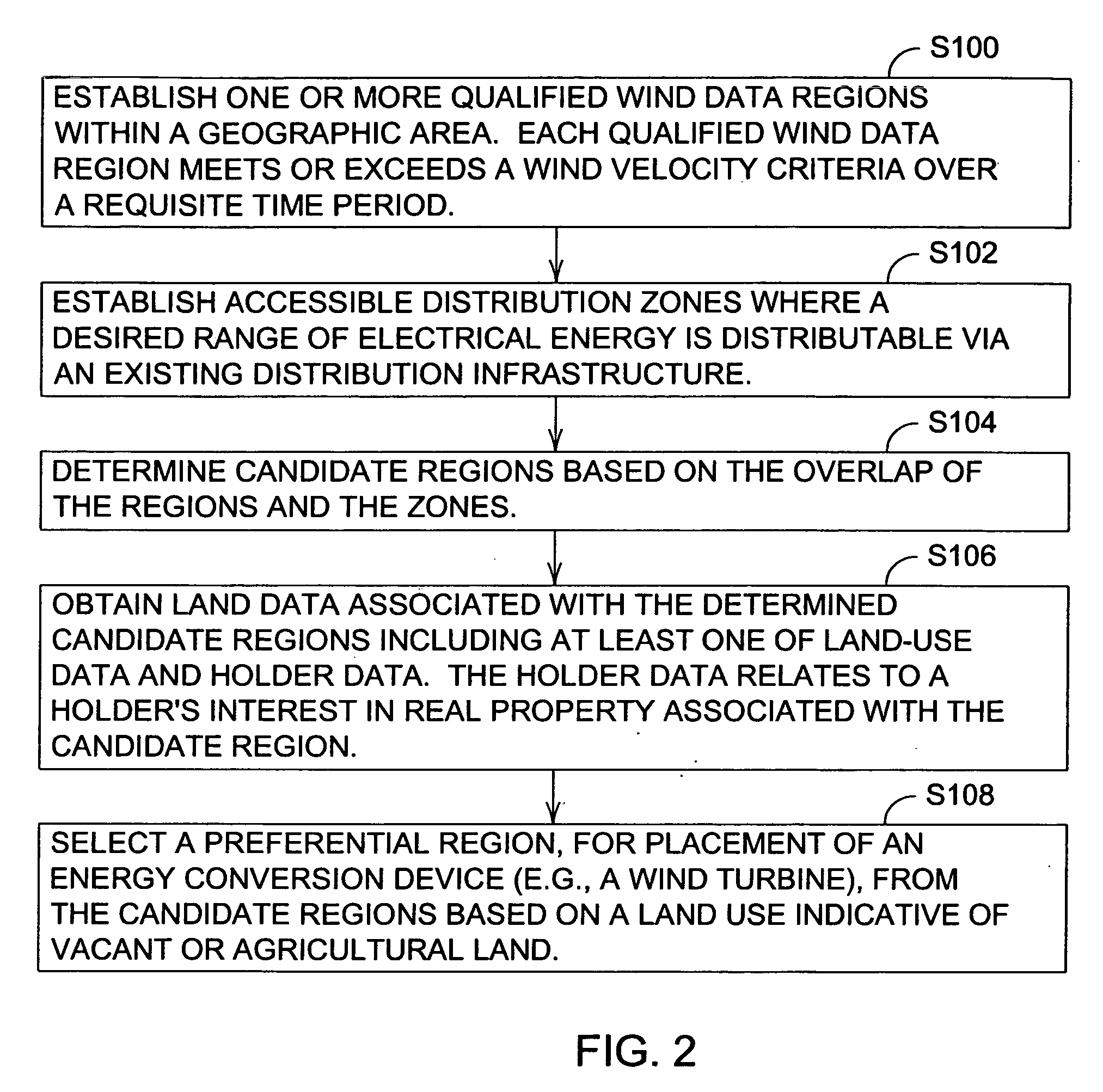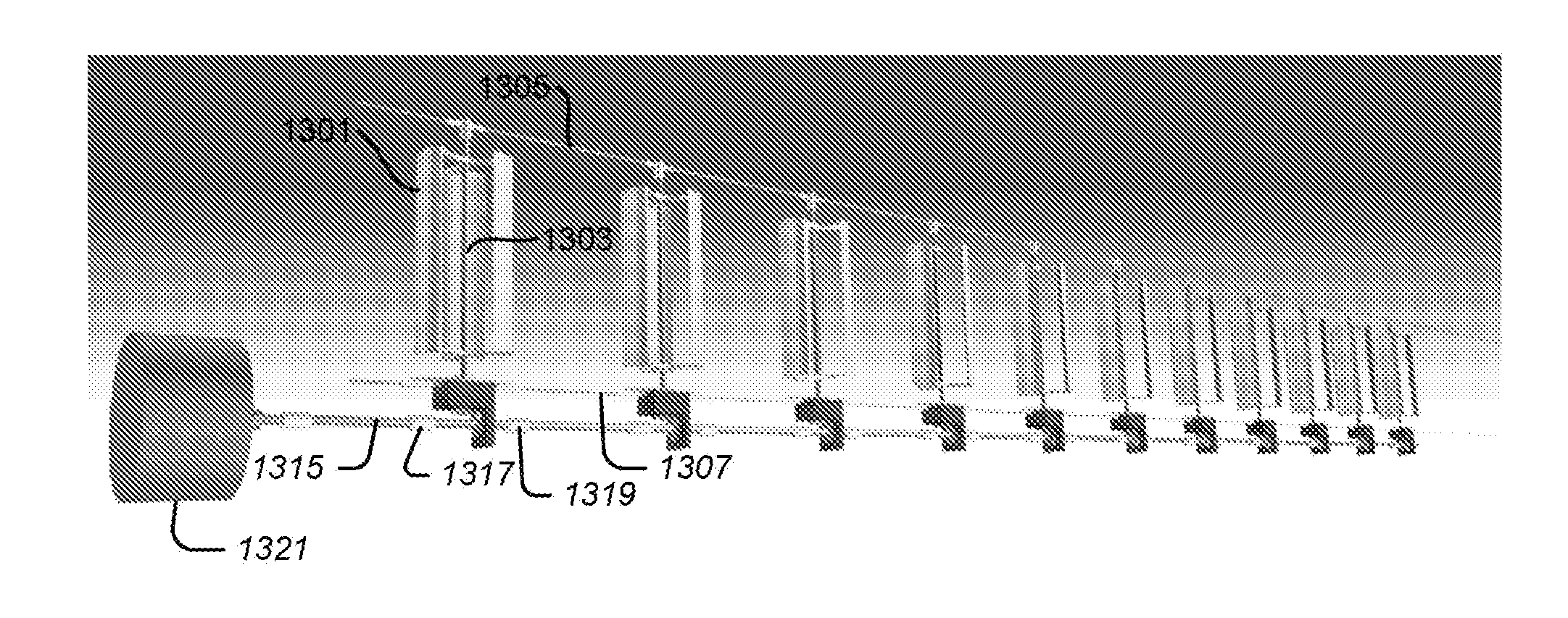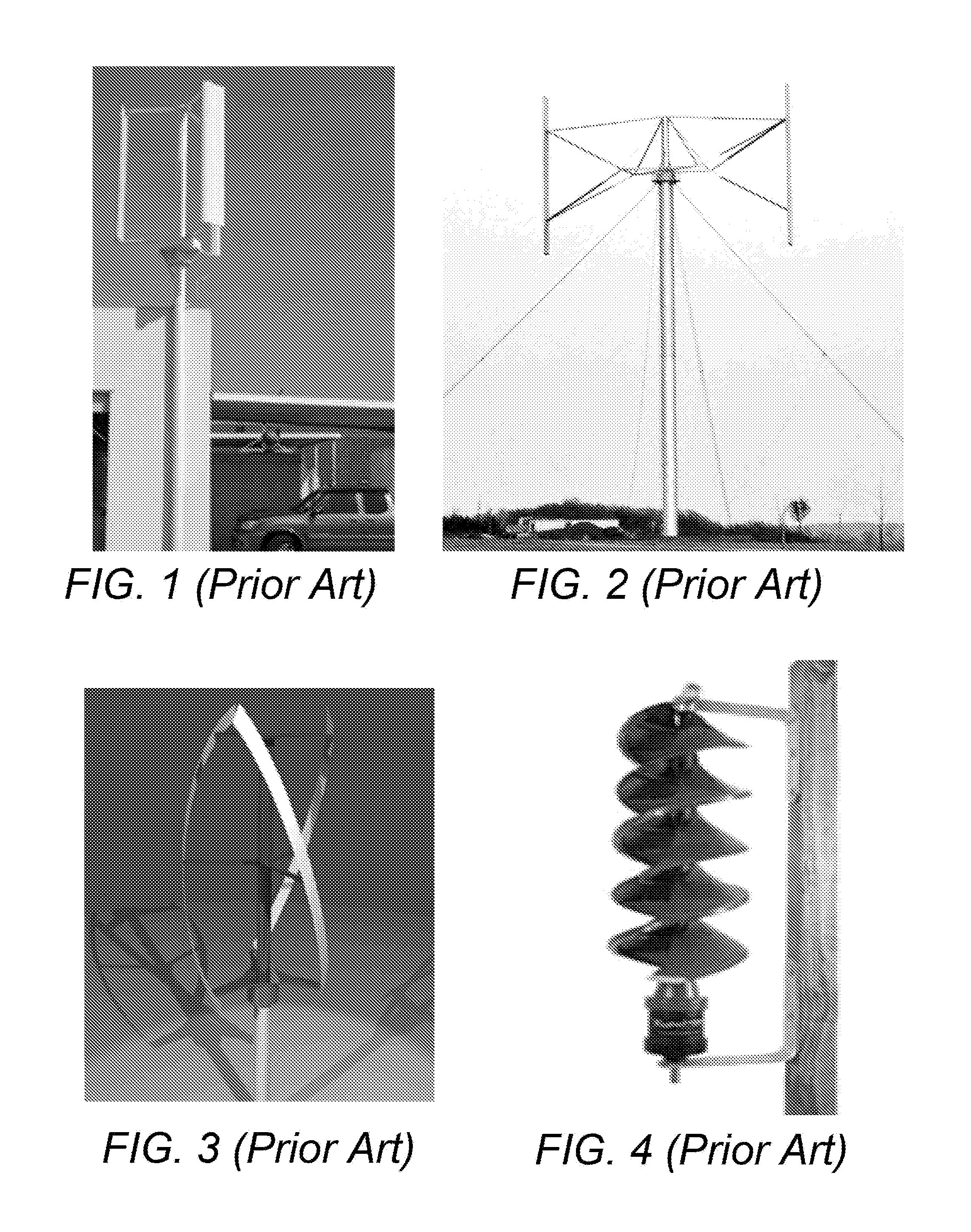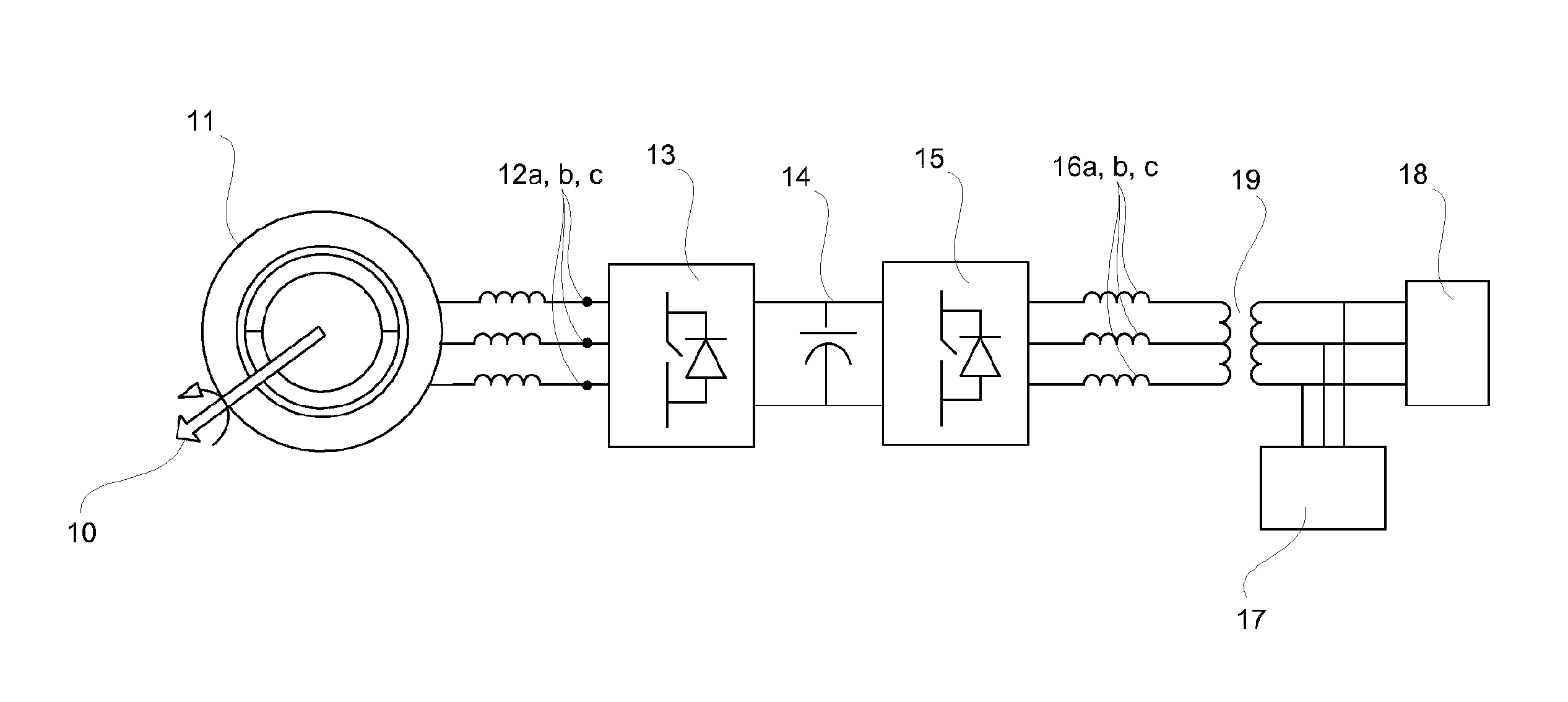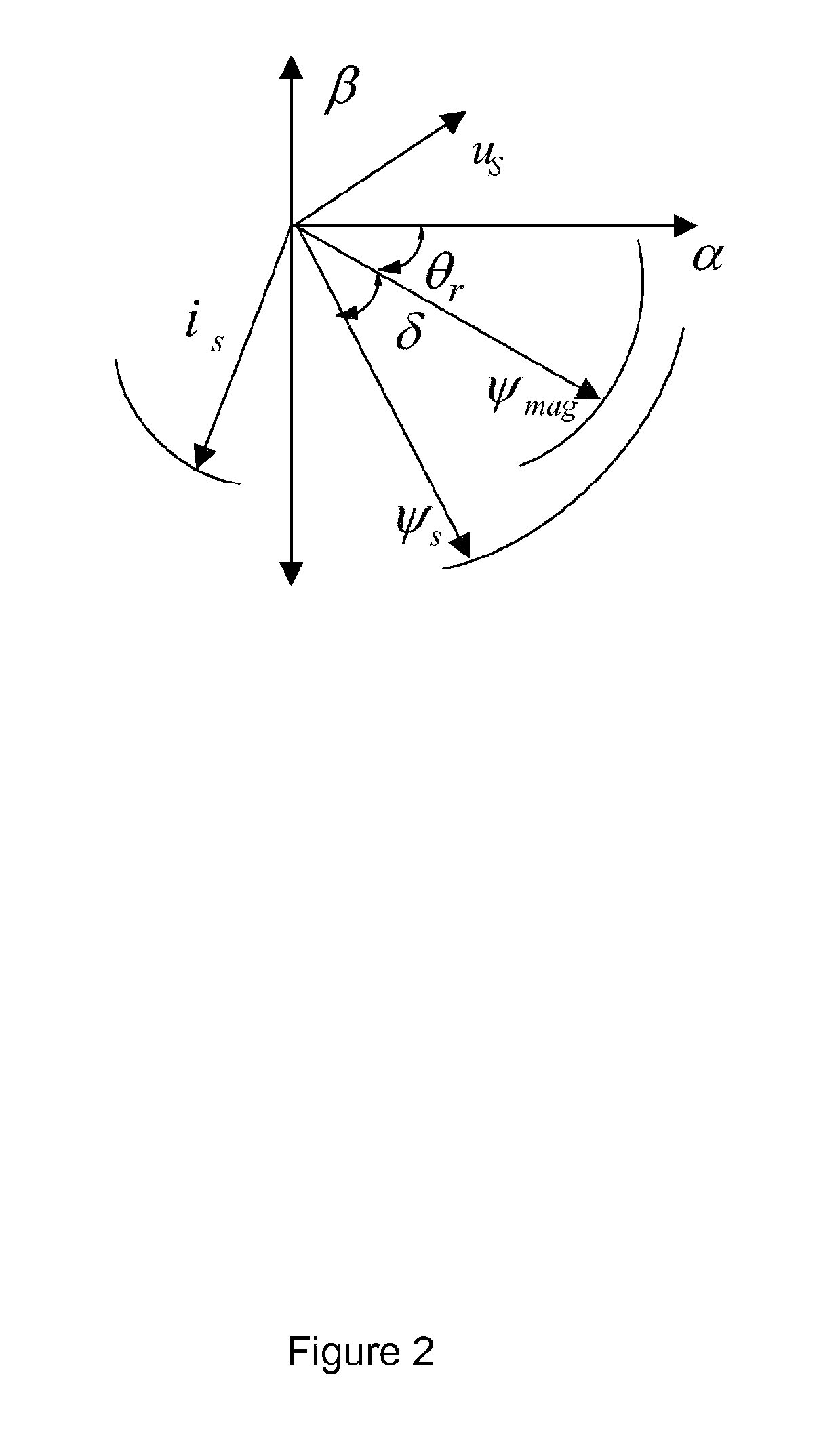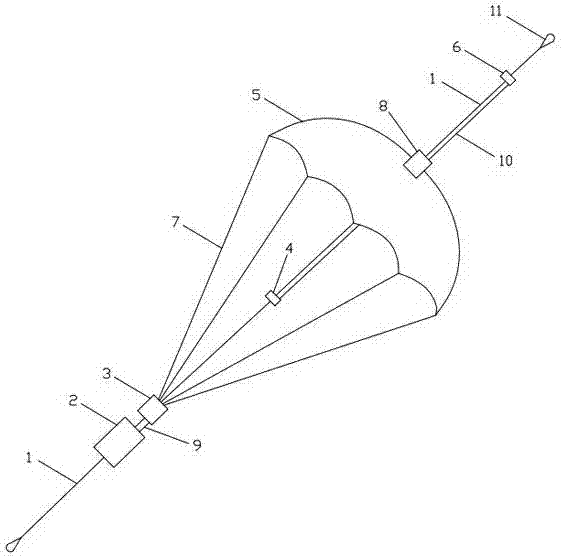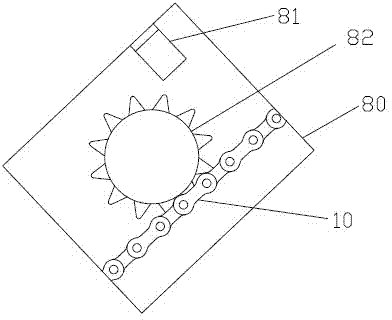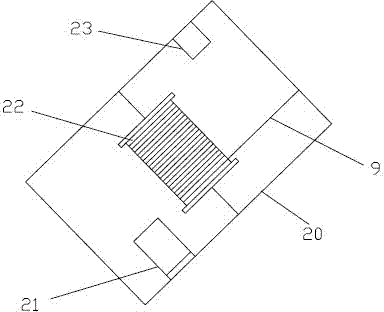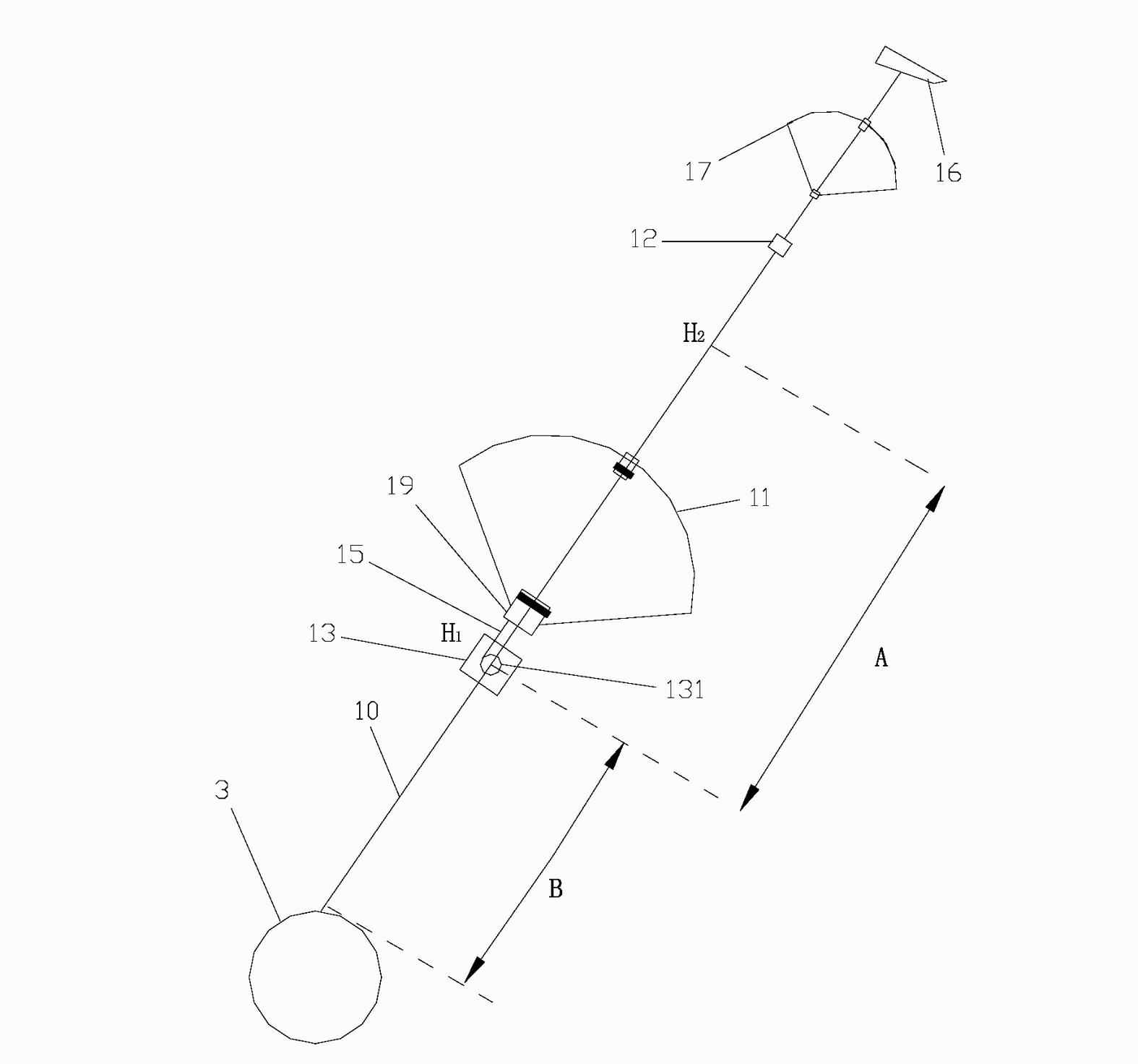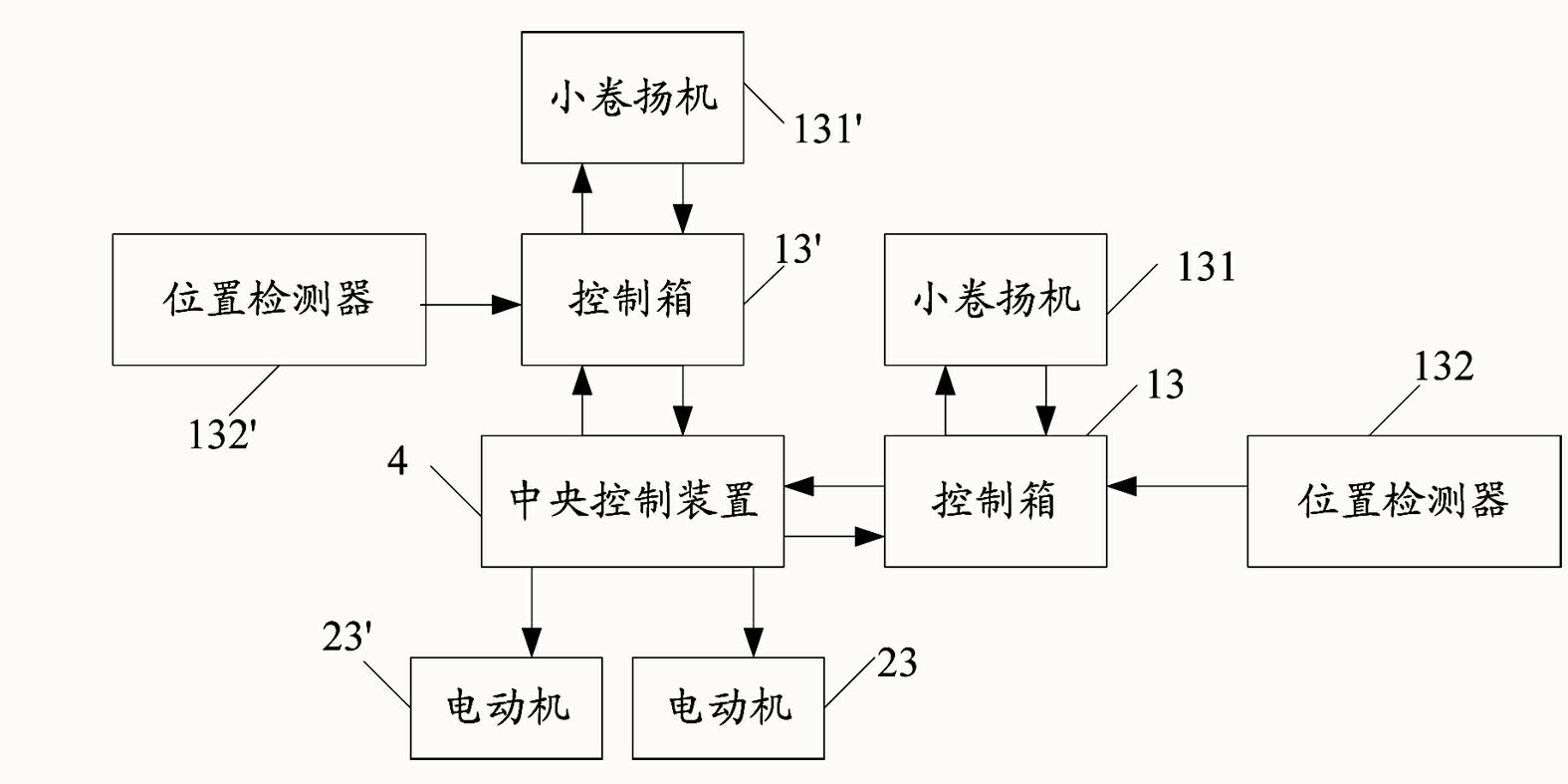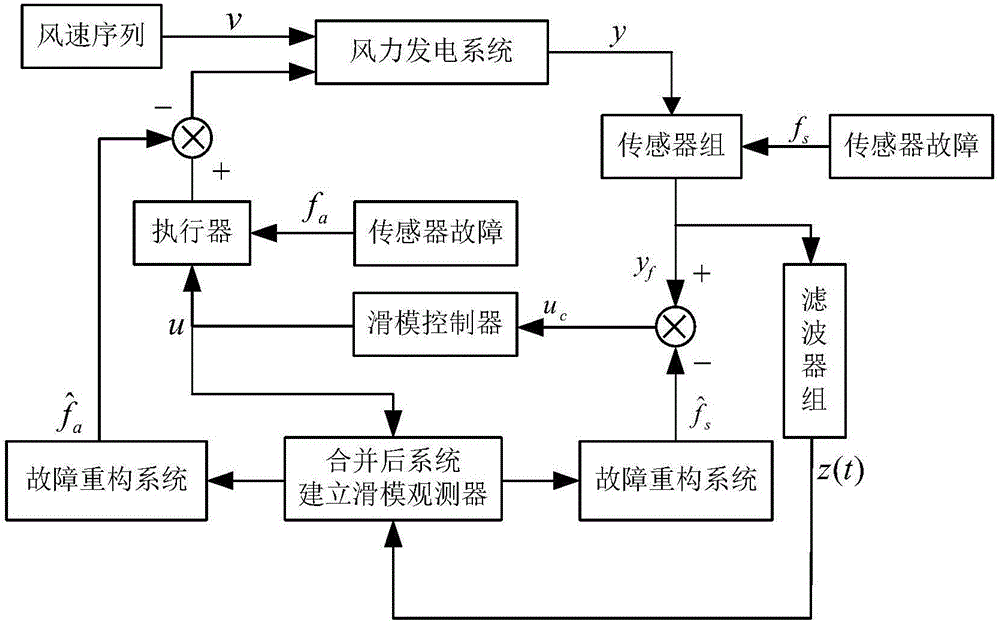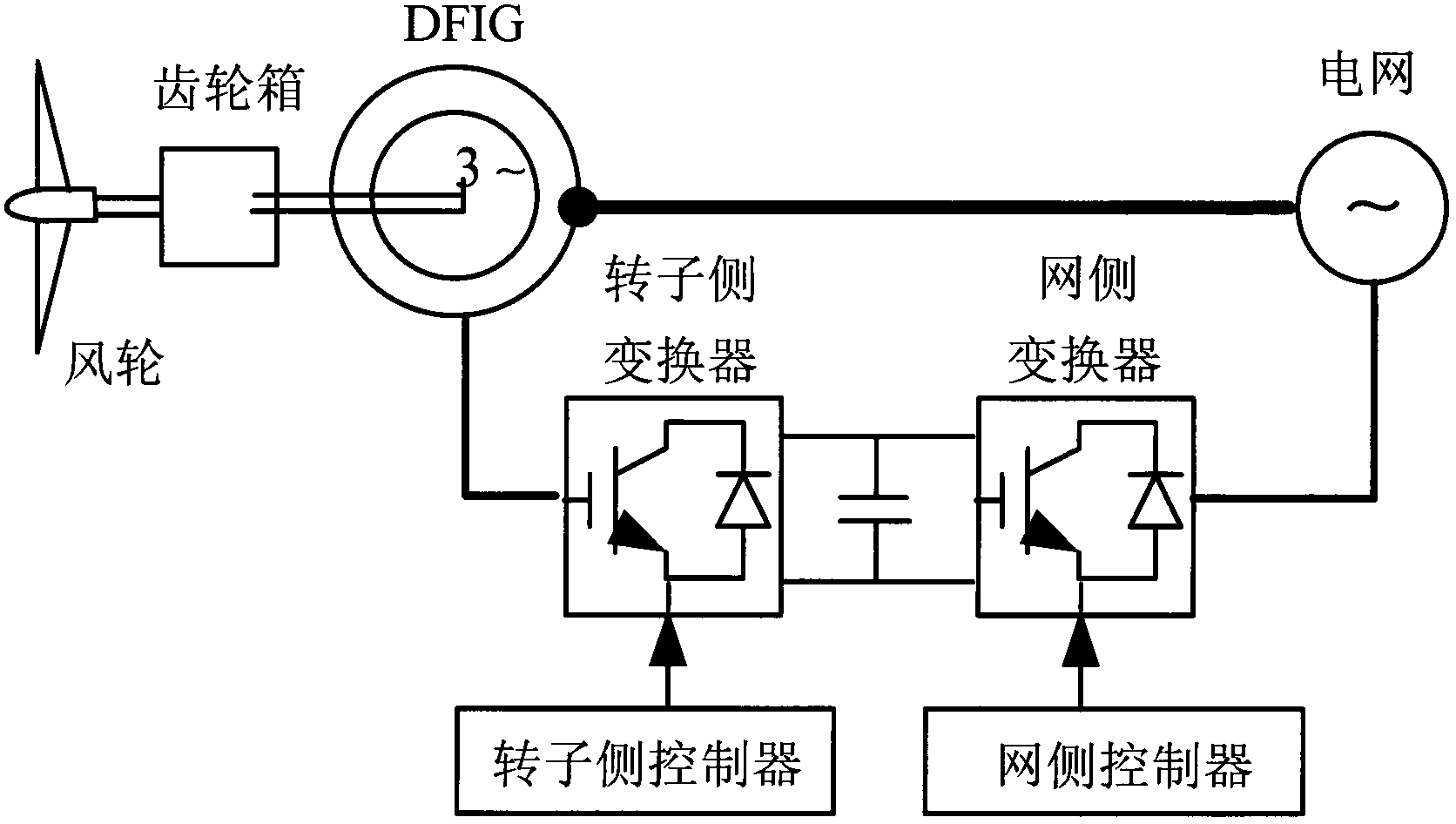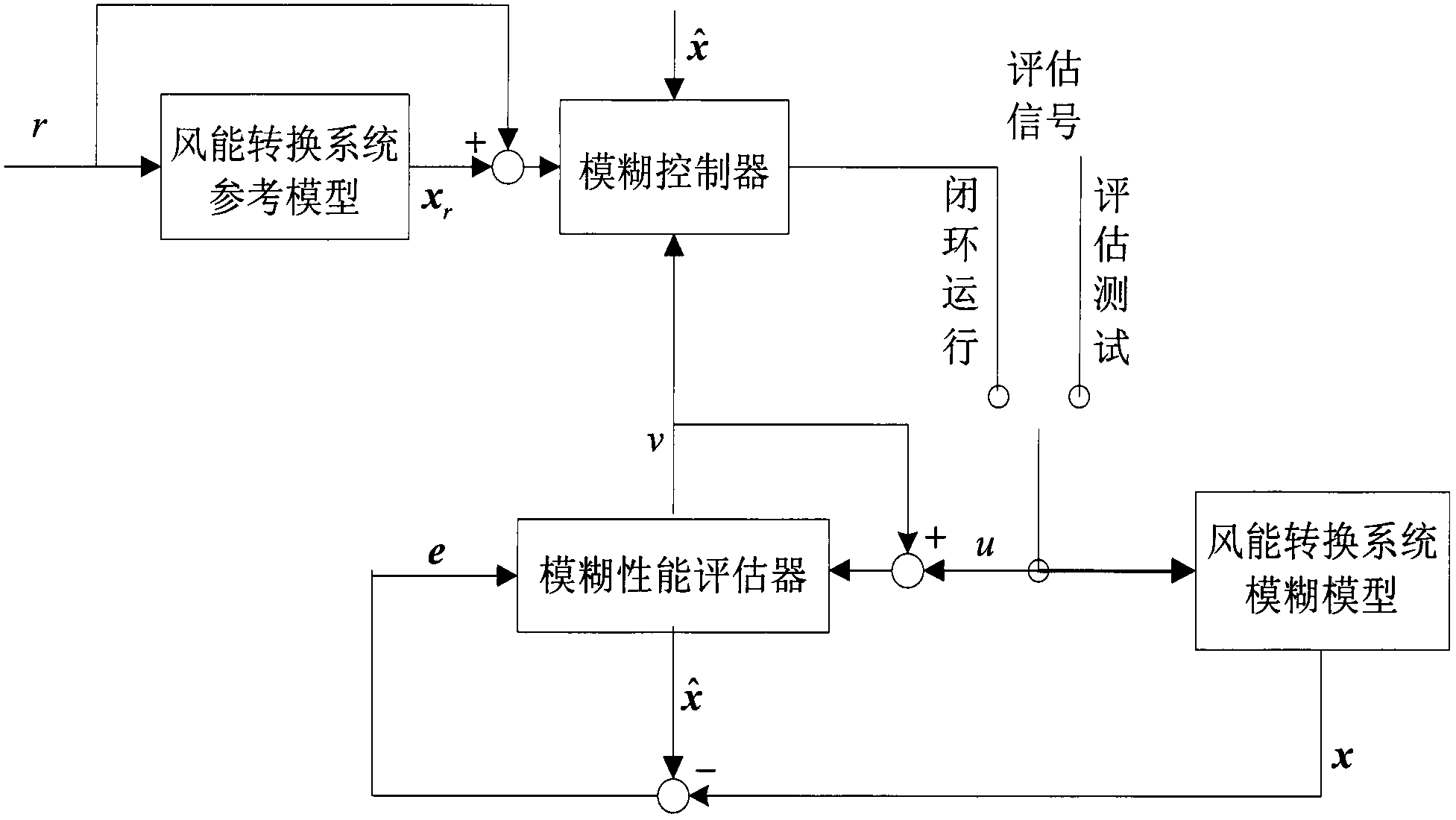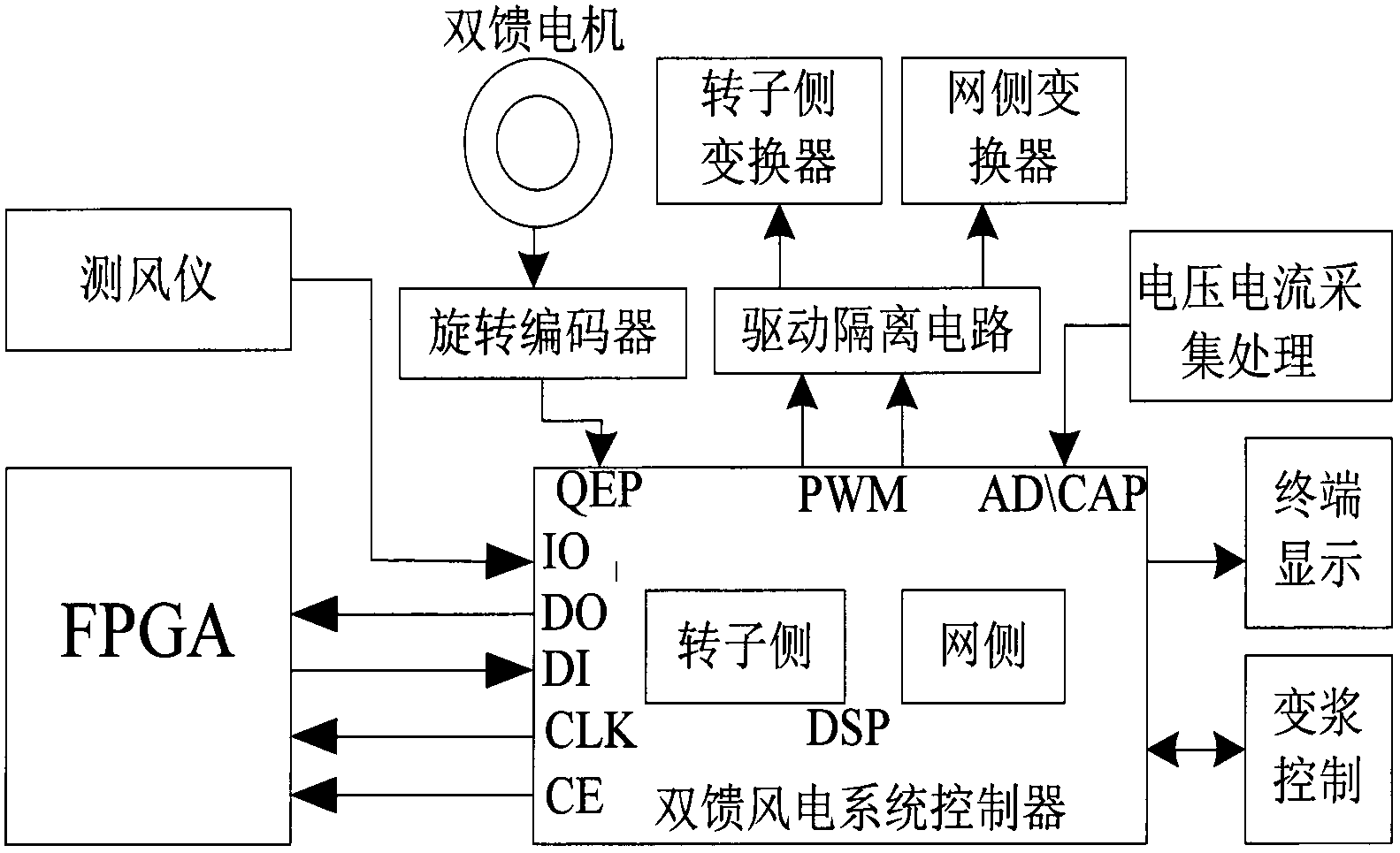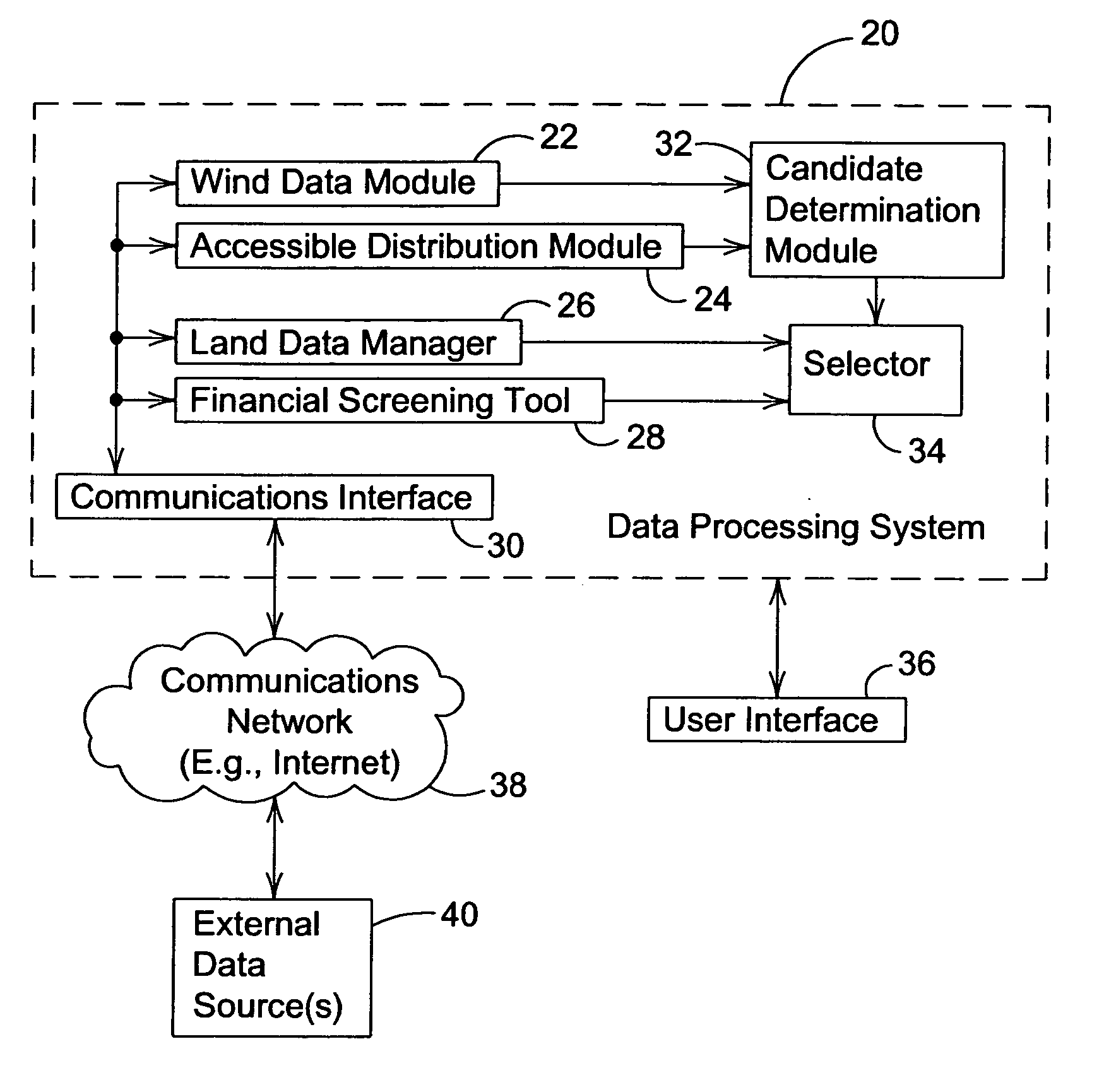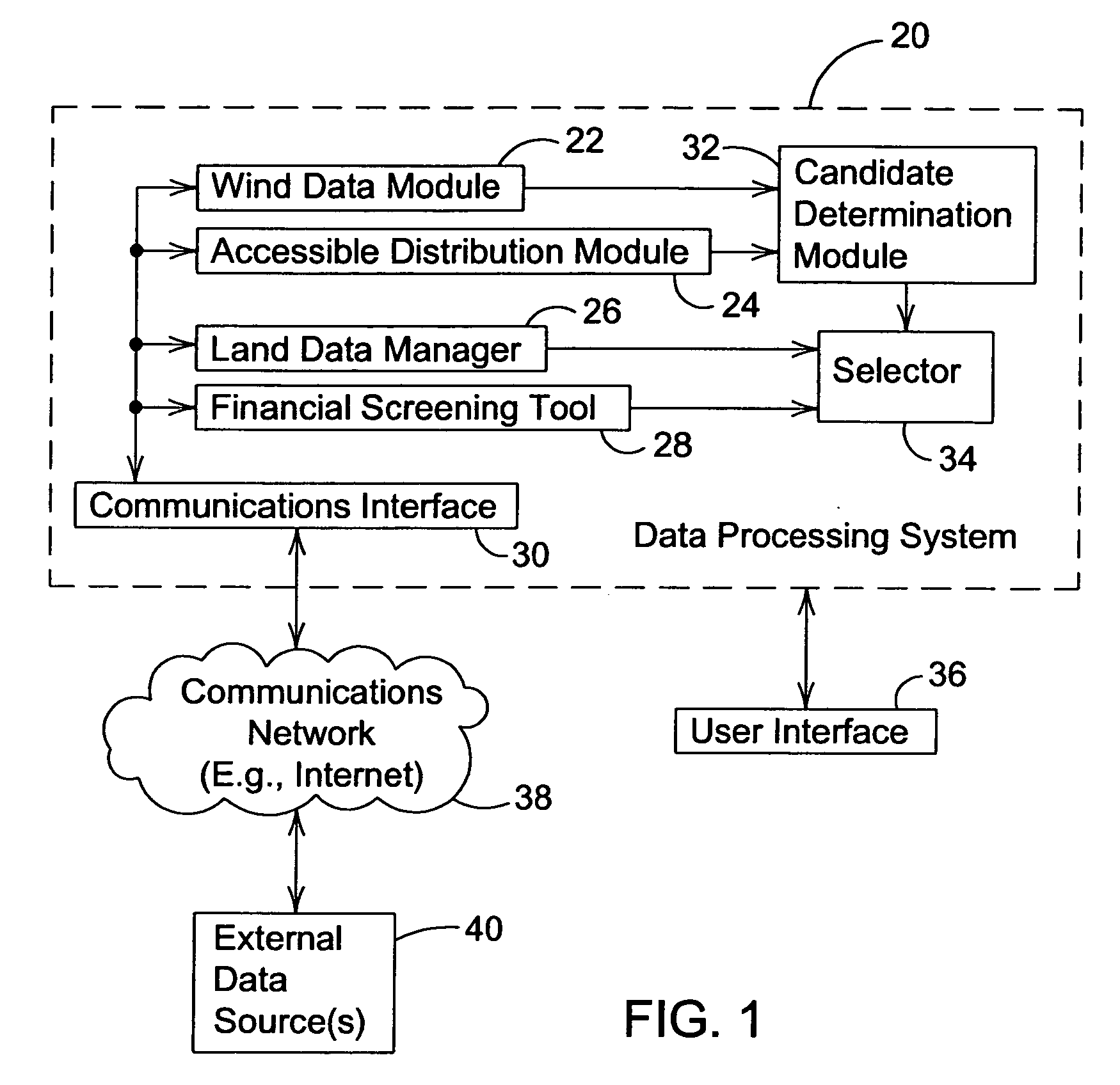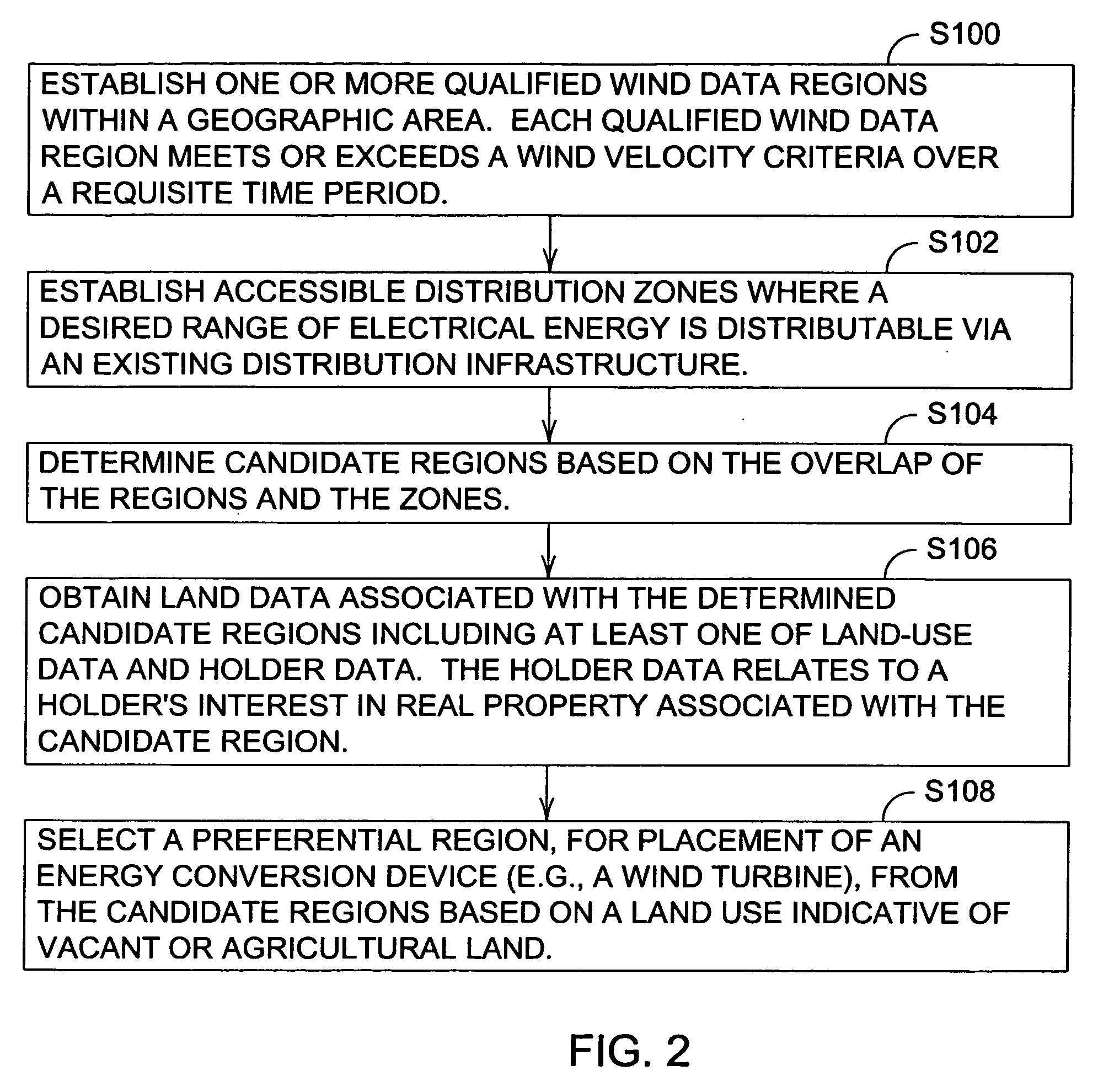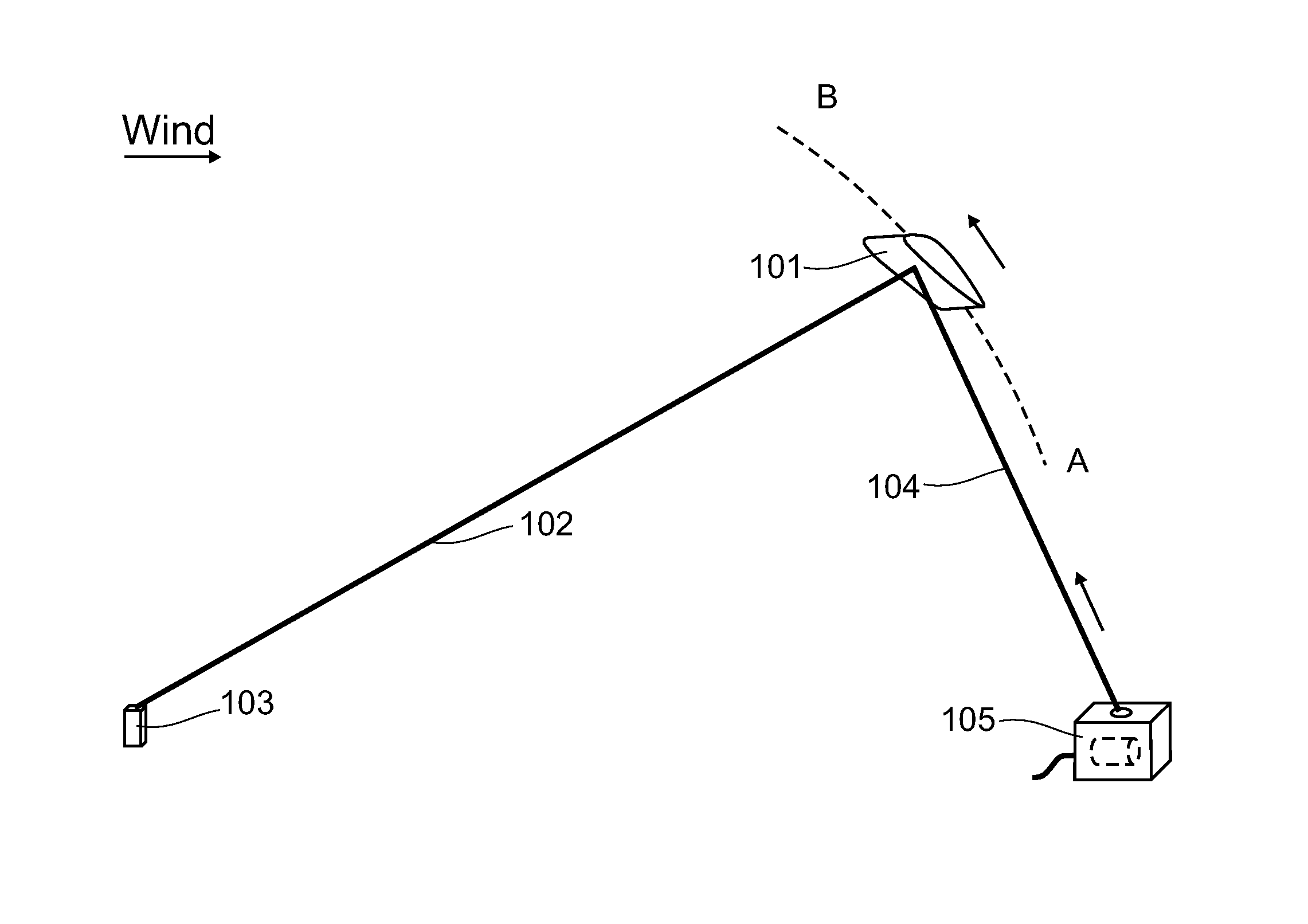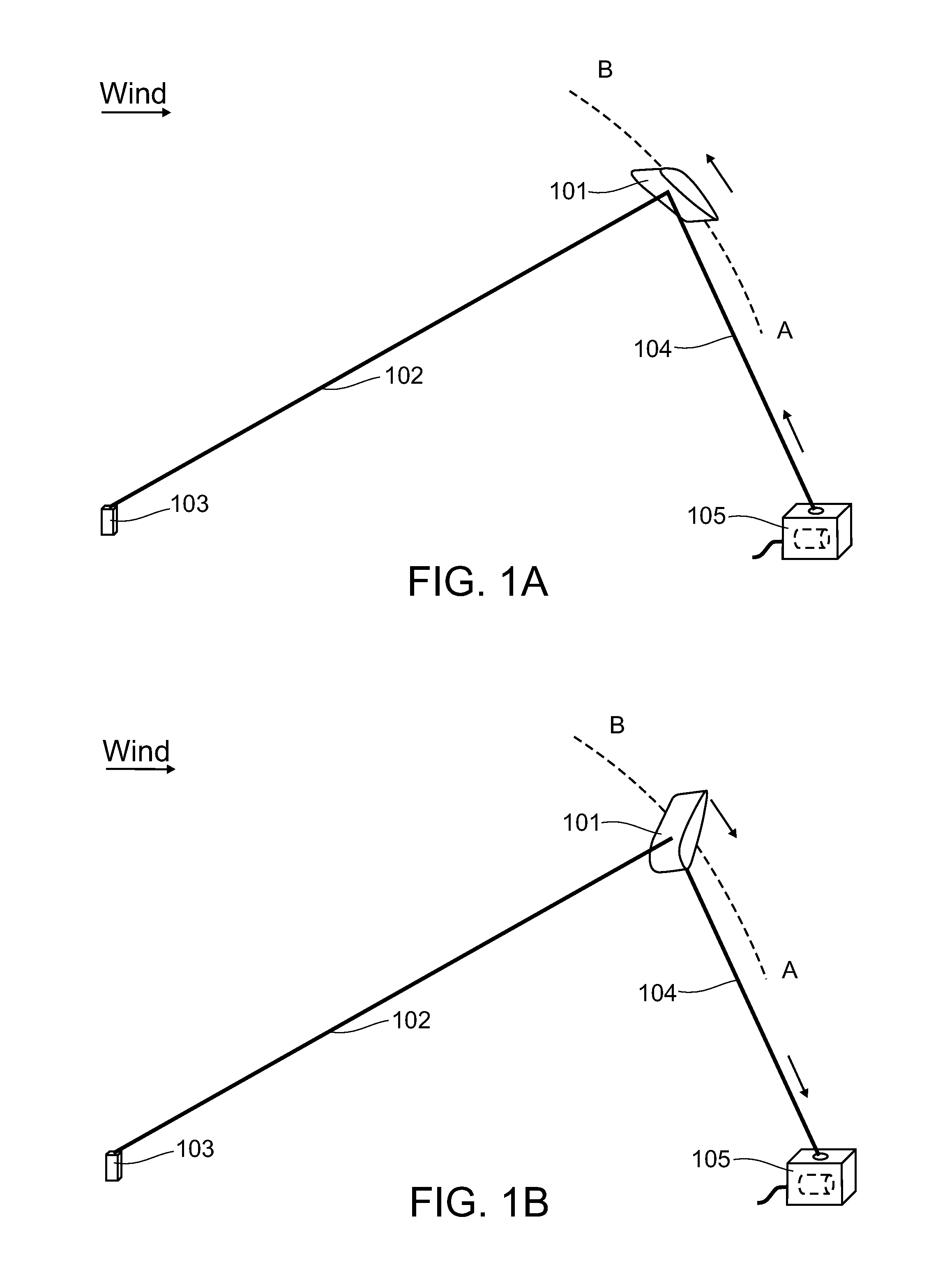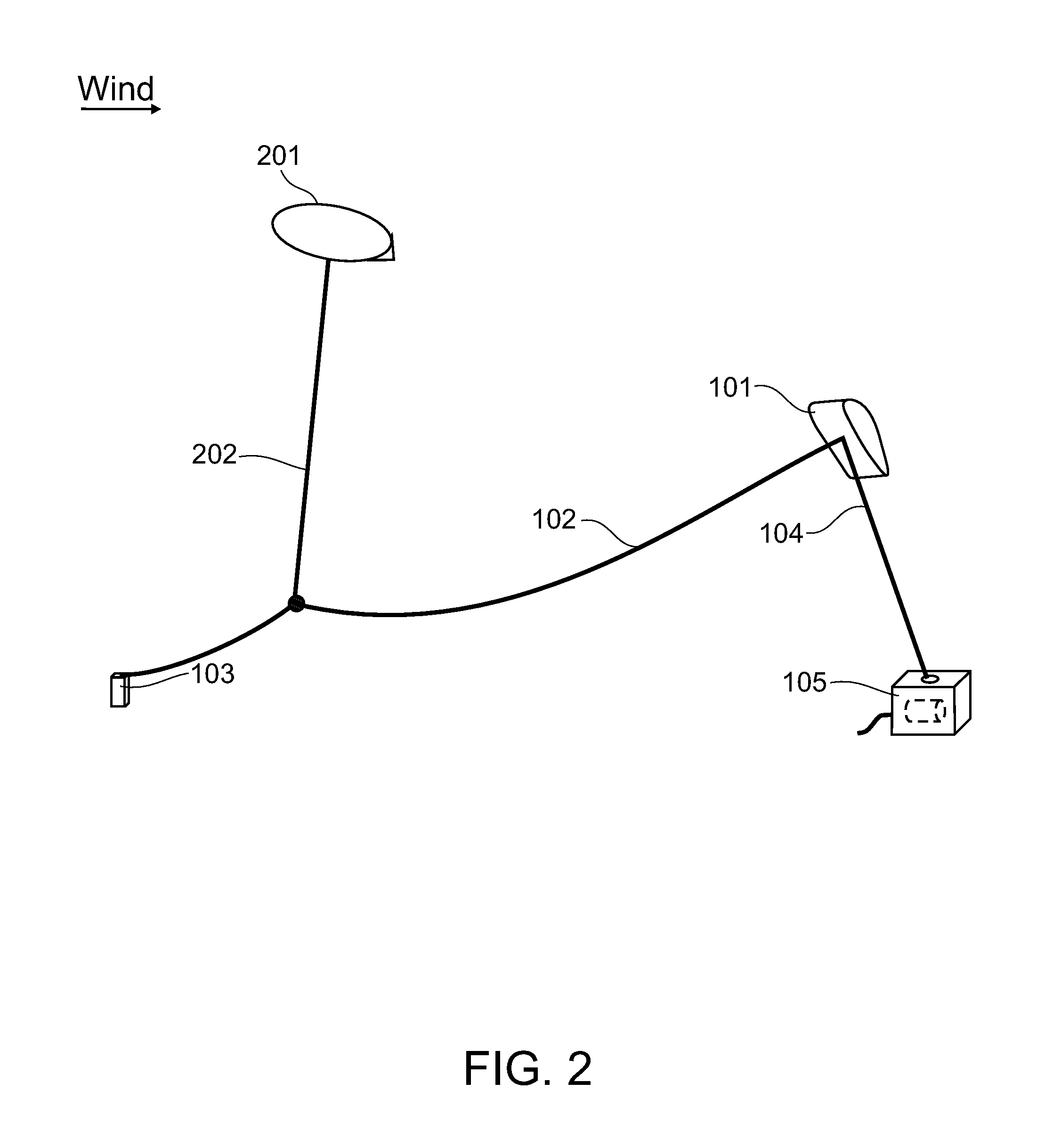Patents
Literature
Hiro is an intelligent assistant for R&D personnel, combined with Patent DNA, to facilitate innovative research.
501 results about "Wind energy conversion" patented technology
Efficacy Topic
Property
Owner
Technical Advancement
Application Domain
Technology Topic
Technology Field Word
Patent Country/Region
Patent Type
Patent Status
Application Year
Inventor
Offshore wind turbine with multiple wind rotors and floating system
ActiveUS7075189B2Reduce weightLean structureGeneral water supply conservationWind motor supports/mountsElectric power transmissionEngineering
A wind energy conversion system optimized for offshore application. Each wind turbine includes a semi-submersible hull with ballast weight that is moveable to increase the system's stability. Each wind turbine has an array of rotors distributed on a tower to distribute weight and loads and to improve power production performance where windshear is high. As much of the equipment associated with each rotor as possible is located at the base of the tower to lower the metacentric height. The equipment that may be emplaced at the bottom of the tower could include a power electronic converter, a DC to AC converter, or the entire generator with a mechanical linkage transmitting power from each rotor to the base of the tower. Rather than transmitting electrical power back to shore, it is contemplated to create energy intensive hydrogen-based products at the base of the wind turbine. Alternatively, there could be a central factory ship that utilizes the power produced by a plurality of wind turbines to create a hydrogen-based fuel. The hydrogen based fuel is transported to land and sold into existing markets as a value-added “green” product.
Owner:OCEAN WIND ENERGY SYST
Wind energy conversion system
InactiveUS6952058B2Reduced weight and mass and costAdjustable sizePropellersWind motor supports/mountsWind energy conversionEngineering
A wind energy conversion system includes upper and lower wind turbines having counter-rotating blade assemblies supported for rotation about a vertical rotation axis, with each blade assembly carrying a rotor for rotation past a stator to produce an electrical output. The wind turbines are supported by a tower at an elevated position above the ground. Each wind turbine produces torque, and the wind energy conversion system provides for balancing the torques to avoid a net torque on the tower. Adjustment mechanisms are provided for adjusting blade pitch and for adjusting the size of an air gap between a stator and a rotor that comes into alignment with the stator as the rotor rotates therepast. The wind energy conversion system provides a hood for supplying intake air to a wind turbine and an exhaust plenum for exhausting air from the wind turbine, with the hood and the exhaust plenum being directionally positionable.
Owner:WECS
Protective wind energy conversion chamber
ActiveUS7215037B2Improve efficiencyWind motor combinationsMachines/enginesHorizontal axisVertical axis wind turbine
A protective wind energy conversion chamber provides a protected multiple turbine mechanism axially aligned to convert kinetic energy of a moving fluid (e.g., wind) into rotational mechanical power by the reaction of the moving fluid with the turbine. The conversion chamber may either be configured as a vertical axis wind turbine (VAWT) or horizontal axis wind turbine (HAWT). The conversion chamber repositions an intake windward to collect and concentrate the wind prior to converting the wind into energy via the axially aligned multi-turbine mechanism. The remaining wind is released via a leeward-facing exhaust. Completely enclosed by the protective wind energy conversion chamber, the axially aligned multi-turbine mechanism avoids interference by birds and other outside objects.
Owner:SCALZI SAVERIO
Wind energy conversion system
InactiveUS20050082839A1Improve efficiencyLow costPropellersWind motor supports/mountsWind energy conversionTower
A wind energy conversion system includes upper and lower wind turbines having counter-rotating blade assemblies supported for rotation about a vertical rotation axis, with each blade assembly carrying a rotor for rotation past a stator to produce an electrical output. The wind turbines are supported by a tower at an elevated position above the ground. Each wind turbine produces torque, and the wind energy conversion system provides for balancing the torques to avoid a net torque on the tower. Adjustment mechanisms are provided for adjusting blade pitch and for adjusting the size of an air gap between a stator and a rotor that comes into alignment with the stator as the rotor rotates therepast. The wind energy conversion system provides a hood for supplying intake air to a wind turbine and an exhaust plenum for exhausting air from the wind turbine, with the hood and the exhaust plenum being directionally positionable.
Owner:WECS
Anti-icing system for wind turbines
InactiveUS20050242233A1Lower Level RequirementsAvoid and reduce accretionPump componentsEngine fuctionsNacelleEngineering
A de-icing and anti-icing arrangement for a Wind Energy Converting System (WECS), a WECS comprising a de-icing and anti-icing arrangement and a method for preventing and eliminating ice accretion on the rotor blades of a WECS are provided. The WECS comprises a tower, a rotor having a plurality of blades that rotate due to wind force, a nacelle including a first means for transforming the rotor's rotational movement to electric power, and a second means for permitting the flow of fluid from volumes defined by the rotor blades, the rotor blades comprising an external surface having openings in fluid connection with the volumes inside the blades for permitting the flow of fluid to the outside of the blades to fluid-thermodynamically interact with the wind hitting the part of the blade surface, and thereby prevent or eliminate the accretion of ice on the external surface of the blade.
Owner:BATTISTI LORENZO
Protective wind energy conversion chamber
ActiveUS20060108809A1Improve efficiencyImprove environmental safetyMachines/enginesWind motor combinationsHorizontal axisVertical axis wind turbine
A protective wind energy conversion chamber provides a protected multiple turbine mechanism axially aligned to convert kinetic energy of a moving fluid (e.g., wind) into rotational mechanical power by the reaction of the moving fluid with the turbine. The conversion chamber may either be configured as a vertical axis wind turbine (VAWT) or horizontal axis wind turbine (HAWT). The conversion chamber repositions an intake windward to collect and concentrate the wind prior to converting the wind into energy via the axially aligned multi-turbine mechanism. The remaining wind is released via a leeward-facing exhaust. Completely enclosed by the protective wind energy conversion chamber, the axially aligned multi-turbine mechanism avoids interference by birds and other outside objects.
Owner:SCALZI SAVERIO
Wind energy conversion device
InactiveUS7186083B2Reduce noiseImproved overspeed protectionPropellersPump componentsPropellerWind energy conversion
A wind energy conversion device includes a propeller in which each of the propeller blades includes a proximal (radially inward) non-airfoil mounting section, a medial section and a distal tip section mounted to pivot relative to the medial section about a pitch axis running lengthwise of the blade. At low wind speeds, each tip section and its associated medial section cooperate to provide a single airfoil. When the propeller rpm exceeds a predetermined threshold, each of the tip sections begins to pivot toward a full governing position, which tends to reduce the propeller rpm. To permit wind tracking, the device is mounted to pivot on a vertical axis. The propeller blades are downwind of the vertical axis, and slightly inclined to define a cone diverging in the downwind direction. The electrical power generating components are located upwind of the propeller and centered about the propeller axis, and have a radius less than the length of the proximal blade sections. Forming the airfoil component of the blade in several sections (medial section, tip section and further sections as desired) facilitates fabrication by injection molding.
Owner:EJB LLC
Lighter than air wind and solar energy conversion system
InactiveUS20120235410A1Minimum amount of timePV power plantsDigital data processing detailsEngineeringWind energy conversion
An integrated solar and wind energy conversion system that is carried aloft by an aerostat / balloon, which is filled with lighter-than-air gas or hot air comprises solar panel array and wind turbine array to convert solar radiation and wind power into usable and renewable energy for on and / or off-grid application or storage. The solar panel array includes at least one of the flexible solar panel and spray on solar composite or combinations thereof. The present invention requires minimal land mass, can be deployed in remote areas, it can be deployed as permanent, semi-permanent, or temporary configurations. The present invention uses computers to automate many of the systems function for maximum energy harvesting. The present invention can be used both day and night.
Owner:SERRANO RICHARD J
Airborne wind energy conversion system with fast motion transfer
InactiveUS20130134261A1Raise the ratioWing areaMachines/enginesWind motor combinationsEngineeringWind energy conversion
Airborne wind energy conversion system a with flying wing, using a cable or belt to transmit motion to a rotor of a ground based electrical generator with high velocity, achieving high aerodynamic efficiency of the wings and high power for a given torque.
Owner:GOLDSTEIN LEONID
Wind Energy Conversion Apparatus
InactiveUS20110042959A1Relieve pressureReduce equipment stressWind energy with garvitational potential energyEnergy industryPower gridWind energy conversion
An apparatus and method to efficiently convert erratic wind energy to a source of reliable standard AC electrical power by means of a complex tower-mounted windmill operatively engaged to power a pump. The pump in a sealed communication with a chamber evacuates air from the chamber to store the wind-generated energy as potential energy in the form of a pressure differential with ambient atmosphere. Regulated air inflow into the evacuated chamber is employed to drive a generator to produce electric power which is synchronized with the grid on demand.
Owner:KELLY SAMUEL THOMAS
Laminar flow, suction driven, wind energy conversion
InactiveUS20050017514A1Reduce vibrationIncrease speedWorking fluid for enginesMachines/enginesVacuum pressureTurbine blade
A laminar flow, suction driven, wind energy conversion device is disclosed for extracting usable energy from wind. The device includes multiple vacuum generators that react with the wind flow to generate usable vacuum. The device avoids the use of potentially hazardous, high speed and exposed rotor or turbine blades of popular wind energy conversion devices and may therefore be safely located within human and animal habitats. The device incorporates many useful and novel features including a pneumatic transmission that the vacuum generators use to drive turbines to produce usable energy from wind energy, a framework that integrates components of the invention into a single structure, a method to cause the framework and components to self-orient into the oncoming wind, valves to manage the non-uniform distribution of vacuum pressures within the device that are caused by turbulent wind flow, and secondary airflow accelerators that serve to maintain an acceptably laminar flow of wind through the venturi-like openings within the device.
Owner:TOCHER ANGUS J
Wind To Electric Energy Conversion With Hydraulic Storage
InactiveUS20110109094A1Energy efficiencyEasy to useEngine fuctionsAccumulator installationsStored energyWind energy conversion
A system for reversible storage of energy, the system comprising: means for generating energy; first conversion means for converting the energy into stored energy by means of low ratio (3.2:1 or less) high pressure (200 bar minimum) compression of gas; and second conversion means for converting the stored energy by expansion or reversal of the first process into usable energy.
Owner:KENWAY DANIEL +1
Wind and solar hybrid energy storage and power generation integration system and process
ActiveCN102062052ATo achieve complementary useImprove working abilitySolidificationLiquefactionThermal energyCollector device
The invention discloses a wind and solar hybrid energy storage and power generation integration system and process. The system comprises a wind power generation subsystem, a solar energy storage subsystem, a liquefied air subsystem and a power subsystem. The process comprises the following steps: solar energy is gathered by a thermal collector to obtain heat energy, the heat energy is stored in heat storge medium; wind energy is converted to electric energy, the wind power is used to liquefy air and stored in the liquefied air; and when electricity is required, the liquefied air is pressurized to recycle cold energy for the air liquefying process, then the air is heated by the high temperature heat storge medium which stores solar energy to obtain high temperature and high pressure air, and finally the air is sent to a multistage reheating turbine to expand and do work. The system of the invention recycles the cold energy of the liquefied air to reduce the wasted work for air liquefying; a pump is used to increase the pressure of the working medium, thus reducing the wasted work for compressing the working medium; the turbine utilizes recycled heat for exhaustm, thus effectively utilizing heat energy; solar energy is utilized to heat the working medium at the inlet of the turbine, thus increasing the expansion efficiency of the turbine; and wind energy and solar energy can be utilized for complementation, energy storage and power generation can be integrated and the system of the invention has wide application prospect.
Owner:葛洲坝中科储能技术有限公司
High-power umbrella-type wind power generation system
The invention discloses a high-power umbrella-type wind power generation system, which comprises a track rope, a lift force guiding body, an umbrella stair and a generating set, wherein one end of the track rope passes through the umbrella stair to tie the lift force guiding body, and the other end thereof is fastened to a heavy; the lift force guiding body straightens the track rope to form an umbrella track; the lift force guiding body and an umbrella keep distance; the umbrella stair is formed by one or more than one umbrellas; the adjacent umbrellas keep distance; the center of each umbrella is provided with a hole for the track rope to pass through; when the umbrella is expanded, a large upward tensile force can be formed due to the function of a wind force. The umbrella is divided into a bearing umbrella and an acting umbrella according to functions, wherein the bearing umbrella is fastened to the track rope for balancing the system; the acting umbrella makes movement up and down for acting; the acting umbrella is connected with an acting rope; one end of the acting rope is fastened and connected with the acting umbrella, and the other end thereof is connected with the generating set, and thus, the generating set is pulled to make mechanical movement, and thereby, the wind energy is converted into electric energy.
Owner:GUANGDONG HIGH ALTITUDE WIND POWER TECH
Grid fault ride-through for current source converter-based wind energy conversion systems
Owner:ROCKWELL AUTOMATION TECH
Constant frequency and locked phase generator adaptable to variable torque
InactiveUS20100013343A1Simple structureImprove system efficiencyWindingsMagnetic circuitElectricityConstant frequency
This invention relates to a bearingless constant frequency phase locked generator adaptable of variable torque. With a reasonable combination of rotor poles and stator poles configured with U type permanent magnets and windings respectively, this novel generator can, with no need for acceleration of gearbox and sequential electrical controls, produce constant frequency constant voltage output, and is capable of auto phase (of the grid, for example) tracing and / or locking through the electrical control of the turn on / off of individual stator windings. Further a bearingless design is adopted and initiative suppression of axis vibration can be achieved. This generator has a relative simple structure, lower cost and high wind energy conversion, and is adaptable for a wide range of wind speed. This generator can be connected to grid directly and is suitable for wind power generation and other applications.
Owner:BEIJING INST FOR FRONTIER SCI
Wind-light-storage island-type combined cooling, heating and power system based on solar light-heat utilization
InactiveCN103291557AImprove consumption structureImprove utilization efficiencySolar heat devicesMachines/enginesThermal energyThermal state
The invention provides a wind-light-storage island-type combined cooling, heating and power system based on solar light-heat utilization. The system comprises a wind energy conversion system, a solar heat collecting system, a micro compressed air energy-storage system and a heat storage system. When wind speed is high, surplus electric energy drives a multistage compressor to compress air from a level of atmospheric pressure to a higher level of pressure to be stored into a compressed air storage pipeline, and heat in the process of compressing is recovered into the heat storage system, at the moment, supplying of cold energy and heat energy is realized after pumped thermal-state heat conducting oil is shunted and enters an absorption-type refrigerating system and a heating system. When the wind speed is low, after absorbing heat from the heat storage system, compressed air enters a turbine to expand for doing work so as to fill a demand gap of electric energy, so that demands of a user on cold energy and heat energy are met through the thermal-state heat conducting oil.
Owner:XI AN JIAOTONG UNIV
Systems and Methods for Electro-hydrodynamic Wind Energy Conversion
An electro-hydrodynamic wind energy conversion system is presented. The system includes a wind passage allowing wind flow. Further, the system includes a reservoir having an opening in communication with the wind passage and configured to hold a liquid. The system also includes an agitator coupled to the reservoir and configured to convert the liquid into droplets. Additionally, the system includes a charging system disposed substantially opposite the reservoir opening and configured to deposit an electrostatic charge on the droplets and draw the droplets into the wind passage. Moreover, the system includes a charge collector disposed at a distal end of the wind passage and configured to collect the electrostatic charge from the droplets.
Owner:GENERAL ELECTRIC CO
Apparatus for generating electric power using wind energy
Owner:LIN PI HSIA
Direct power and stator flux vector control of a generator for wind energy conversion system
InactiveUS8395360B2Lower requirementDirect operationVector control systemsWind motor controlWind energy conversionVariable speed wind turbine
A method for controlling a variable speed wind turbine generator is disclosed. The generator is connected to a power converter comprising switches. The generator comprises a stator and a set of terminals connected to the stator and to the switches of the power converter. The method comprises: determining a stator flux reference value corresponding to a generator power of a desired magnitude, determining an estimated stator flux value corresponding to an actual generator power, determining a difference between the determined stator flux reference value and the estimated stator flux value, and operating said switches in correspondence to the determined stator flux reference value and the estimated stator flux value to adapt at least one stator electrical quantity to obtain said desired generator power magnitude.
Owner:VESTAS WIND SYST AS
Wind powered devices
Devices for converting wind energy into other usable forms of energy are disclosed. In one embodiment of the invention, a wind device having at least one but more preferably two vertically directed cylindrical windmills are disposed on the ends of a “V” shaped structure so that half of each windmill is exposed to contact by the wind moving along the outer surface of the “V” as the point of the “V” is aimed into the wind. In this configuration, the other half of each windmill is located within the “V” shaped structure where this half does not come into contact with the wind. As a result, the wind contacting the outside half of each windmill causes the windmill to rotate. Each rotating windmill is mechanically connected to a device to convert the rotation of the windmills into another form of energy. In a variant of this embodiment, the vanes are located a distance from the axis of rotation in order to generate more torque in light winds. In another variant of the invention, wind devices are located in locations where there is a relatively large amount of wind such as on cars, trucks, busses, trains, ships, bicycles or airplanes, near on or in tunnels or near the ends of runways so that propeller blast or jet wash from departing aircraft may be captured by the invention and converted into usable energy as described above.
Owner:KURTZ WILLIAM C
Method and system of determining a location for a wind-powered electrical energy facility
A method and system determines a location of a conversion device for converting wind energy into electrical energy by considering both technical and economic viability factors. One or more qualified wind data regions are established within a geographic area. Each qualified wind data region meets or exceeds a wind velocity criteria over a requisite time period. Distribution accessible zones are established where a desired range of electrical energy is distributable via existing distribution infrastructure. Candidate regions are determined based on the overlap of the regions and the zones. Land data is obtained and is associated with the candidate region. The land data may comprise at least one of a land use and a holder of an interest in real property associated with the candidate region. A selector selects a preferential region, for placement of a conversion device, from the candidate regions based on a land data.
Owner:EXELON WIND LLC
Generation of electric energy using cable-supported windmills
ActiveUS20110049905A1Avoid flowEngine fuctionsWind motor supports/mountsEngineeringWind energy conversion
An electric energy generation system may include a plurality of windmills, a windmill support system, an electric generator, and a coupling system. The windmills may each be configured to transform wind energy into rotational energy. The windmill support system may support the windmills in positions that are spaced apart from one another. The electric generator may be configured to transform rotational energy into electric energy. The coupling system may be configured to couple the rotational energy generated by each of the windmills to the electric generator in a manner that permits the windmills to rotate at different speeds during operation of the electric energy generation system. Other configurations are also disclosed.
Owner:UNIV OF SOUTHERN CALIFORNIA
Direct power and stator flux vector control of a generator for wind energy conversion system
InactiveUS20120268081A1Lower requirementDirect operationVector control systemsWind motor controlWind energy conversionVariable speed wind turbine
A method for controlling a variable speed wind turbine generator is disclosed. The generator is connected to a power converter comprising switches. The generator comprises a stator and a set of terminals connected to the stator and to the switches of the power converter. The method comprises: determining a stator flux reference value corresponding to a generator power of a desired magnitude, determining an estimated stator flux value corresponding to an actual generator power, determining a difference between the determined stator flux reference value and the estimated stator flux value, and operating said switches in correspondence to the determined stator flux reference value and the estimated stator flux value to adapt at least one stator electrical quantity to obtain said desired generator power magnitude.
Owner:VESTAS WIND SYST AS
Umbrella type wind energy conversion device and system
ActiveCN102330642AStable opening and closingAvoid entanglementWind motor controlWind motor combinationsLower limitWind energy conversion
The invention discloses an umbrella type wind energy conversion device and an umbrella type wind energy conversion system. The device comprises a rail rope, and a lower control box, a lower baffle block and an upper baffle block which are fixedly connected to the rail rope sequentially from top to bottom, wherein the lower control box is connected with a sliding barrel through at least one umbrella control rope; a plurality of work application umbrellas are connected between an umbrella edge and the sliding barrel; the upper control box is in engagement transmission with a chain; when the lower control box reaches an operation lower limit position relative to the ground, a first prompting signal is transmitted to make the lower control box retract the umbrella control rope, so that the work application umbrellas are unfolded under the action of wind power; and when the lower control box reaches an operation upper limit position relative to the ground, a second prompting signal is transmitted to make the lower control box release the umbrella control rope, and the upper control box moves downwards along the chain to drive the tops of the work application umbrellas to move downwardsso as to fold the work application umbrellas. By the device and the system, the work application umbrellas can be more stably unfolded and folded in the air, the phenomenon of twisting caused by redundant rope tools during unfolding and folding of the work application umbrellas can be effectively prevented, and high-power wind energy can be stably converted.
Owner:GUANGDONG HIGH ALTITUDE WIND POWER TECH
Wind energy power system with tandem bidirectional drive
ActiveCN102278276AImprove continuityImprove stabilityWind motor controlWind motor combinationsHigh-altitude wind powerWork period
The invention discloses a series bidirectional driven wind power system. The system comprises two winches, two umbrella-type wind power devices and a central control device, wherein the two winches are connected to two ends of a transmission shaft of a working device respectively; the two umbrella-type wind power devices are used for collecting wind energy at high altitude, converting the wind energy into mechanical energy and outputting the mechanical energy through working ropes respectively, and the working ropes are connected to winding drums of the two winches by winding in the same winding direction; and the central control device is connected with and controls the two umbrella-type wind power devices and the two winches, and the central control device is used for controlling the umbrella-type wind power devices to asynchronously stop in declining stages in each working period and stop outputting the mechanical energy. Compared with a single umbrella-type wind power system, the series bidirectional driven wind power system has the advantage that: continuity and stability of energy output of the high-altitude wind power system are greatly improved.
Owner:GUANGDONG HIGH ALTITUDE WIND POWER TECH
Multi-fault diagnosis and fault-tolerant control of wind turbine system
ActiveCN106014877AGuaranteed accuracyEngine fuctionsMachines/enginesActive faultWind energy conversion
The invention discloses a multi-fault diagnosis and fault-tolerant control method of a wind turbine system. The method comprises the following steps: firstly, establishing a global fuzzy model of the wind turbine system by utilizing the T-S fuzzy algorithm; converting an actuator fault into a sensor fault by utilizing the characteristic of combining the sensor hardware redundancy technology with the actuator fault, and establishing a multi-fault diagnosis logical table to realize multi-fault detection; then, introducing a filter, converting the sensor fault into the actuator fault, establishing a virtual actuator fault, and realizing simultaneous reconstitution of two faults through reconstitution of the virtual actuator fault; finally, revising input and output of a controller based on a fault reconstitution value to realize active fault-tolerant control. The method has the following advantages: diagnosis and reconstitution of the wind turbine system with concurrent actuator and sensor faults can be simultaneously realized, accurate fault information is obtained in a real-time and on-line manner, fault-tolerant control is realized, the capacity of processing unknown faults of the system is enhanced, and the wind energy conversion efficiency under the fault is improved.
Owner:国电崇礼和泰风能有限公司
Feedback control method of wind energy converting system based on fuzzy performance estimator
The invention discloses a feedback control method of a wind energy converting system based on a fuzzy performance estimator and designs a T-S fuzzy state feedback control system including the fuzzy performance estimator specifically to characteristics of strong nonlinearity and parameter uncertainty of the wind energy converting system, belonging to the feedback control field. Firstly, a nonlinear model and a T-S fuzzy model of the wind energy converting system are provided; secondly, the fuzzy performance estimator of the system is designed based on the T-S fuzzy model of the wind energy converting system; then, a linear controller is designed in each linear local model respectively; and a fuzzy state feedback controller of a global model is constituted by dint of membership function. The method provided by the invention has the advantages of a controller is designed based on the fuzzy performance estimator; the feedback control method ensures that a closed-loop control system has good tracking performance; simultaneously, preferable dynamic performance and stable-state performance can be acquired.
Owner:JIANGNAN UNIV
Method and system for determining a location of a wind-powered electrical energy facility
InactiveUS20050192779A1Mechanical power/torque controlLevel controlEngineeringWind energy conversion
A method for determining a location of a conversion device for converting wind energy into electrical energy comprises establishing a plurality of data layers, including at least a wind data layer and a transmission grid data layer. Each data layer contains attribute data that is associated with corresponding location data. The location data of one layer is aligned with the location data of other layers to form a composite layer. The composite layer is searched to identify the first compliant location data associated with a target value or a target value range of the attribute data for the wind data layer. The composite layer is searched to identify a second compliant location data associated with a target value or a target value range of the attribute data for the transmission grid data. The composite layer is searched to identify a third compliant location data associated with a target value or target value range of the attribute data for an additional data layer other than the wind data layer and the transmission grid data layer. The intersection of the first compliant location data, the second compliant location data, and the third compliant data is determined. The intersection is identified as one or more preferential regions for locating an energy conversion device.
Owner:EXELON WIND LLC
Airborne wind energy conversion system with fast motion transfer
InactiveUS9080550B2Raise the ratioIncrease speedMachines/enginesWind motor combinationsEngineeringWind energy conversion
Airborne wind energy conversion system a with flying wing, using a cable or belt to transmit motion to a rotor of a ground based electrical generator with high velocity, achieving high aerodynamic efficiency of the wings and high power for a given torque.
Owner:GOLDSTEIN LEONID
Features
- R&D
- Intellectual Property
- Life Sciences
- Materials
- Tech Scout
Why Patsnap Eureka
- Unparalleled Data Quality
- Higher Quality Content
- 60% Fewer Hallucinations
Social media
Patsnap Eureka Blog
Learn More Browse by: Latest US Patents, China's latest patents, Technical Efficacy Thesaurus, Application Domain, Technology Topic, Popular Technical Reports.
© 2025 PatSnap. All rights reserved.Legal|Privacy policy|Modern Slavery Act Transparency Statement|Sitemap|About US| Contact US: help@patsnap.com
